|
| Book of Condolences at the Embassy of the Republic of Serbia |
|
Devastating tragedy occurred yesterday in the Belgrade’s elementary school Vladislav Ribnikar when eight children and a security guard lost their lives in a tragic shooting. Our thoughts and prayers are with the victims and their families.
The Book of Condolences will be opened at the Embassy in Zagreb (Jabukovac 23) on
Friday, May 5, 2023. from 12 p.m. to 5p.m.
Saturday, May 6, 2023. from 12 p.m. to 2 p.m
Sunday, May 7, 2023. from 12 p.m. to 2 p.m.
Monday, May 8, 2023. from 12 p.m. to 5 p.m.
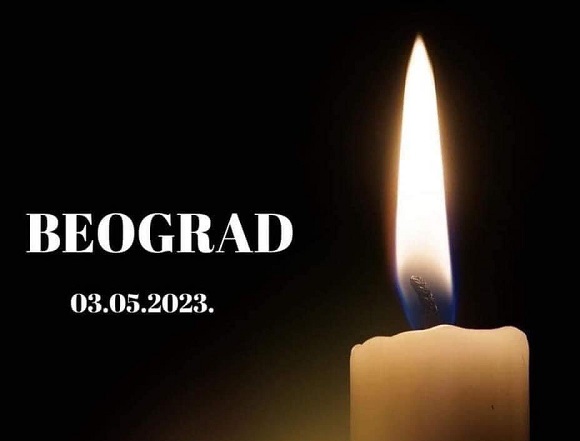 |
|
|
| Ambassador Jelena Milić presented the Letters of Credence to the President of the Republic of Croatia - 11/7/2022 |
|
H.E. Mrs. Jelena Milić, Ambassador Extraordinary and Plenipotentiary of the Republic of Serbia to the Republic of Croatia presented the Letters of Credence to the President of the Republic of Croatia, H.E. Mr. Zoran Milanović.
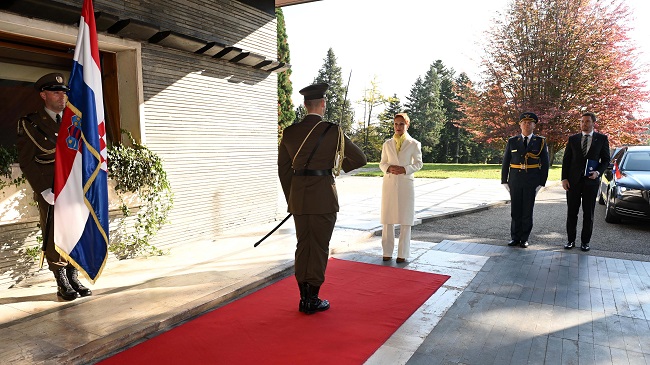
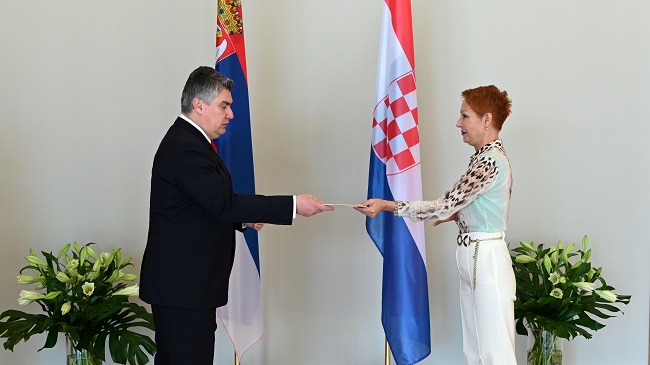
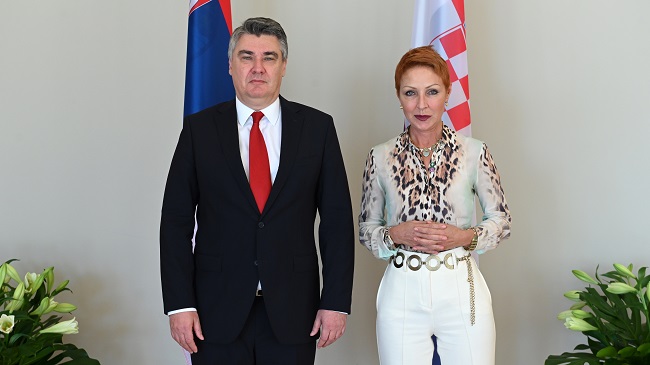
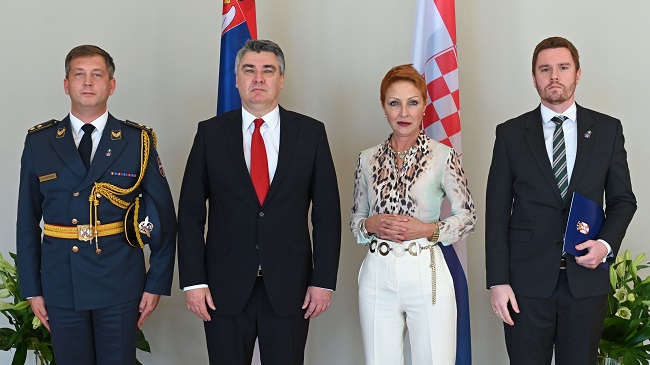
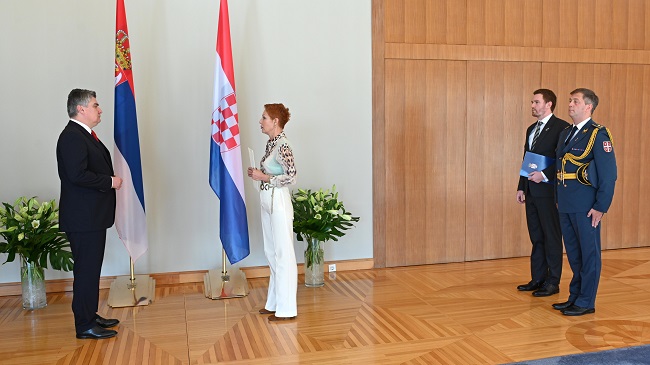
Photo: Office of the President of the Republic of Croatia / Marko Beljan |
|
|
| Handover of duties at the Ministry of Foreign Affairs completed - 10/27/2022 |
|
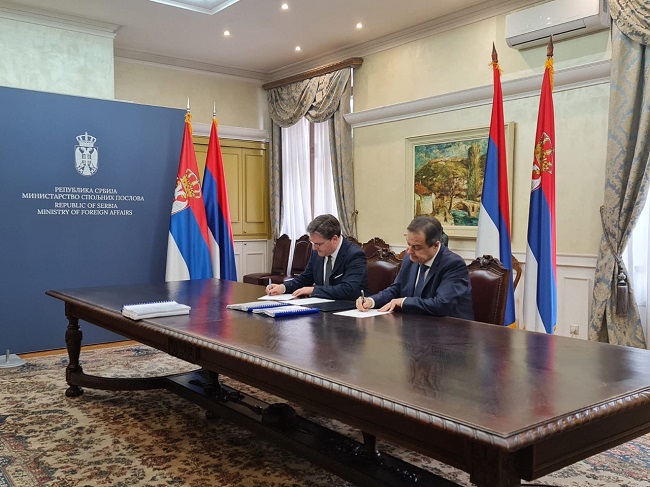
The handover of duties at the Ministry of Foreign Affairs of the Republic of Serbia between the outgoing Minister Nikola Selaković and the new Head of Serbian Diplomacy Ivica Dačić was completed this morning.
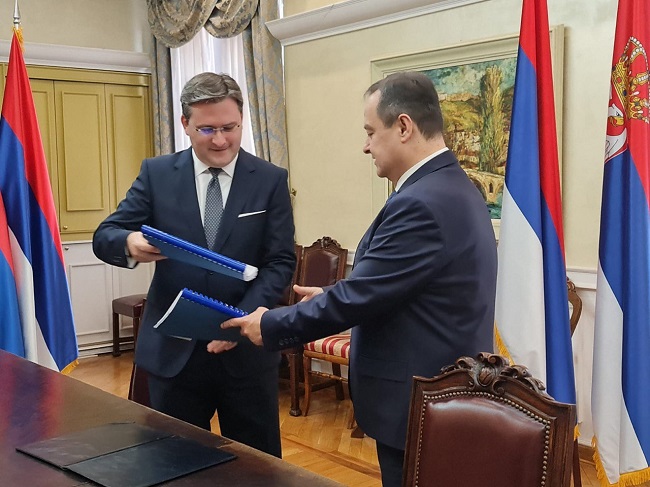
Minister of Foreign Affairs Ivica Dačić and Nikola Selaković, who will lead the Ministry of Labour, Employment, Veterans and Social Affairs in the new Government of Serbia, exchanged opinions in a frank and open conversation on the current foreign policy challenges facing Serbia and its diplomacy.
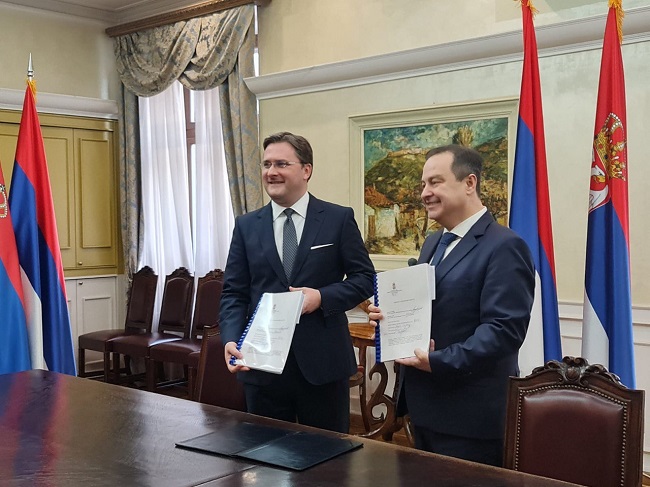 |
|
|
| Statement by Minister of Foreign Affairs of the Republic of Serbia Nikola Selaković at the meeting of the UN Security Council on the report on the work of UNMIK - 10/18/2022 |
|
Mr. President,
Madam Special Representative,
Ladies and gentleman,
It gives me honor to addressthis distinguished body once again and to discuss the latest report of the Secretary-General on the work of the UNMIK.
I would like to thank the Secretary-General and the Special Representative for submitting the report. We take note of the efforts that Ms. Ziadeh makes in performing this very responsible duty, especially bearing in mind the necessity of a comprehensive overview and the complexity of the situation on the ground.
I also take this opportunity to underline that the Republic of Serbia highly values the activities of UNMIK in Kosovo and Metohija, established under UN Security Council Resolution 1244. We advocate for its continued operation in an unchanged and undiminished scope and capacity, especially bearing in mind that the Mission has not yet achieved the main goal of its mandate - a peaceful and normal life for all citizens of our southern province.
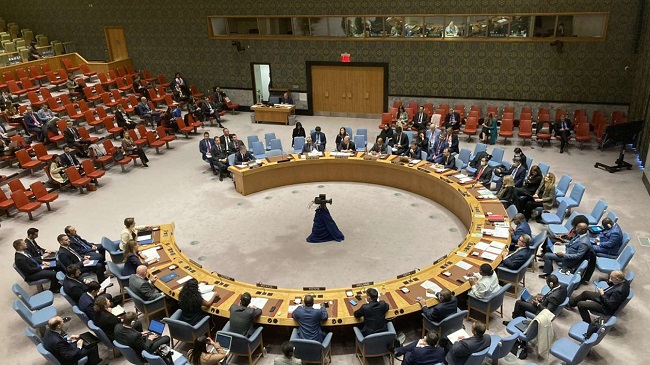
Ladies and gentlemen,
Unfortunately, the last few months have not brought more stability in Kosovo and Metohija and the situation in the Province is not exactly as presented in the report. Unilateral moves of Pristina continue to consciously and systematically deepen ethnic differences, causing discrimination against the non-Albanian population. To our knowledge, 105 ethnically motivated attacks have been recorded since the beginning of this year. In addition, Pristina is actively working on administrative and bureaucratic obstacles, by taking measures that were not agreed upon in the dialogue as the basic mechanism for negotiations and reaching solutions between Belgrade and Pristina. Pristina’s approach is problematic in many ways. This irresponsible conduct of Pristina is consciously sabotaging the efforts not only of Belgrade, but also of the EU and other involved parties of the international community, with the clear intention of achieving two goals - the first being to avoid the implementation of assumed commitments. The second, the ultimate and far more alarming goal is the intimidation, marginalization and persecution of Serbs.
In all previous statements before this this distinguished body, Pristina focused on what happened in the past while failing to mention, which is painful to witness, how non-Albanians in Kosovo and Metohija live today. Serbs are still intimidated in different ways, forced to leave their homes, villages and cities. Those displaced are discouraged from returning to where they were born and lived their lives.
The provisional institutions work systematically to remove and erase as much as possible of the cultural and national diversity that is left. At the same time, Pristina is consciously fueling inter-ethnic tensions using all available methods.
Attending religious celebrations seems to be a crime in Kosovo and Methohija. It is the case of Nikola Nedeljković who was arrested for allegedly "inciting ethnic hatred and intolerance", but actually his imprisonment was for attending the St. Vitus Day (Vidovdan) celebration.
Nikola was sentenced to eight months in prison without any material evidence. On the other hand, let me remind you that even to this day there is not a single perpetrator held legally accountable for the more than 1,000 Serbs killed since 1999. Due to planned intimidation, almost all towns and villages in Kosovo and Metohija are ethnically cleansed. Representatives of Pristina are ignoring the suffering, insulting the open wounds of the Serbs who had to leave their ancestral homes, and I underline, there are more than 200,000 of them. Such conduct has not change for last 23 years and is in complete opposite to the democratic values and principles that the provisional institutions of self-government often promote in their statements.
Therefore, I consider it necessary to emphasize that the true political will of the involved international actors and Pristina is necessary in order to create the conditions for the beginning of the end of discrimination on a national basis and common life in the Province.
Esteemed members of the Security Council, I would like to draw your attention to the rigid, problematic and extremely irresponsible conduct of the other negotiating party within the dialogue. In achieving the above-mentioned goals, Pristina applies the so-called policy of reciprocity, a well-thought-out, malicious strategy that, unfortunately, was not constructed independently. By continuously insisting on mutual recognition as a central part of the dialogue, the so-called policy of reciprocity demonstrates the essential unwillingness of the current political leadership of Pristina to find any compromise solution. Let me remind you that the talks between Belgrade and Pristina did not start with last elections in Pristina, but have been in progress for 11 years since the technical dialogue started (8 March 2011). Therefore, we assess as inadmissible attempts to disregard the current format of the dialogue, and annul the agreements only because they are not to the liking of the current political factors. It is unacceptable that the current geopolitical circumstances are being used to simply erase what has been painstakingly worked on for years. Belgrade, I underline, was institutionally involved in the dialogue from the very beginning, while the commitment of the other side has varied and continues to vary depending on the political option that is in power.
The harsher political rhetoric and narrative of the current leadership of the provisional institutions of self-government in Pristina are accompanied by concrete destabilizing steps. In the reporting period, measures on license plates were imposed, disguised as attempts at alleged integration into society.
Let me remind you again, there was no agreement on such measures in the dialogue between Belgrade and Pristina. I believe, ladies and gentlemen, that even today we will hear from the representative of Pristina that their side has fulfilled all obligations, but the decision on re-registration of license plates shows that Pristina is not only failing to fulfill what has been agreed upon, but it nullifies the results of the dialogue, creating a new crisis all over again. The effect of such forcibly imposed measures is best illustrated by the fact that since the decision was made a single-digit number of re-registered vehicles with Serbian license plates has been recorded, of which only two are Serbs from the north of Kosovo and Metohija. This is another indicator that Pristina does not enjoy full support, but that, on the other hand, it continuously provokes the natural reaction of the Serbian population, which cannot endlessly be subject to the arbitrariness of temporary institutions.
I believe that even today we will hear already known narrative of representatives from Pristina who try to present every reaction of the Serbs in Kosovo and Metohija as an activity organized by Belgrade in alleged attempts at destabilization. Such claims are simply not true. Serbia, for its part, cannot in any way contain the revolt present among the non-Albanian population of Kosovo and Metohija. It is an undeniable fact that citizens' protests represent a voice against many years of institutional violence and the deprivation of rights of the non-Albanian population, which, in this case, is denied the right to peaceful enjoyment of private property acquired in a legal manner.
Pristina does not cease in its attempts to confiscate property, and, as is well-known, one of the targets is the Serbian Orthodox Church. By calling into question the return of property to the Dečani Monaster Pristina paradoxically does not execute the decisions of its own so-called Constitutional Court.
Ladies and gentlemen,
I thought for a long time how to best illustrate the true picture of everyday life of the non-Albanian population in Kosovo and Metohija. I will mention only some of the facts. Numerous ethnically motivated incidents, hate speech, intimidation, violations of the right to a fair trial, threats to the right to freedom of movement and religious rights, desecration of churches and graves were recorded in the last reporting period as well. The frequent attacks on the sites of the Serbian Orthodox Church are also unacceptable, and especially the humiliating attitude towards the Serbian cultural and spiritual heritage, including the 4 monuments that have been inscribed on the UNESCO World Heritage List. Numerous administrative and technical barriers are imposed on priests and monastic communities, making it difficult and even impossible for them to survive on church properties.
When it comes to civil rights, try to imagine that the basic political and civil right to vote has been taken away from you.
This is precisely what the Serbs in the Province have experienced along with frequent intimidation and violent incursions of the ROSU special forces, which are an instrument for the implementation of Pristina's goals under the pretext of allegedly fighting crime.
In December last year Bratislav Nikolić the president of municipality of Štrpce has been detained, as suspected of the organized crime and corruption - still not charged, kept in detention unit in Podujevo, only for the reason to make additional and final pressure on the Serbian community living in the enclave of Štrpce. How can this be justified as the fight against crime when special forces are used to raid village festivals, schools and kidnap drivers of ambulance transporting infusion containers and medicines? What are the motives behind and how can one rationalize these actions? Just try to imagine and put yourself in the shoes of Ms. Dragica Gašić, the only Serbian returnee in Djakovica. Imagine that you are still not allowed to buy bread because of your origin and nationality, because you live in a municipality that the local Albanians proudly consider forbidden to non-Albanians. Imagine that as many as eleven Albanian civil society organizations demand your expulsion, as well as a ban on any non-Albanian ever returning to that town. Then you will realize the level of intimidation that Serb returnees are facing. It will be clear to you why the percentage of returnees is below 2% and why it is still one of the lowest in the world. Let me pose a question - are these the characteristics of a society that presents itself to the world as a fully fledged democracy and a factor of stability in the region?
We are aware that the dialogue has a wider dimension and that it can affect the situation in the entire region.
This is reflected in every statement given by Serbian officials, including the President of the Republic of Serbia, Aleksandar Vučić. "It is better to negotiate for a hundred years than to fight for a day" are the words of our President that best describe the policy of peace, reconciliation, and regional cooperation pursued by the Serbian leadership, which is guided by the vision of building a common and prosperous future of the Balkans.
I believe that it is a duty of today's leaders to create a clear common vision for the future generations. Such a vision was shown by the leaders of Belgrade, Skoplje and Tirana by creating Open Balkan, an initiative from the region for the region, which is already producing concrete results. Serbia has on several occasions reached out to Pristina inviting it to join this initiative. We counted on an awareness of the importance of economic connectivity and progress for the benefit of the citizens of the entire Balkans. However, our invitation was not met with understating from the other side.
Ladies and gentlemen,
We categorically reject Pristina's argumentation regarding the alleged unconstitutionality of the formation of the Community of Serb Municipalities. It is clear that Pristina's attitude towards this obligation reflects its attitude towards the Serbian people in the Province. It also indicates that Pristina is against Serbian people being organized as an ethnic community and thus exercising their collective rights.
The aim of their approach, as a preferred model, is a community without Serbs, such as those in Pristina, Djakovica or Pec, or some similar localities in the Province. For our side, it is unacceptable that Pristina has refused to fulfil its obligations and discuss the formation of the Community of Serb Municipalities for as much as 3,470 days but I assure you that, regardless of this fact, Serbia will not give up on its efforts to find a compromise solution for the current situation.
I will remind you that the representatives of Pristina, although they often repeat in their statements that the case of the so-called Kosovo is a fait accompli, continue not to be recognized by the majority of UN member states for 14 years now. If the so-called Kosovo's independence is a reality, how come that we have the dialogue? And how come that Belgrade is faced with increasing pressures as regards the need for mutual recognition? What the current political leadership of Pristina refuses to accept is that Belgrade cannot be left out in the search for a final solution. The same also applies to the case of the increasingly frequent indications about Pristina's upcoming membership in international organizations. Will these moves help to create the necessary atmosphere for dialogue? Are we, in this way, rewarding Pristina's destructive behaviour and refusal of dialogue? Our view is that the attempts of the so-called Kosovo to join international organizations are an unacceptable act and Serbia will work decisively against such steps.
During the last session in April this year, we could hear the calls of some members of the UN Security Council to reduce and even terminate UNMIK, with the explanation that Pristina has its own functional institutions. However, the circumstances I have presented to you and the situation on the ground remind us again that international presence in our southern province is still necessary. In this regard, we support the efforts made by UNMIK, KFOR, EULEX and OMIK within their mandates. The Serbian and other non-Albanian population in Kosovo and Metohija has the highest confidence in the international presence and considers it a guarantor of security, which additionally confirms that international missions need to remain engaged in an undiminished scope and capacity in accordance with UN Security Council Resolution 1244.
In conclusion,
I would like to point out that lately in all international forums we keep hearing calls for respect of the principles of the UN. We support the territorial integrity of all UN member states. But, what about Serbia? I would like to ask the esteemed members of this distinguished body whether the need to implement the principles of the UN Charter applies only to some or all of its members? As a country that consistently respects international law and still suffers the consequences of it being violated, we believe that the UN Charter and international law, including the territorial integrity and sovereignty of states, should be respected by all and apply indiscriminately to all UN member states.
Ladies and gentleman,
It was this body that more than two decades ago adopted Resolution 1244, which confirmed the territorial integrity of Serbia. This fact did not prevent certain countries from recognizing the so-called “Kosovo” and thus violating the UN principles, but also the resolution that they adopted, by adjusting international law to their interests and goals. Precisely because of this, the more and more frequent mentioning of the case of "Kosovo" is an indication that the precedent made opened a Pandora's box, because the strength of each principle rests on its full and universal application and unconditional adherence.
You will notice that I posed a lot of questions in my statement and I express hope that today we will hear answers to at least some of them from you, esteemed members of the UN Security Council and representatives of Pristina, because the inhabitants of Kosovo and Metohija, of any nationality, whether they are Serbs or Albanians deserve it.
All the inhabitants of Kosovo and Metohija have every right to expect an improvement in the atmosphere and the reduction of tensions on the ethnic level, which are a prerequisite for a normal life. For such a step to be made, we need constructiveness, which is not lacking on the Serbian side, genuine support of international actors. I emphasize that Serbia has always been and remains deeply committed to finding a sustainable solution by peaceful means, for the sake of peace, stability and a common future.
Thank you.
Source/Photo: www.mfa.gov.rs
|
|
|
| Selaković: Serbia is actively involved in combating terrorism, radicalism and extremism - 11 Маy 2022 |
|
Today, in Marrakesh, Minister of Foreign Affairs of Serbia Nikola Selaković participated in the Ministerial Meeting of the Global Coalition to Defeat ISIS. Minister Selaković said that Serbia was committed to the multilateral aspect of the fight against terrorism, adding that he firmly believed the United Nations should be the key forum for international cooperation in this field.
Minister Selaković stated that Serbia was fulfilling all international obligations pertaining to the implementation of UN Security Council resolutions, especially those related to the introduction of arms embargoes, including bans aimed at non-state actors, terrorist organisations and related individuals. He emphasised that Serbia was a signatory to 15 international conventions against terrorism. “By participating in multinational UN and EU peacekeeping missions, Serbia is making a concrete contribution to preserving regional and global security,” Minister Selaković said, paying tribute to a member of the Serbian Army, Lieutenant Colonel Dejan Stanojević and his colleagues, who tragically lost their lives on March 29 in the United Nations Mission in the Democratic Republic of the Congo.
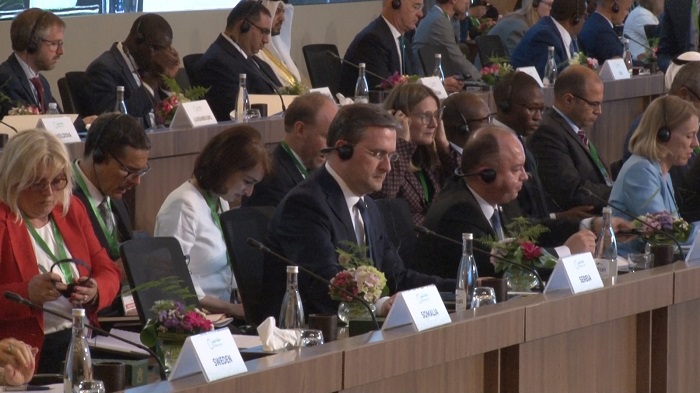
“Serbia does not diminish the importance of other international forums, which is why it joined the Global Coalition from the very beginning, and selflessly contributes to international efforts to fight ISIS, primarily through various forms of donations in military equipment, ammunition, and training in Iraqi security forces”, Minister Selaković said. He added that as a candidate country for membership in the European Union, Serbia gave its full contribution through active participation in European policies on the fight against terrorism, and had developed a strategic cooperation with EUROPOL.
Minister Selaković noted that Serbian criminal legislation provided instruments to prevent and punish the encouragement, organisation, and participation of its citizens in wars or conflicts in foreign countries. He explained that the Serbian judicial authorities had completed proceedings against 7 persons engaged in foreign battlefields, and that several investigations against persons connected with terrorist activities were underway.
Minister Selaković said that the fight against terrorism, radicalism and extremism was a priority, and that Serbia was actively involved in combating these challenges and threats at the domestic, regional, and international level.
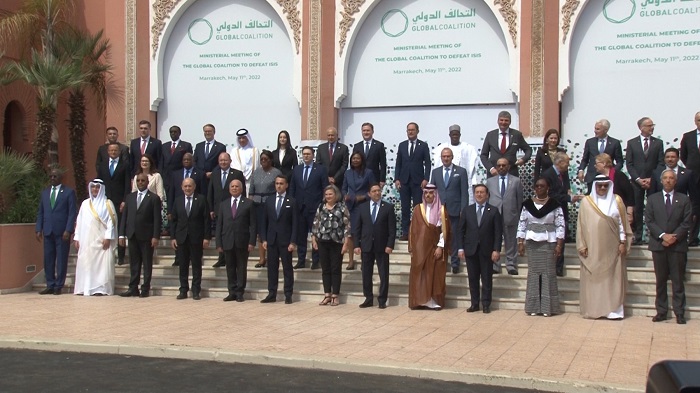
|
|
|
| Foreign Minister Selaković meeting with the Head of the EU Delegation and the Ambassadors of the EU Member States - 1st March 2022 |
|
The Minister of Foreign Affairs Nikola Selaković met today with the Head of the EU Delegation Emanuel Giofre and the Ambassadors of the EU Member States accredited to Serbia.
Minister Selaković informed the ambassadors present about the Conclusion of the National Security Council, which was adopted by the Government of Serbia on February 27 - regarding the situation in Ukraine.
The Serbian Foreign Minister said that Serbia deems the outbreak of the crisis and conflict in Ukraine deeply regretful, emphasizing that Serbia considers it very wrong to violate the territorial integrity and sovereignty of any state, as in the case of Ukraine. In this regard, Foreign Minister Selaković reiterated that Serbia very clearly insists on the respect for the principles of international law, pointing out that this is the foundation of the Serbian foreign policy.
FM Selaković underscored that Serbia gives fully supports the negotiations between the two sides and all credible international efforts to find a peaceful and political solution to the crisis in Ukraine.
Mr. Selaković pointed out that Serbia will continue to consistently maintain peace and stability in Southeast Europe in these challenging times, emphasizing that modern challenges also show that all disagreements on our continent must be resolved by peaceful means and dialogue. |
|
|
| Belgrade to get Centre for Fourth Industrial Revolution - 2/7/2022 |
|
Prime Minister Ana Brnabic attended today in Geneva the signing of the Agreement on the Establishment of the World Economic Forum Centre for the Fourth Industrial Revolution in Serbia, the first of its kind in the Western Balkans.
The agreement was signed at the headquarters of that forum by Director of the Office for Information Technologies and eGovernment Mihailo Jovanovic and Managing Director and Head of the Forum's Centre for the Fourth Industrial Revolution Jeremy Jurgens.
The centre in Serbia will be the 16th in the network of centres of the World Economic Forum in the world and the first in the region of the Western Balkans.
The new centre will start operating on 1 March and will function as a non-profit organisation and a platform for public-private partnership and cooperation for the Fourth Industrial Revolution, while the focus of work will be on artificial intelligence and bioengineering.
This centre will work within the Serbian government’s Office for Information Technologies and eGovernment and will cooperate with scientific institutes, state institutions and the private sector.
The signing of this document was also attended by founder and Executive Director of the World Economic Forum Klaus Schwab and President of the World Economic Forum Borge Brende, with whom Brnabic had previously met.
Addressing the press, Brnabic pointed out that this agreement is the result of many years of joint work between Serbia and the World Economic Forum.
We started talking in 2018, signed a Memorandum of Understanding, then 2020 hampered us a bit, but we continued to plan in 2021 and here we are today, she said.
According to her, the centre will be focused on the development of artificial intelligence, biomedicine and biotechnology, and on the ways in which digitalisation can raise the productivity of companies and the entire economy.
This is what further leads to higher salaries, a better standard of living, as well as to an economy that is mainly based on knowledge, creativity and innovation, Brnabic emphasised.
Today, we have received great recognition for everything that Serbia has done in the field of digitalisation, development of high technologies and paradigm shift – from an economy that was based on labour-intensive investments to digital development.
That is why this agreement shows that Serbia has been recognised as one of the leaders in the economy and IT industry in the last six years, the Prime Minister pointed out and assessed that this is the announcement of the beginning of an even closer cooperation between Serbia and WEF.
She added that they will have a joint meeting with the 16 WEF centres for the fourth industrial revolution in the world every month, at which they will talk about what each of them is doing, since each has a different focus.
That is how we will hear what everyone is doing every month, learn from each other and I am sure that the centre in Belgrade will be one of the best, the Prime Minister said.
According to her, this gives us visibility, the opportunity to further establish Serbia as an investment destination, a country good for living and investing in new technologies and knowledge.
Jovanovic said that the ecosystem formed around the centre will use the infrastructure of the National Platform for the Development of Artificial Intelligence, the Centre for Genome Sequencing and the future bioeconomic centre – BIO4 Campus.
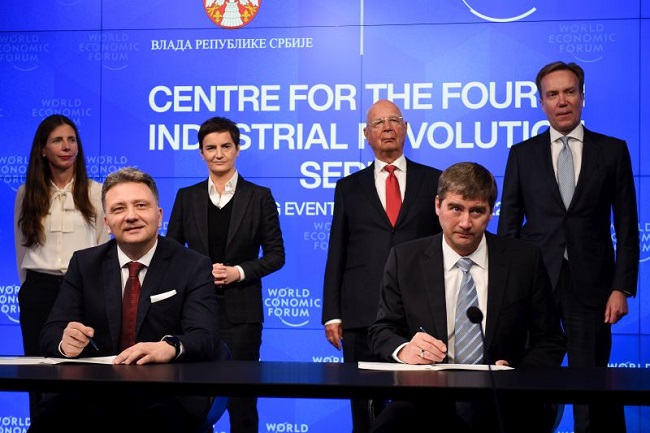
Source/Photo: Tanjug
|
|
|
| Opening of cluster 4 important turning point for Serbia - 12/14/2021 |
|
Prime Minister Ana Brnabic stated in Brussels today after the Intergovernmental conference on the accession of the Republic of Serbia to the European Union (EU) that today is a very important date and a turning point for Serbia.
Brnabic said that in line with the new methodology, Serbia has opened cluster 4 – Green Agenda and Sustainable Connectivity, and within cluster 4, four chapters have been opened.
The Prime Minister underlined that this is a great success on which she wants to congratulate all citizens of Serbia and she thanked President of Serbia Aleksandar Vucic on the support and understanding he showed.
An important segment of the new methodology is political management of integrations. What we have done in the mandate of the new government is that we manage, together with Minister of European Integration Jadranka Joksimovic, the integration process and all reforms, first and foremost in the field of the rule of law, politically in full, and that yielded results, the Prime Minister said.
She said that the opening of the chapters is a huge motivation for further reforms in the field of the rule of law, public administration and the economy.
I would like to thank all EU Member States, as well as the European Commission, for their support and understanding. They have shown that they are open, that they are ready to see, to listen, to reward everything we have done and therefore this is a great motivation to continue, not even in the same way we have worked so far, but to go faster and to work better, she noted.
Brnabic voiced hope that Serbia will open cluster 3 in 2022, which is ready, and that preparations for the opening of cluster 5 are on the agenda.
The Prime Minister underlined that environmental protection is gaining importance and that this topic is increasingly present and important in Serbia.
Regional stability, dialogue with Pristina and the economy also remain our priorities. I am satisfied, and we talked about that today, about economic results Serbia is achieving. I expect our growth this year to be 7.5 percent, the Prime Minister pointed out.
She said that the degree of harmonisation of Serbia with the foreign and security policy of the EU currently stands at 65.55 percent.
Brnabic also thanked Slovenia for the successful EU presidency, she thanked EU Member States on their support, as well as the European Commission, European Commissioner for Neighbourhood and Enlargement Oliver Varhelyi and European Commission President Ursula von der Leyen.
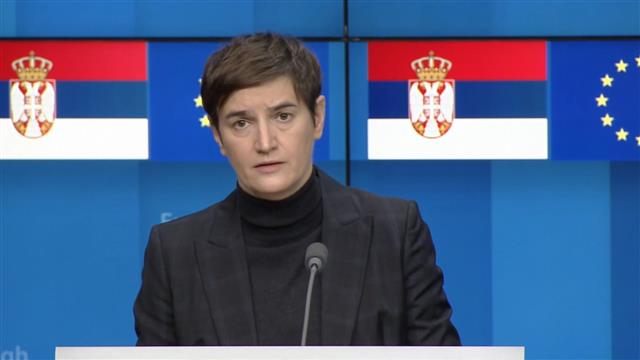
Source: www.srbija.gov.rs
Photo: Tanjug
|
|
|
| Selaković spoke with Giaufret and EU ambassadors - 11/18/21 |
|
The Minister of Foreign Affairs of Serbia, Nikola Selaković, met with the Head of the Delegation of the European Union, Emanuele Giaufret, and the ambassadors of the EU member states accredited in our country.
Selaković emphasized that EU membership is an absolute priority of our foreign policy and strategic commitment, conveying that we are fully committed to the reform process and the improvement of all segments of our society.
He assessed that the dynamics of accession negotiations should be in line with our reform efforts, but that it is encouraging that this year's European Commission report on Serbia's progress has a more positive tone than the previous one, and that, in that sense, we expect that an Intergovernmental Conference will be held by the end of the Slovenian presidency of the EU Council, at which two clusters will be opened.
The Minister said that Serbia maintains an intensive dialogue with EU officials and added that we look very positively at the decision of the Foreign Affairs Council to consider a way to include partners from the Western Balkans in the discussion on foreign and security policy.
The head of Serbian diplomacy emphasized that the EU is Serbia's most important foreign trade partner, informing his interlocutors that the trade exchange between Serbia and the EU has increased by 52% in the last seven years, and the export of Serbian products to the EU increased by 64%, which is a joint result, as he assessed.
Selaković said that Serbia is fully committed to preserving peace and stability in the region through cooperation and open dialogue, emphasizing the "Open Balkans" initiative as a way to connect the region economically.
When it comes to the process of normalization of relations between Belgrade and Pristina, Minister Selaković said that our side is fully committed to dialogue, and that we have fulfilled our obligations, but that Pristina persistently avoids fulfilling its own, citing as an example that for eight and a half years nothing has been done regarding the establishment of the Association of Serbian municipalities. In addition, according to him, Pristina's unilateral moves on the ground, four in the last two months, further endanger peace and stability.
The Minister informed the heads of missions about the fight against the pandemic in Serbia, expressing readiness for further cooperation with partners from Europe and the world in the joint fight against the corona virus.
Ambassador Giaufret thanked the Minister of Foreign Affairs Selaković for the reception of the ambassador of the European Union in the Palace of Serbia. Ambassador Giaufret welcomed the current level of cooperation between the EU and Serbia in the field of common security and defense policy, as well as the important contribution of Serbia to EU missions and operations.
"We really hope that we will be able to further develop the harmonization of Serbia's foreign policy with the European Union", the ambassador said.
The EU Foreign Affairs Council had a strategic conversation on the Western Balkans on Monday, and a political dialogue on foreign and security policy was held in Belgrade two days ago, a couple of weeks after the publication of the Annual Report, Ambassador Giaufret pointed out.
"In the Foreign Affairs Council, there is broad support for the EU's strong engagement in the region and further joining the region in our foreign policy efforts. We had a good exchange of views on that today, and we will work on further integration of Serbia and the region at all levels", the ambassador concluded.
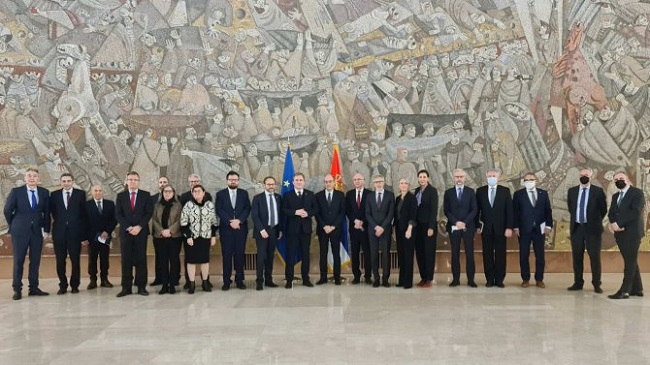
|
|
|
| Address of the President of the Republic of Serbia at the United Nations climate change conference COP26 held in Glasgow - 11/02/2021 |
|
"Your Excellences,
distinguished delegates,
dear Sarah,
At the very beginning, I feel obliged to thank Prime Minister Boris Johnson and Her Majesty’s Government for exceptional hospitality.
I feel privileged to represent the Republic of Serbia at this important place and at the highest-level world forum, in working on the most important topic of today – promoting climate awareness.
We all agree that we must make investment into climate and environment.
We all, likewise agree, that future generations must be educated in order not to repeat the mistakes we made, by hurting the only Planet that makes life possible.
I am very honoured that the Republic of Serbia is co-chairing this year’s Conference as a Non-EU representative of the Eastern Europe Group.
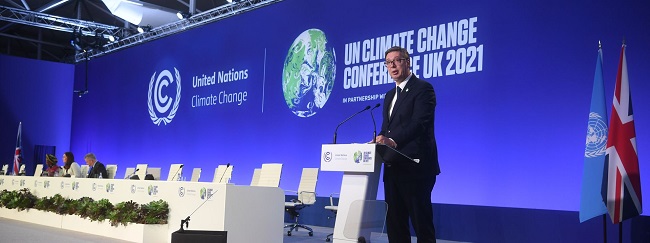
In concrete terms, we see the special contribution of our expert team in finalising negotiations on the implementation of Article 6 of the Paris Agreement, which refers to the establishment of the global market and non-market mechanisms for reducing greenhouse gas emissions, as well as to remaining provisions referring to advanced transparency framework and common timeframes for Nationally Determined Contributions, which are the key provisions of the Agreement that have not yet been covered by the decision that is to be adopted by the Conference, i.e. all member states.
We, therefore, believe that this is an exceptional opportunity for Serbia to give its full contribution to the finalization of negotiations, which, we hope, will secure full implementation of the Paris Agreement.
As a result of strong economic development, modelled for Serbia by 2050, the impact of the implementation of climate measures to employment will be optimal, through new jobs creation and creation of new industries which have not existed so far.
One billion euros was raised at the first green bonds auction in Serbia, which clearly confirms the trust of international investors in our green agenda, but also to the economic and political stability of our country.
Incomes from green bonds issuance will be used for financing renewables, energy efficiency, sustainable water management, prevention of pollution and circular economy development and biodiversity preservation.
And as you can see, dear friends, my people made a terrific speech for me, but I am going to add a few more words and a few more questions for those that are coming from big powers and that haven’t answered yet several questions:
Number one is: how are we going to finance all these activities?
We’ve heard the story of trillions of dollars that are at our disposal. My question would be: what would be the interest rate, what would be the terms for taking these amounts of money, and actually how are we going to tackle that issue?
Number two: how are we going to treat the nuclear power plants? Are we going to shut them all or are we going to build them more?
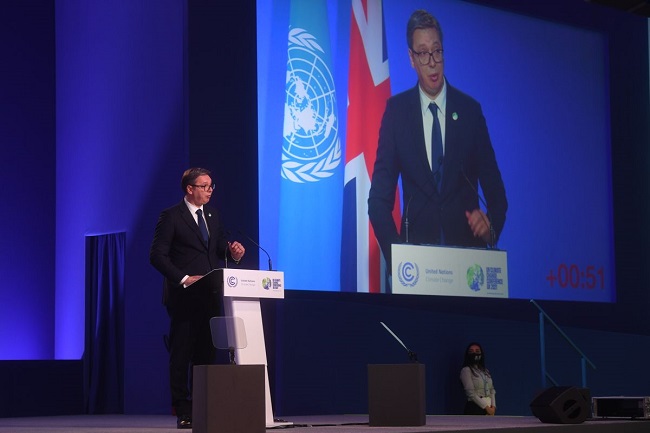
Then, how are we going to build more renewables if we already started endorsing populist movements against wind parks, new hydropower plants, and are we going to put in jeopardy the level of our public debt to GDP ratio if we raise huge amounts of money?
How are we going to treat natural gas, and how are we going to secure decent prices of natural gas and electricity power as well?
And, I came here using an electric car from Edinburgh to Glasgow. But, how are we going to do mining and refining of lithium, nickel, cobalt and many other very important minerals?
In the end, we all know what is our final aim, what is our final target. But, it’s not a fairytale – we’ll have to work a lot, we’ll have to be 100 per cent dedicated, and we’ll have to be more honest with each other.
The health of people living in Serbia depends directly on the implementation of this Agenda, just like the health and life of each living being on Earth depends on arrangements that will be reached here and on national implementation of the respective arrangements.
Perhaps it is the right time to listen and hear the cry of Mother Earth because if we lose this race against time, our children will inherit an irreparably polluted Planet.
Thank you very much for listening to me."
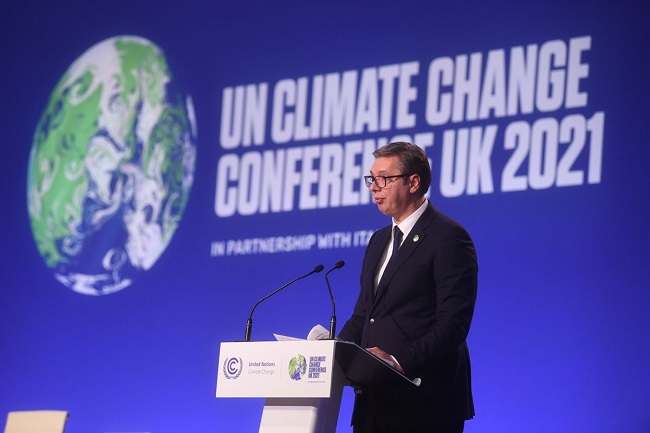
Source: www.predsednik.rs
Photo: Dimitrije Goll |
|
|
| Contracts for 14 apartments in Belgrade for refugees from B&H and Croatia awarded - 10/25/21 |
|
The Minister of Foreign Affairs, Nikola Selaković, attended the handing over of contracts for 14 apartments intended for refugee families from Bosnia and Herzegovina and Croatia tonight in the Old Palace, which were purchased within subproject 9 of the Regional Housing Program of Serbia.
"It is my great pleasure and honor to greet you all on behalf of the Government of Serbia, on behalf of the state of Serbia, to thank all donors, especially the EU, which gathered the largest number of donors who are EU member states, but especially the Kingdom of Norway, as one of the largest donors outside the territory of the EU, on the successful completion of the ninth sub-phase of the Regional Housing Program", stated the head of Serbian diplomacy.
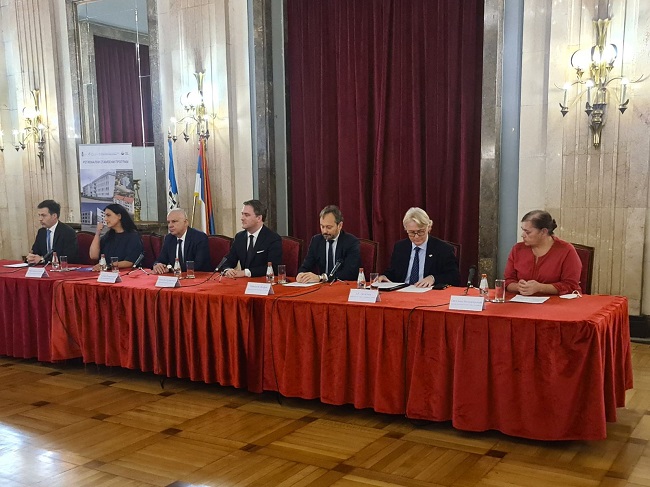
Minister Selaković emphasized that the Regional Housing Program has so far enabled more than 6,000 families who fled and were displaced from the former Yugoslavia, mostly from the territory of today's Republic of Croatia and Bosnia and Herzegovina, to get a roof over their heads.
He added that those families found salvation and refuge in Serbia after those life moments that they can probably never erase from their memory when in one day they lost everything that generations of their parents and ancestors gained.
The head of Serbian diplomacy stated that they found themselves in Serbia and started here from scratch.
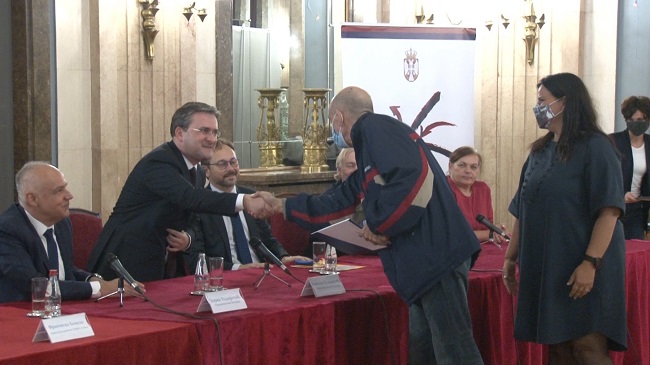
Minister Selaković said that the donors who helped to form the fund itself and make it work, and the Commissariat for Refugees and Displaced Persons and Migration, with the help of the Council of Europe Bank, UNHCR as a partner, the OSCE, allowed many of those who were displaced to get a roof over their heads.
"At one point, there were about 650,000 refugees in Serbia, and according to the data provided by the Republic Commissioner for Refugees and Migration, nearly 100,000 families of our compatriots have received a roof over their heads through the Commissariat, the state of Serbia and the Serbian Government", said Minister Selaković and reminded that earlier today in Ub, contracts on apartments for 21 families were solemnly handed over.
The head of Serbian diplomacy stated that President Aleksandar Vučić, the Government of Serbia, headed by Prime Minister Ana Brnabić, and he personally, as the Minister of Foreign Affairs, are making maximum efforts to resolve this issue in Serbia in the best possible way.
"Tonight, there are 14 families here which enriched the city of Belgrade. The best part of our people are our people who came from Krajina, either from the territory of today's Croatia or B&H, hardworking, honest, good people. I am happy that tonight we have the opportunity and the possibility to provide 14 such families with permanent housing here in Belgrade", said the head of Serbian diplomacy.
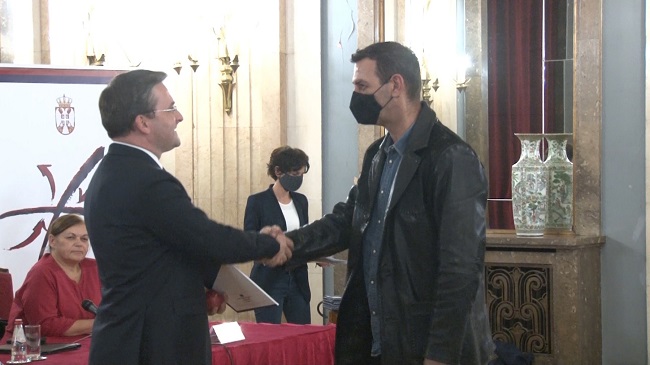
Minister Selaković thanked the donors for their selfless help and efforts, the UNHCR and the OSCE, as well as the City of Belgrade for their kindness.
"Until only a few years ago, the City of Belgrade did not show interest in this activity, that interest came a little more than seven years ago and since then the City of Belgrade has been working inpartnership with the Commissariat and donors on the realization of this project", said the head of Serbian diplomacy.
Minister Selaković wished the families who received apartments to record and count only beautiful and good hours and moments in their new homes, and to leave behind what is difficult in their lives.
He wished the older ones to welcome their children and grandchildren and live to a peaceful old age in health in those apartments, and the younger ones to build and raise their families and their children in those apartments and to rejoice in each new great success.
"Thank you for your patience for waiting until this moment and I wish you that in the future everything in your homes will go much easier and much better than it has been so far. Long live Serbia", said Minister Selaković.
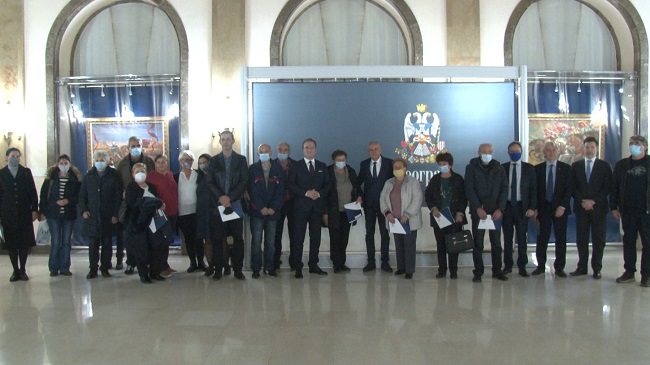 |
|
|
| Contracts for 21 apartments in Ub were distributed to refugee families from B&H and Croatia - 10/25/21 |
|
The Minister of Foreign Affairs, Nikola Selaković, attended the ceremonial awarding of contracts in Ub on the purchase of 21 apartments to refugee families from Bosnia and Herzegovina and the Republic of Croatia within the realization of the Regional Housing Project.
Selaković expressed satisfaction that 21 families are solving their housing issue and that later today 14 families in Belgrade will also get a contract on the purchase of an apartment, emphasizing that we are slowly approaching the estimated 7,500 apartments and houses, necessary to provide housing for our compatriots who left their homes in the '90s.
"From today, each of you will have your own home, which is not magnificent and luxurious, but it is yours", said the minister, adding that Ub is one of the most beautiful municipalities and the municipality that is developing the fastest.
He added that everyone from the state leadership follows the policy of the Government and President Vučić, with the goal of making Serbia better, more organized and more developed.
Selaković thanked all donors individually, the representative of the EU delegation, UNHCR, the Development Bank of the Council of Europe, the Commissariat for Refugees and Migration, with whom exceptional cooperation was achieved.
"I want a new chapter of life to start in your apartments from today, so that you can record only beautiful moments in them", the minister concluded.
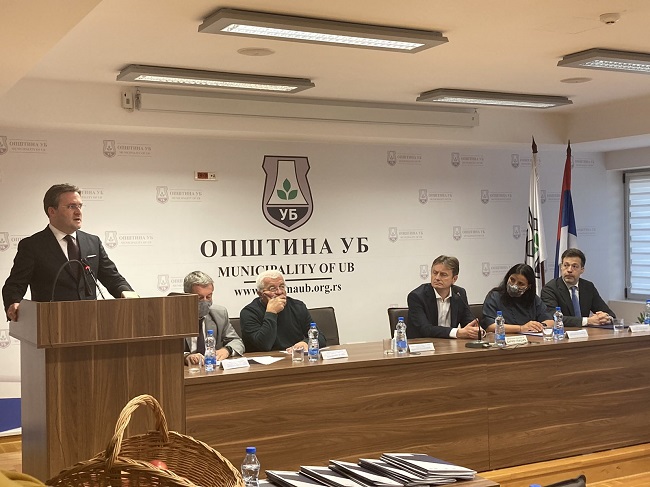
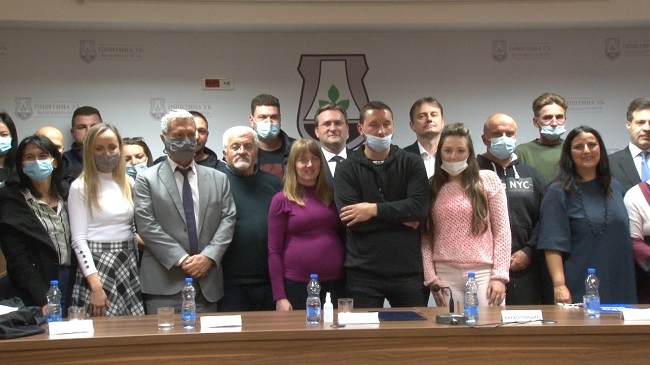
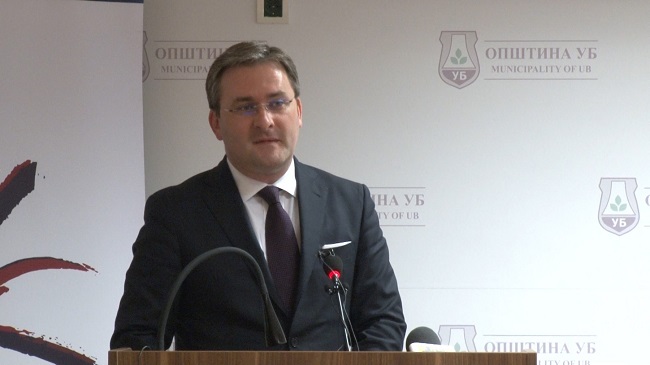
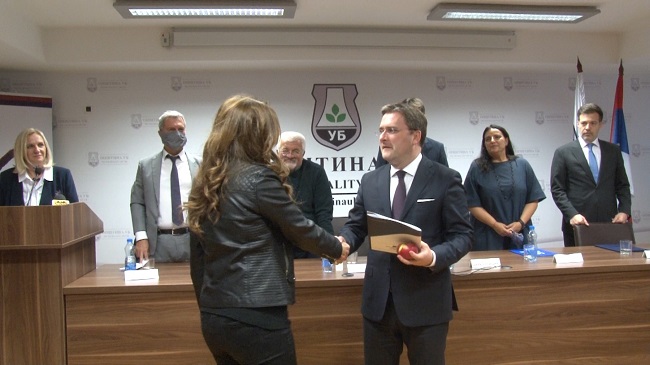 |
|
|
| Continuous communication with EU on further reforms - 10/22/2021 |
|
Prime Minister Ana Brnabic, together with Minister of European Integration and Chief Negotiator Jadranka Joksimovic, met today with Head of the EU Delegation to Serbia Emanuele Giaufret and the ambassadors of the EU Member States.
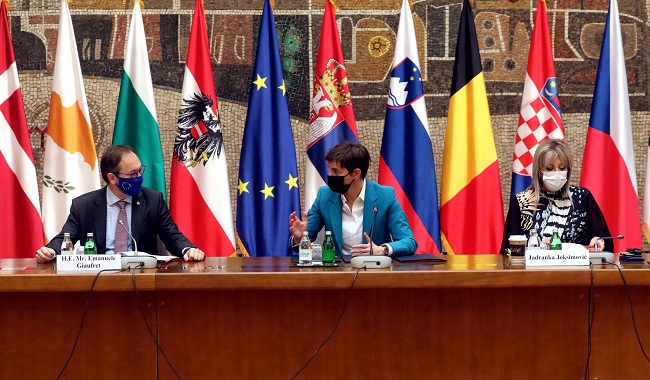
The topics of the meeting were 2021 EU Enlargement Package and in particular the Report of the European Commission on Serbia for this year, as well as the next steps in the process of accession to the EU.
She underlined that Serbia has continuous communication with the Delegation of the EU and all Member States and that it speaks openly about further reforms, first and foremost in the field of the rule of law.
The Prime Minister assessed that this year’s Report on the progress of Serbia gives an objective evaluation of everything the Serbian government has achieved on speeding up the political and economic reforms, by which one of the strategic priorities has been fulfilled.
According to Brnabic, it is of particular importance that the European Commission has given a clear recommendation that Serbia reached the criteria necessary for opening two clusters of chapters.
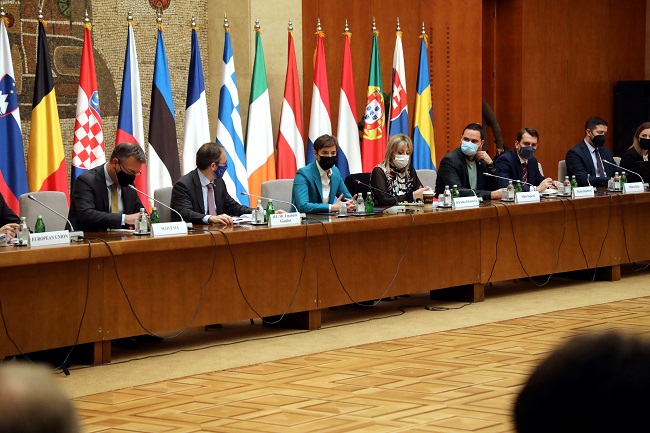
Today we have an opportunity to present to you, as representatives of the EU and EU Member States, additional information on the adoption and implementation of all necessary reforms, the Prime Minister stated.
For this reason, it is important that this meeting is being held immediately after the release of the European Commission’s Report and before the final decision of the Member States on whether they will support the opening of clusters, she said.
Brnabic voiced her hope that these additional explanations will contribute to Serbia obtaining consent for the formal continuation of negotiations by the end of this year.
She also underlined that the European Commission’s recommendation for the further opening of clusters is very important politically, not only as an incentive to the government to continue implementing its reform plans with motivation and responsibility, but also to the citizens of Serbia and all in the region, who in this way receive once more a clear confirmation on the perspective of membership in the EU.
The Prime Minister pointed out that Serbia wishes to make additional progress in all areas, especially in the field of the rule of law and that continuous communication with the Delegation of the EU in Serbia and all Member States is of particular importance to that end.
Joksimovic stated that the Report provides the necessary balance in the evaluation of everything Serbia has achieved in the previous period.
According to her, in some segments the implementation of reforms is faster, in some other somewhat slower, but progress has been noticed in all areas and is noted down in the Report itself.
She voiced hope that the general assessments from the European Commission, which speak in favour of honesty, dedication and capability of the Serbian government to implement policies which are important for the accession process in time of pandemic, will be a sufficient orientation for the Member States to agree on the further opening of clusters.

Ambassador Giaufret expressed gratitude to the Serbian government for convening this meeting with ambassadors of the EU Member States, describing it as a positive indication of Serbia’s dedication to strengthening dialogue on reforms for the sake of solving priorities and necessary activities identified in the yearly Report of the European Commission.
Source/Photo: www.srbija.gov.rs |
|
|
| Selaković in UNSC: Dialogue and the implementation of the agreements reached are the only right way to resolve all open issues - 10/15/2021 |
|
Distinguished President of the Security Council,
Esteemed members of the Security Council,
Distinguished Special Representative,
I would like to thank Secretary-General of the United Nations Mr. Guterres and Special Representative of the Secretary-General and Head of UNMIK Mr. Tanin for the report submitted and for their efforts made towards the implementation of the UNMIK mandate. I would also like to thank the members of the Security Council for the continued attention they have devoted to the issue of Kosovo and Metohija. The Republic of Serbia highly values the activities of the Mission of the United Nations in Kosovo and Metohija and supports it in carrying out its work as efficiently as possible, pursuant to the UN Security Council Resolution 1244, and undiminished in scope, aiming to build and preserve lasting peace, stability and security in the Province.
Mr. Tanin,
Please accept the expressions of our gratitude for your engagement and the cooperation we achieved during your term of office.
Mr. President,
Deep regret and concerns are raised by the fact that the security situation in Kosovo and Metohija in the past period has been marked by an increasing number of various ethnically motivated attacks and incidents targeting Serbs, which was also stated in the Report; that the provisional institutions of self-government (PISG) in Pristina continue to take unilateral steps and refuse to implement the agreements reached in the Brussels dialogue; and that institutional discrimination against Serbs, attacks on the sites of the Serbian Orthodox Church and the undermining of the economic sustainability of Serb communities in the Province have continued.
We are witnessing that dangerous provocations by Pristina are taking place every day, at an accelerated pace, thus seriously threatening the safety of Serbs in Kosovo and Metohija and directly violating the agreements and arrangements reached within the Brussels dialogue.
The latest violent incursion of the so-called ROSU units into the northern part of Kosovska Mitrovica, on 13 October, is the ninth incursion of its kind. Tear gas, shock bombs and unbridled violence are becoming a matter of everyday life for Serbs in the north of Kosovo and Metohija, and that must be stopped immediately.
In the last attack with firearms and chemicals used by Pristina special forces, 71-year-old Verica Djelic died as a result of chemicals used in the intervention, 10 unarmed civilians were wounded, one of them 36 years old Srećko Sofronijević was critically wounded in the back with of an automatic rifle. A three-month-old baby, who miraculously remained unharmed, was also the target of the shooting.
The false excuse for the latest unilateral action, as EU High Representative for Foreign Affairs and Security Policy Josep Borrell called it, was the fight against organized crime and smuggling. Ladies and gentlemen, Serbia is strongly against organized crime and smuggling, but the members of the UNSC should know that such an important and general global goal, which we all share, was cynically used for an armed attack on unarmed civilians, which began with an automatic rifle raid of pharmacies in which patients of Serbian and other nationalities are supplied with vitally important medicines. Four days before the local elections in Kosovo and Metohija, in order to gain votes in an irresponsible and inhumane way, fully motivated by separatist goals, the current PISG regime used medicines on which people’s lives depend to prove its position on the status contrary to UNSCR 1244.
Only a few days earlier, another provocation on the part of Pristina led to a dangerous crisis, when personnel of the so-called ROSU unit, armed with long firearms and reinforced with armoured vehicles, were deployed to administrative crossings between central Serbia and Kosovo and Metohija - Brnjak and Jarinje – in order to remove Serbian license plates and replace them with temporary ones, thus violently preventing the free movement of citizens.
These events do not fall within the reporting period covered by the latest Report of the UN Secretary General on the work of UNMIK, but it is incumbent upon us to address them on this occasion, in order to have everyone understand how dramatic the situation on the ground has been and how serious the consequences of Pristina's unilateral actions can be.
The incursions of heavily armed Pristina police formations, composed exclusively of Albanians, into the north of Kosovo and Metohija, under various pretexts and motives, with the use of excessive force, are provocations that have an extremely dangerous potential to destabilize the already sensitive security situation on the ground. The goal of the latest incursions of Pristina’s special force personnel into the north of the province was to provoke the Serbs and additionally intimidate them with a demonstration of force, as well as to provoke Belgrade to react hastily in some way.
It is obvious that with such moves Pristina aims to erase the 10 years of dialogue, which is the only way to resolve open issues. These provocations once again demonstrate that the provisional institutions of self-government in Pristina, not only do not intend to implement everything agreed in the Brussels dialogue, but that their goal is to completely deny dialogue as a means of resolving problems. An effective response to Pristina's lack of credibility and their dangerous play with fire, which could have unforeseeable consequences, cannot be provided by calling on "both sides" for constructiveness and restraint, which has long been a manner in public communication of some important factors in the international community. There is only one source of destabilization, it has a name – and that is the provisional institutions of self-government in Pristina - and after the events of 13 October, it is clear that it can and needs to be stopped by urgent and decisive action of the international community. It is now quite obvious that these are no longer sporadic and isolated provocations by Pristina, but that this is an organized campaign of ethnically motivated violence and discrimination against Serbs.
We also express our concern over the latest imposition of tariffs by Pristina on certain products originating from central Serbia, which was made public on 8 October. We remind you that the unilateral decision of Pristina to impose duties on products from central Serbia in November 2018 resulted in a de facto complete trade blockade and a long-term stalemate in the dialogue between Belgrade and Pristina. In contrast to Pristina, which persistently seeks to raise barriers towards central Serbia through unilateral acts, Belgrade is persistently and consistently working to liberalize the flow of people, goods, services and capital, which is the basic goal of our "Open Balkan" initiative. North Macedonia and Albania joined this initiative, but Pristina did not.
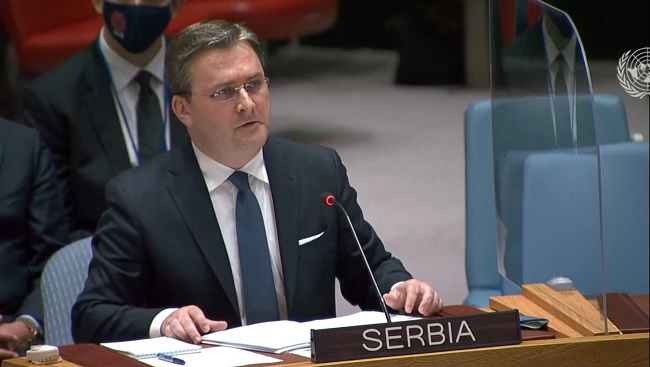
Distinguished members of the Security Council,
In the period from March to September this year, which is covered in the latest Report, close to 100 ethnically motivated attacks were carried out against Serbs, their private property, religious and cultural heritage sites. The increase in the frequency of attacks was accompanied by the strengthening of the intensity of ethnically motivated violence, which more and more often targets children, the elderly, women, the few returnees present there, as well as churches and other property of the Serbian Orthodox Church.
This systematically intensifies the ubiquitous sense of insecurity of the remaining Serbs, but also deters potential returnees, who are in fact being told that local Albanian communities can attack them with impunity and prevent them from returning to live in their own homes.
The most striking example of the position of Serbs in Kosovo and Metohija is the case of the displaced person Dragica Gašić, who moved into her apartment in the municipality of Djakovica again in early June. In that town – to which local Albanians proudly refer as a place forbidden to Serbs - Ms. Gašić, on her return, first faced physical and verbal attacks by citizens of Albanian nationality living there. Instead of being provided protection, that seriously ill woman then became a victim of institutional persecution as well, that the local self-government bodies and the police unleashed against her. Since this is a person who is the first and only Serb returnee to Đakovica after more than twenty years, it was to be expected that, at that moment, at least civil society organizations would attempt to protect her rights. However, NGOs from Djakovica soon joined the activities aimed at the expulsion Ms. Gašić, including those receiving funding from international donors for projects related to strengthening democracy and the rule of law.
I must also mention the latest attack on the house of the only remaining Serbian woman in the center of Pec, retired teacher Rumena Ljubić, whose windows were stoned twice in just 24 hours on 13 October.
Dragica's and Rumena’s fate is a frightening reflection of the real situation of human rights that almost every one of over 200,000 displaced Serbs and non-Albanians would face in Kosovo and Metohija - provided that they gather the courage to return to their homes in the Province after more than twenty years. I would like to remind you again that since 1999, only around 1.9% of internally displaced Serbs and other non-Albanians have achieved a sustainable return to Kosovo and Metohija.
Therefore, I believe that the aforementioned will encourage the members of the Security Council and the international presence on the ground to devote priority attention in the future
to the issue of the return of displaced persons, which is an important part of the UNMIK mandate under UN Security Council Resolution 1244.
I therefore thank the Secretary-General in particular for keeping this extremely important issue in focus and for calling again, in the conclusions of his Report, for the creation of conditions for the sustainable return of internally displaced persons and the sustainable reintegration of returnees.
Distinguished members of the Security Council,
Serbian medieval monuments in Kosovo and Metohija, including monuments that, due to their exceptional value but also constantly being subject to threats are inscribed on the UNESCO List of World Heritage in Danger, are still among the most endangered cultural heritage in Europe.
I wish to recall that there are over 1,300 Serbian churches and monasteries in Kosovo and Metohija. Attacks on Serbian cultural and religious heritage are at the same time attacks on the identity of Serbs in the Province and directly affect their sense of safety.
A striking example of disrespect for Serbian cultural and religious monuments in the Province is the case of the Visoki Decani monastery. The monastery, which has been the target of attacks and shelling several times since 2000, is still secured by KFOR forces due to being under a threat. It is faced with a series of hostile actions, and the perpetrators are not deterred by the fact that this is a World Heritage Site. Despite frequent declaratory statements, even the decision of the so-called "constitutional court" of the PISG in Pristina five years ago confirming ownership of Visoki Decani Monastery over 24 hectares, is not respected. We welcome the assessment made by the UN Secretary General in his Report.
Dear Mr. President,
The Republic of Serbia remains committed to finding a compromise political solution, as prescribed under Resolution 1244, which will ensure lasting peace and stability. We firmly believe that dialogue and the implementation of the agreements reached are the only right way to resolve all open issues.
As a state committed to the respect for international law and a member of the United Nations, Serbia opposes any attempt at establishing an artificial balance between the parties in the dialogue, as well as the relativization of responsibility for unilateral acts.
We note with concern that not even eight years after reaching the Brussels Agreement, the establishment of the Community of Serb Municipalities has not been initiated, although Belgrade has fulfilled all its obligations under that agreement.
There are also numerous and repeated examples of Pristina violating or obstructing agreements reached in dialogue, in the areas of energy, justice, freedom of movement and visits by officials.
One such example is the verdict sentencing Ivan Todosijevic to two years in prison, which is also pointed out in the Secretary General's Report. The Brussels Agreement was directly breached, which was also stated by the representatives of the European Union. With its conduct Pristina caused immeasurable damage to the reconciliation process in Kosovo and Metohija.
Despite the interpretation from the European Commission that this is a violation of the Brussels Agreement, because Todosijevic had to be sentenced by a panel consisting of the majority of judges of Serbian ethnicity, Pristina still does not take any action in this regard.
Pristina also continued with the practice of banning Serbian officials from entering the territory of the Autonomous Province of Kosovo and Metohija.
We believe that it is important that the international community, and especially the European Union, as the guarantor of the agreement, firmly insists that the provisional institutions of self-government in Pristina start implementing all the agreements reached.
Distinguished members of the Security Council,
As before, the Republic of Serbia remains fully committed to resolving the issue of missing persons, as also demonstrated through full cooperation with relevant international mechanisms as well as participation in the work of the Working Group on Missing Persons. We expect that the representatives of the provisional institutions of self-government in Pristina will fulfill their obligations.
Bearing in mind everything I delivered here today in my address, we hold the position that the international presence in Kosovo and Metohija, pursuant to UN Security Council Resolution 1244, is still necessary. In addition to UNMIK, the presence of KFOR as the main guarantor of security and EULEX, due to its engagement in the field of the rule of law, is also important. I would like to emphasize once again that Serbia fully supports respect for international law, comprehensive implementation of UN Security Council Resolution 1244 and activities of UNMIK in an undiminished scope and with adequate financial resources, so that the Mission fulfills the mandate entrusted to it under the Resolution.
Thank you.
|
|
|
| President Vučić attended ceremony of the beginning of works on the modernization and rehabilitation of the Niš-Brestovac railway - 9/30/2021 |
|
The President of the Republic of Serbia, Aleksandar Vučić and President of the European Commission, Ursula von der Leyen, have attended today the ceremony of the beginning of works on the modernization and rehabilitation of Niš-Brestovac railway at the international Corridor 10 as well as signing of the agreement between the Public Company Koridori Srbije and Consortium STRABAG AG and STRABAG d.o.o. Beograd on the construction of the first phase of the Highway of peace in the section Merošina – Merošina 1.
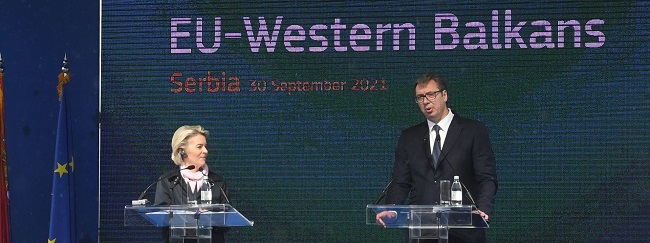
“In Donje Međurovo the 23km long railway is build and 75 percent of it will be financed by the European Union. It is enormous money for us, great encouragement and respect. This railway and highway are important both for us and Europe. I am very grateful to Mrs Von der Leyen for coming to Niš today and Niš becomes the center of all Balkan corridors, it becomes the Balkan crossroads”, said President Vučić adding that Serbia was entirely committed to the implementation of the agreements signed so far under the auspices of the EU.
“We will do our best not only to preserve peace, but also to reach more agreements which would mean security of everyone in the Balkans and better life and economy for all of us. We know what our job is. As much as we can, taking into account the difficulties due to the relation with Priština, we will do everything to make progress on the European path”, said President Vučić and thanked the President of the European Commission for kind words and wish to see Serbia in the EU.
The President of the European Commission, Ursula von der Leyen, emphasized that today Serbia had already gone a long way to the EU membership, it had made an incredible progress and efforts in the past years and improved conditions in different sectors. She said that she strongly supports the European integrations of Serbia.
“This is a very special moment. Signing of this agreement is a symbol of our great cooperation and projects of connections through which we jointly build our European future, because the future of Serbia in the European Union is better. The corridor connects Serbia to Austria and Greece and is really the driving force of economy. It is the driving force for the Serbian economy, investments, the economic plan which already functions in Serbia”, said the President of the European Commission.
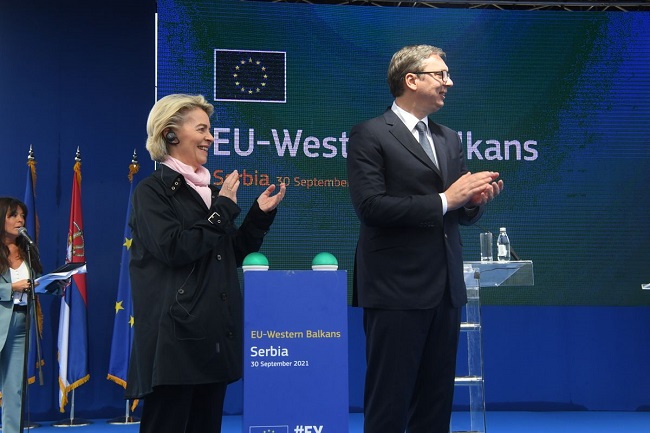
Source: www.predsednik.rs
Photo: Dimitrije Gol
|
|
|
| Telephone conversation of President Vučić and General Secretary of NATO - 9/26/2021 |
|
The President of the Republic of Serbia, Aleksandar Vučić, has discussed today by phone with the General Secretary of NATO, Jens Stoltenberg about, as the General Secretary said, worrisome situation in northern Kosovo and Metohija.
President Vučić said that Serbia had not violated either Brussels Agreement or Resolution 1244 by anything, by any single move or in any manner jeopardized peace preservation.
“The complete occupation by armored vehicles of northern Kosovo and Metohija has lasted for seven days and it is conducted by Priština and everyone in the international community “are thunderously silent”, said Serbian President. “However, everyone is worried all of a sudden when they spot Serbian helicopters and airplanes at the territory of central Serbia, because apparently they should not exist, or should not take off until they receive the approval from Kurti or someone from the international community”, says President Vučić.
Serbia observes all international agreements it signed, Serbia will always conduct responsibly and seriously, but Serbia is still asking when the formation of SMC will start and when Kurti’s armored units will be withdrawn from northern Kosovo and Metohija.
Finally, with the gratitude to General Secretary Stoltenberg for the fair relation and wish to listen to the Serbian side, President Vučić asked about the norm and international regulation violated by Serbia? Today, yesterday or any time?
The two interlocutors agreed to stay in constant touch due to necessity of the preservation of peace and stability in the entire region.
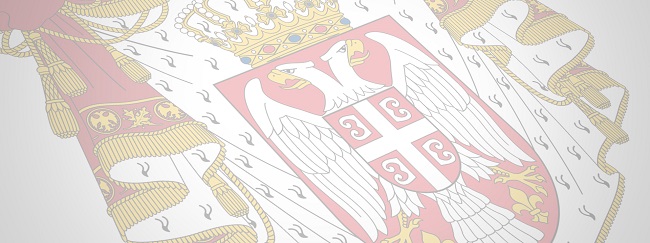
Source/Photo: www.predsednik.rs |
|
|
| Selaković in New York with 28 foreign ministers on economic successes of Serbia and K&M situation - 9/25/2021 |
|
The Minister of Foreign Affairs of Serbia, Nikola Selaković, has stated that in New York he introduced foreign ministers of 28 countries to economic success of Serbia but also to the situation in Kosovo and Metohija, which he also discussed with the Russian Minister of Foreign Affairs, Sergey Lavrov, who told him that we could count on the support of the Russian Federation, with regards to Serbian interests in K&M.
Summarizing results of his visit to New York within the session of the UN General Assembly, Minister Selaković says that one of the last meetings was with Minister Lavrov, which was their third meeting in the previous nine months.
The Serbian Foreign Minister says that he surely used this opportunity, too, to introduce Minister Lavrov to the latest events in northern Kosovo and Metohija, the situation of the dialog between Belgrade and Priština and very clear and unambiguous attitude of President Aleksandar Vučić regarding the continuation of the dialog and subsequent events in K&M.
“We discussed the principled support of the Russian Federation, which is constantly present not just in Moscow, Belgrade, in the field, but also here in the East River, by the delegation of the Russian Federation as the permanent member of the UN Security Council. Of course, we will continue to maintain this type of dialog. What Minister Lavrov said was that we could count on the support of the Russian Federation in future with regards to our interests in K&M”, highlighted Minister Selaković.
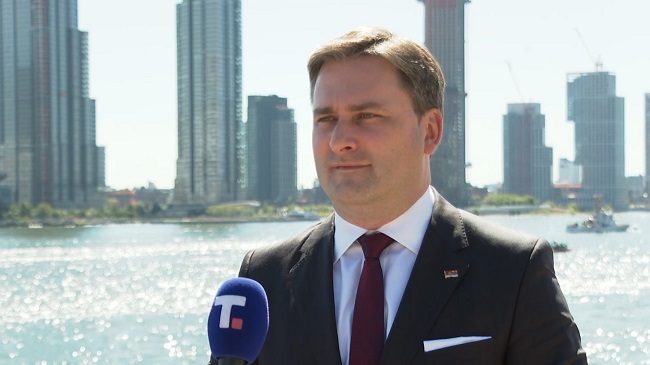
He said that he had had the opportunity in New York to hold 33 meetings, of which 28 with ministers of foreign affairs, whom he had introduced also to topicalities related to the latest events in Kosovo and Metohija, but also to our principled position regarding the observance of the international public law, territorial integrity and sovereignty.
Minister Selaković said that his colleagues at the meetings had praised the substantial and fantastic success of Serbia in the consolidation of the economic sphere and transformation of what had been on the edge of collapse and economic disaster seven years before to the fastest growing economy in Europe, which Serbia was in the past two years.
He said that most of his interlocutors had supported our reforms and expressed great respect toward what President Aleksandar Vučić and Serbia had done in the previous period.
Many of them, says the Serbian Foreign Minister, showed great interest in the manner in which Serbia organized the figth against Covid 19.
“It was a great pleasure and pride to represent the Republic of Serbia in all these meetings. Many of my colleagues confirmed their arrival to Belgrade to the Conference on 11th and 12th October, which is dedicated to the 60th anniversary of the foundation of the Non-Allied Movement”, said Minister Selaković.
He emphasized that it was not just the evidence of how much they had cared to come to Belgrade to the conference, but also to see and witness the Serbia which after several decades of attempts to fight different challenges rose to its feed, was economically consolidated and turned towards its traditional friends.
“That is a great deal and our country will surely during October be one of the spots on Earth of greatest importance for multilateralism, for cooperation among the countries which share the same values, the values entered into the UN Charter and which are based on the promotion and fight for peace, equality, observance of the international public law and rights of every country to pursue its path to happiness and better and more ordered society in compliance with the wishes of its population”, said Minister Selaković.
He said that the Minister of Foreign Affairs of Azerbaijan, Jeyhun Bayramov, would come to Belgrade to the conference on the occasion of the Non-Allied Movement adding that we had strategic cooperation with Azerbaijan and frequent contacts.
“We agreed to realize as soon as possible after the Belgrade conference his bilateral visit to Serbia”, added Minister Selaković.
He said that it had been agreed to intensify the cooperation and finalize the agreements which should be signed and after that realized when the meeting of Serbian President Aleksandar Vučić and Azerbaijan President Ilham Aliyev took place.
Minister Selaković says that the Ministry of Foreign Affairs had recently received its sector for economic diplomacy and there were great expectations from it and one of the tasks was to deepen the cooperation with Azerbaijan. |
|
|
| Pristina seriously jeopardised regional stability - 9/25/20251 |
|
Prime Minister Ana Brnabic warned today that Pristina has seriously jeopardised local and regional stability after sending heavily armed special units to the north of Kosovo who are exerting ` against the peaceful Serbian population.
Brnabic spoke at the general debate of world leaders, as part of the 76th session of the UN General Assembly in New York.
We bring the Prime Minister's speech in its entirety:
Mr. President,
Mr. Secretary General,
Excellencies,
Ladies and gentlemen,
I have the great honor to address you today on behalf of the citizens of the Republic of Serbia.
Esteemed Excellencies Mr. Abdulla Shahid, Mr. Volkan Bozkir and Mr. António Guterres, I would like thank you for the active engagement, dedication, and leadership you have shown during these difficult times for the United Nations and all of humanity.
Serbia shares your conviction and we remain fully committed to supporting your efforts.
This year, we come together at a decisive moment in our history.
Covid-19 has shaken our foundations to the core.
At the same time, we are increasingly witnessing and experiencing effects of climate change.
And, finally, we are seeing significant shifts in global partnerships and alliances, trade wars between traditional partners and allies, protectionism instead of openness and free market, and overall uncertainty at an unprecedented scale.
Some of the pressing and extremely emotional issues that we have locally, in the Balkans, are still unresolved and while we are trying – and Serbia is especially dedicated to this – to change the future by working together and creating alliances, through initiatives such as the Berlin process or Open Balkan, others are trying to disrupt these processes, and instead of focusing on the future, they want to recreate the past – whatever the cost of that may be.
But, let me start with COVID:
COVID-19 pandemic has exposed critical weaknesses in the architecture of global governance. It has threatened to erase the progress many nations have achieved in recent years.
It has placed nations at a junction between isolation and collaboration, between panic and hope, between chaos and order.
The pandemic questioned some of the basic tenets of the open and cooperative international order.
Global exchanges, international communication, cross-border trade have all seen a vast decrease.
Curfews, restrictions on freedom and lockdowns of entire societies have created uncertainty in many segments of the individual lives of our citizens or – for that matter – our own individual perception of what freedom in today’s world even means.
For Serbia, this pandemic threatened to undermine everything we have been doing for the past 7 years, to crush all of the results and accomplishments of difficult reforms we initiated in 2014, and to propel us back to the times of high unemployment, rising public debt, uncontrollable deficit, and overall desperation.
Much as in any other country, COVID-19 has tested our nations’ resiliency and, this time, unlike during the global financial crisis – which was of much more limited scope and incomparable in consequences to COVID-19 pandemic – Serbia stood strong.
The reforms we undertook in the pre-COVID times made us more resilient than ever.
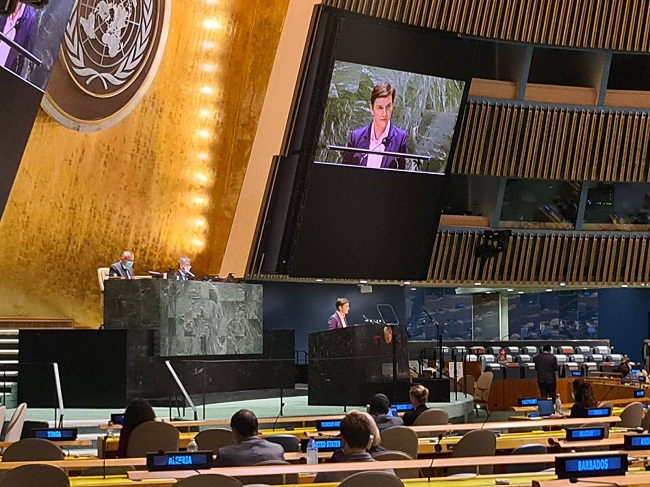
The fiscal consolidation, the budget surplus we had, efficient and predictable investment environment, became a lifeline that saved us from a recession during the pandemic and one that ensured we could support our citizens and our economy during these, most difficult of times.
Despite the effects of the crisis, Serbia has managed to preserve financial and economic stability. In 2020, we recorded a decline in GDP of only 0.9% – one of the best results in Europe. Our public debt remained below 60% of our GDP, average salary continued to grow by almost 10%, while despite the pandemic the number of people employed increased by over 3%.
The recovery in this year has been stronger than expected – our GDP will grow approximately 7%, and perhaps even stronger.
Prior to the pandemic, we have opened our borders to investment, technology, and ideas, and we managed to create peaceful and stable environment that allowed us to pursue rapid domestic transformation, with innovation and knowledge-based economy as the foundation.
The innovative advances we had made allowed us to diversify our capabilities when the virus hit – through e-Government, online education and digital textbooks, or central software system for a successful vaccination rollout.
We invested heavily in health infrastructure and strengthened the health system in order to respond to the current crisis, eternally grateful to the health care workers for their dedicated struggle.
Our decision to put geopolitics aside, and people at the center of our policies, is the reason we were able to acquire vaccines quicker than most other nations.
We did not discriminate between manufacturers, did not care whether vaccines are from the East or from the West, but chose to negotiate with all vaccine manufacturers deemed safe by regulators. This openness gave us the ability to purchase vaccines from around the world, giving our citizens the unique freedom to choose which vaccine they prefer.
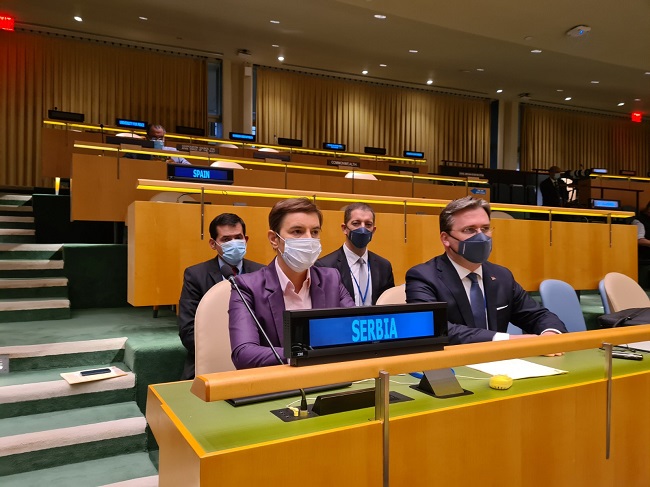
Excellencies,
Serbia believes in solidarity between nations, multilateralism and helping others when in need.
Since the beginning of this year, we have made it our mission to support our neighbors, and all those in need, with COVID-19 vaccines and we have also allowed foreign nationals to come to Serbia to receive the vaccine which will protect their lives.
In total, Serbia has donated or allocated over a million doses of vaccines – of which 230.000 doses to the region; 300.000 doses for foreign nationals which came to Serbia to get vaccinated; and additional 570.000 doses to countries of Africa and Asia.
We will keep doing so, to the greatest extent possible, and until COVID-19 is behind all of us.
That is why we have also taken steps to acquire the technology to produce at least two types of COVID-19 vaccines to help improve global access so we can all be safe and victorious.
However, as stated by dignitaries of some of the largest nations during this General Assembly, there are other pressing issues that all of us need to keep addressing without any delay and in a bold manner – and that is climate change.
Serbia has redoubled its efforts to make our country safer and cleaner for its citizens, and by doing so, contribute to the fight against climate change and for environmental protection.
We are strongly committed to the implementation of the sustainable development goals and the Paris Agreement on Climate Change. We are committed to global efforts and will continue to work actively to meet our obligations under the UN Framework Convention on Climate Change.
We are about to submit our revised Nationally Determined Contributions to contribute to this critical global effort. We have already announced our intention to reduce greenhouse gasses for at least 33.3% compared to 1990, and 13.2% compared to 2010, which we are currently incorporating into our energy and climate strategic documents.
We work strategically on planning and investments in this sector. These investments are extremely expensive, requiring years and decades of commitment and a systemic approach - but we are clearly set on the path of this transformation.
Ladies and gentlemen,
Of all the challenges we face, the most worrisome for Serbia is the maintenance of peace and stability in the southern Serbian province of Kosovo and Metohija.
For more than two decades, we have been constantly drawing international attention to the problems that non-Albanian population is facing in Kosovo and Metohija. Physical safety, respect for and protection of human rights, especially of minority communities, are far from satisfactory.
We are now witnessing a constant increase in the number of attacks targeting Serbs, their property and religious heritage in Kosovo and Metohija.
To illustrate, there were 55 such incidents in 2014, 62 in 2016, 71 in 2020, and 100 since the beginning of this year. The total number of attacks in 2020 has already been surpassed by June of this year.
According to the UN, Kosovo and Metohija is still the territory with the least number of returnees (internally displaced Serbs) of all post-conflict areas in the entire world!
I will give you just a few examples to depict how life of Serbs in Kosovo and Metohija looks like.
On the 11th of May the house of Radoje Pumpalović, 81-years old returnee to Kosovo in the village of Dubrava, in Istok municipality, was attacked. This was the 5th attack on him in the same year. Again… he is 81 years old.
Since June 2021, multiple attacks were carried out against Dragica Gašić, 59-years old woman, the first Serb returnee in Đakovica after 22 years since the end of the conflict. Attacks include stoning of her apartment, banning her from shopping for food in the local store and petitions by civil society organization demanding her eviction from the city.
On 2nd of July, in the village of Gobulji near Vučitrn, a group of Albanians attacked 13-year old Nikola Perić. The attack occurred when he was returning home from the school playground with three friends.
Attacks on Serbian medieval churches, monasteries and monuments in Kosovo and Metohija, make them some of the most endangered cultural heritage sites in Europe.
Monastery Visoki Dečani was recently listed, by Europa Nostra, as one of the 7 Most Endangered Heritage Sites in Europe in 2021. The Advisory Panel of Europa Nostra noted that Dečani is the only monument in Europe under robust military protection for a continuous period of 20 years, although it constitutes a monument of ultimate historical and cultural importance for Europe and the world.
This spiral of violence occurring in Kosovo and Metohija culminated at the beginning of this week. On the pretext of enforcing new license plate rules, Priština dispatched heavily armed special units to the north of the province. This is yet another brutal violation of the Brussels Agreement, and this irrational show of force has ignited a major crisis. It disrupted the supply of food and medication to Serb communities in the north of the province. Local Serbs who peacefully gathered to protest this measure were met with tear gas and police brutality, thus seriously threatening local and regional stability.
Despite of all the challenges and daily provocations, Serbia remains strongly committed to finding a compromise-based solution that will ensure lasting peace and stability.
Dialogue and the implementation of the agreements reached – are the only proper way to resolve all open issues.
However, almost 9 years after reaching the Brussels Agreement, as the 1st agreement on normalization between Belgrade and Priština, the establishment of the Community of Serb Municipalities – the backbone of this agreement – has not yet even begun.
I would like to appeal, once again, to the international community, and especially the European Union, as the guarantor of the Brussels Agreement, to firmly insist that the Provisional Institutions of Self-Government in Priština start implementing all of the agreements reached.
The Republic of Serbia, by defending its sovereignty and territorial integrity, at the same time defends international law, the UN Charter, legally binding UN Security Council Resolution 1244, and the supreme authority of the Security Council when it comes to the preservation of international peace and security.
We attach special importance to the activity of the UN mission in Kosovo and Metohija and expect it to continue to implement its mandate in the Province in accordance with this resolution.
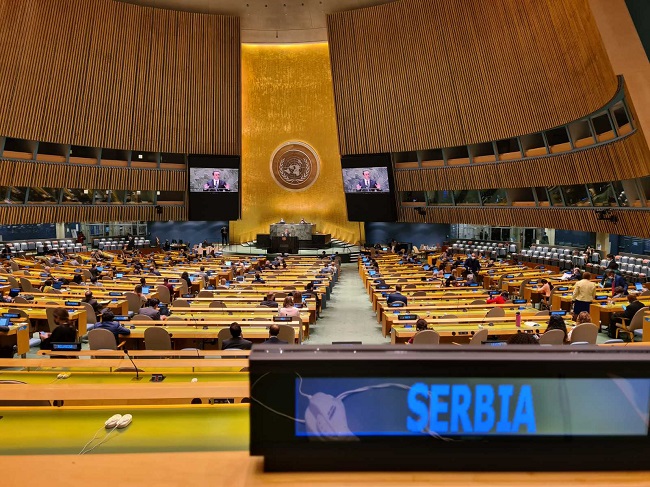
Dear friends,
Our generation shares the common destiny of the modern world, which is becoming increasingly complex in terms of geopolitics, technology, health, climate. In the face of these challenges, Serbia will continue nurturing international partnerships, on a predictable and transparent basis.
We will continue pursuing the rule of law reforms on our EU path, which is our strategic foreign policy goal. We see this as inseparable from achieving sustainable peace, stability and prosperity.
We will host, together with the Republic of Azerbaijan as the current chair of the Non-Aligned Movement, a commemorative high-level event marking the 60th anniversary of the First Non-Aligned Movement Conference, which was held in Belgrade in 1961. We are very much looking forward to hosting our friends from all parts of the world in Belgrade in October this year.
We will further enhance cooperation across the Balkans, through the Open Balkan initiative and Berlin process, by opening borders, harmonizing differences, and further integrating our region.
In conclusion,
Over the past 7 years, Serbia has been transformed: we sparked an economic revival, created opportunities for young people, cultivated a tech boom, and improved Serbia’s position abroad. The progress we have made has allowed Serbia to better face and survive the pandemic.
The world now faces a turning point. The recovery from COVID-19 and sustainable reconstruction will not proceed if issues, new and old, are not handled by joint forces and collaborative international actions.
This pandemic taught us one important lesson: unless all of us are safe, no one is safe – so we can either win together, all of us – regardless of how rich or poor, large or small, from Europe, Asia, Africa, America or Australia, or fail together.
But, if anything, the COVID-19 pandemic, as well as the issue of climate change, should have taught us to stand together.
Thank you.
Source: www.srbija.gov.rs
|
|
|
| Prime Minister Brnabic at Global COVID-19 summit organised by White House - 9/22/2021 |
|
Prime Minister Ana Brnabic participated today at the Global COVID-19 summit, organised by the White House, which was opened by US President Joseph Biden.
The video messages are attended by a large number of world leaders and officials of international organizations, including UN Secretary General Antonio Guterres, European Commission President Ursula von der Leyen, British and Canadian Prime Ministers, Boris Johnson and Justin Trudeau, German Chancellor Angela Merkel and many others.
In the message, the Prime Minister pointed out that Serbia was among the first European countries to procure a covid vaccine, and that she was the first European Prime Minister to receive the vaccine.
Thanks to years of investment in digitalisation and development of eGovernment, we have managed to organise a complicated and complex vaccination process very efficiently and in a way that it is focused on citizens, she explained.
However, as she added, from the very beginning we were aware that this is not just a matter of our citizens and only our struggle. In the fight against the COVID-19 pandemic, we are all safe or no one is safe.
That is why, in addition to procuring vaccines for our citizens, we donated vaccines to the citizens of the Western Balkans, but also to other countries, she reminded and specified that Serbia donated 230,000 doses of vaccines to the region, we vaccinated foreign citizens in Serbia with approximately 300,000 doses and set aside we have 570,000 doses of vaccines for countries in Africa and Asia.
Brnabic mentioned that Serbia has already started the production of covid vaccine from one manufacturer, and that it will start production from another by the end of the year, because in that way we want to help and support all people and countries that need vaccines.
This is a pandemic in which we will either win together or lose together, but we must fight together, the Prime Minister repeated.
That is why Serbia supports the goals of this global summit, she emphasised, and expressed her gratitude to the United States of America and President Biden for organising the summit and supporting joint efforts in the fight against the COVID-19 pandemic.
Vaccines are the only way out in the fight against the pandemic, concluded Brnabic.
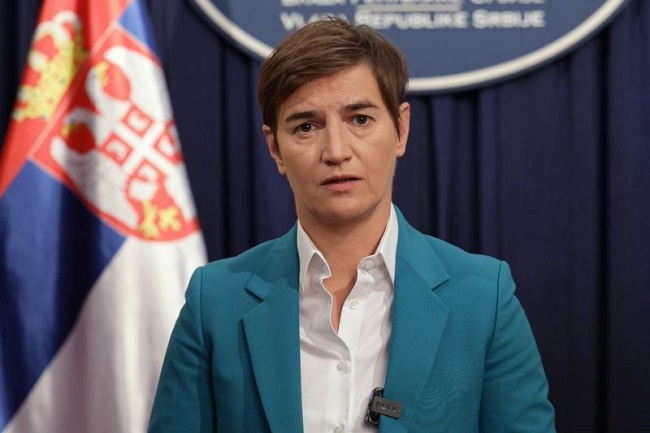
Photo: www.srbija.gov.rs |
|
|
| Marking the Remembrance Day of all Serbs who died and were expelled in the armed operation "Storm" 8/5/2021 |
|
The President of the Republic of Serbia, Aleksandar Vučić, attended the marking of the Remembrance Day of all the victims and expelled Serbs in the armed operation "Storm" and said that Serbia remembers!
"Today, when we remind ourselves again of what happened in August 1995, the terrible pogrom, the expulsion of more than 250,000 Serbs, the exodus and ethnic cleansing, we, at the same time, and finally, remind ourselves of who we are, what we are, where we come from and where we are going. Thank you all for being here together tonight and for showing how much we love our people", said President Vučić, adding that we will not forget any of the things that the Krajina people had to go through.
"For us, these are not just terrible numbers of victims", said President Vučić and emphasized that Serbia will not forget.
"History has never been rewritten like today. That is why I want to remind us all not only of what others have done to us, not wanting us to exist, but also of what we have done to ourselves, just as if we ourselves did not want to exist", said the President, noting that we must never again allow Serbia to forget its silent heroes.
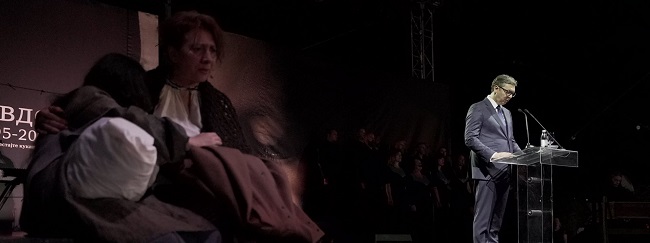
President Vučić emphasized that we must never again cover our eyes, ears, and mouths in front of something that truly was a pogrom and the downfall of all humanity.
"Pretending that this is not true, avoiding saying it, is a crime not only against the victims, but also against ourselves, every living Serb, people from Krajina, as well as Serbia and its future", said President Vučić and underlined that people can stand up straight and live with themselves and the others without hesitation, fear and doubt, only if they remember.
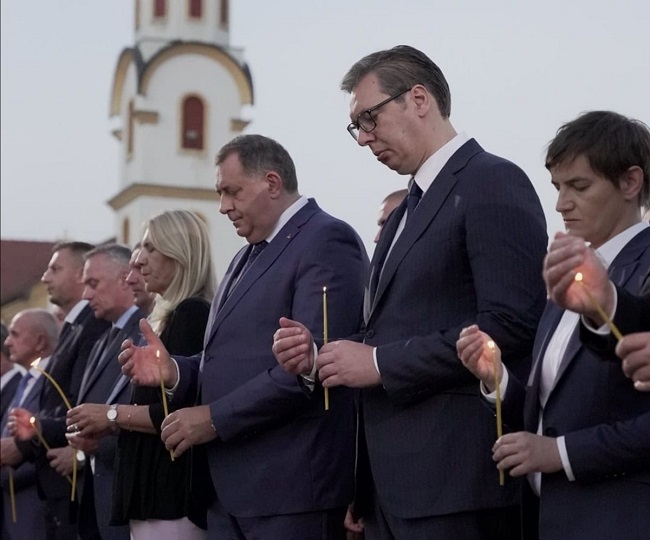
President Vučić pointed out that Serbia must fight for peace and cradles with children, as well as that not remembering annuls and erases us from the history and the future, depriving us of the right to tomorrow.
"Our mission is a happy future for us and for the new generations! Today's Serbia is based on a clear identity and a culture of remembrance", said President Vučić and reminded that everything that had been neglected for decades had been done, and that a strong Serbia has become the master of its own destiny.
"Eternal glory to you, Serbian martyrs who perished in the "Storm" and all other pogroms. Your children are in their Serbia, taken care of, loved and successful. Sleep peacefully, Serbian falcons, the future of your children is our vow", concluded President Vučić and thanked everyone who showed that night how much they love their country and that Serbia remembers.
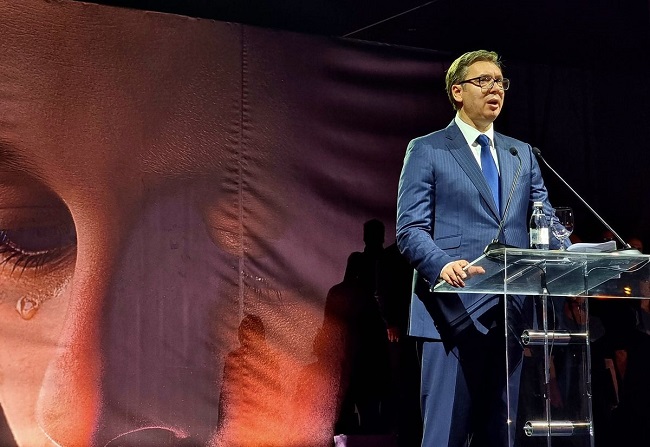
Sorce: www.predsednik.rs
Photo: www.predsednik.rs
|
|
|
| 75 apartments in Nis handed over to refugee families from Croatia and B&H - 8/2/2021 |
|
The Minister of Foreign Affairs, Nikola Selaković, attended the ceremonial handing over of keys to 75 apartments today in Nis, intended for refugee families from Croatia and B&H within the implementation of the Regional Housing Programme (RHP) in Serbia.
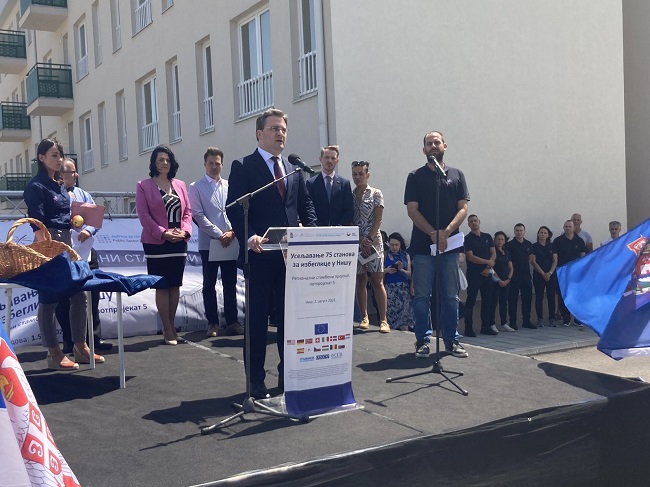
In his address, Selaković expressed his satisfaction that he had the opportunity to share the joy with 75 families who, after 25 years, will get their own roof over their heads, wishing them a lot of happiness, joy and beautiful moments in their new homes.
"The city of Nis has become richer for 75 wonderful, hard-working, diligent, honest families, our people who did not flee to Serbia of their own free will, but out of a desire to simply protect their dear lives", Selaković said, thanking the city of Nis for its help in the implementation of this project.
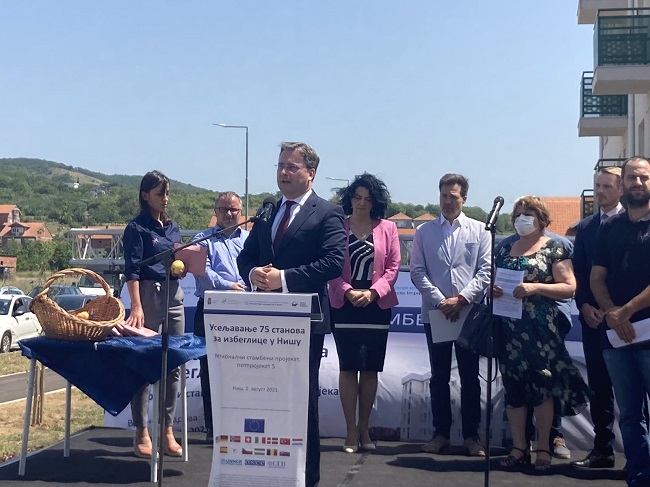
Minister Selaković, who is also the President of the Commission of the Government of Serbia for the coordination of the permanent integration process of refugees, said that 5,825 housing solutions have been allocated so far within the implementation of the RHP. He stated that 2,004 packages of construction materials, 305 prefabricated houses, 1,575 rural houses with a garden and 1,941 housing units were awarded.
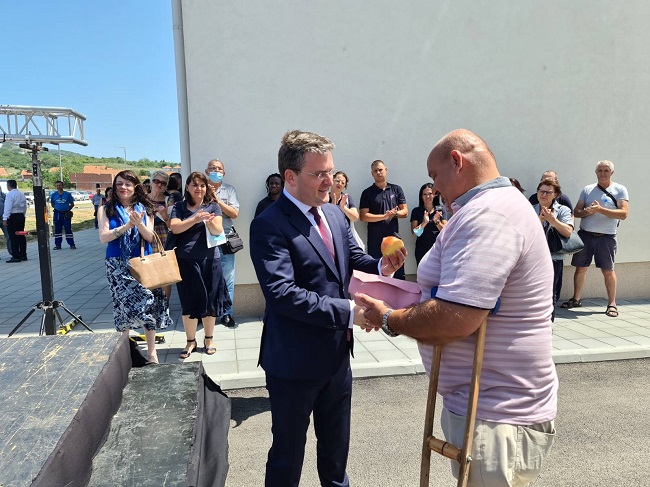
The Minister said that the apartments that are being moved in today were built within the sub-project 9 of the RHP, emphasizing that its total value is around 1,500,000 euros.
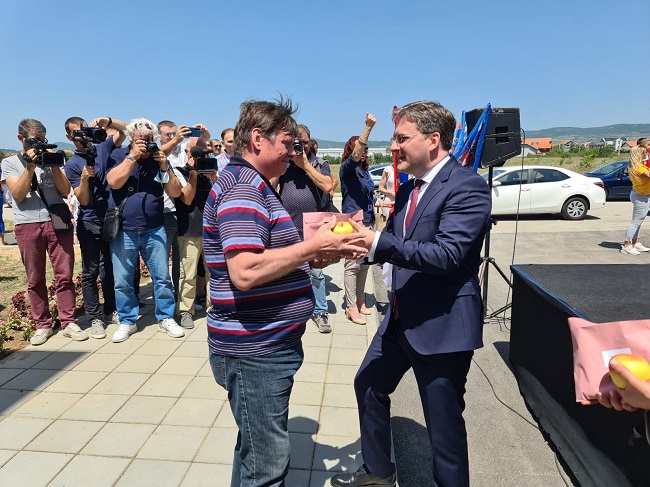
"With this project, Nis will solve the issue of finding homes for our people who fled from the territory of B&H and Croatia to Serbia", said the minister, adding that it is also necessary to find an adequate solution for the issue of internally displaced persons from Kosovo and Metohija.
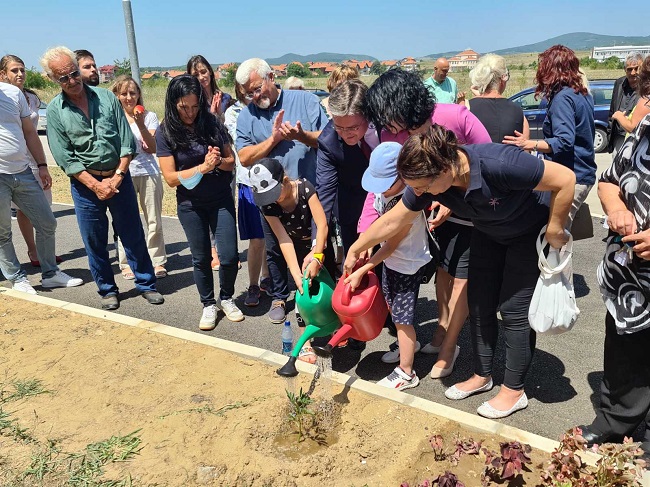
The Minister thanked the EU, the largest donor to the RHP, and other bilateral donors participating in the aforementioned program. He also emphasized the importance of the Council of Europe Development Bank and especially thanked the Commissariat for Refugees and Migration for its engagement in the implementation of this program.
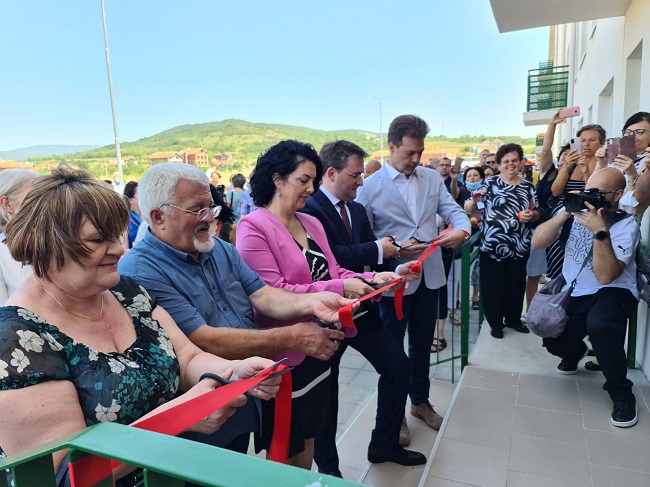 |
|
|
| President Vučić: We have decided – our goal is the EU, but China is an important partner - 7/22/2021 |
|
We have decided – our goal was and remains the EU, Serbian President Aleksandar Vučić said in an interview with the German daily "Handelsblatt", adding that there is no alternative for Serbia, but also stressing that China is an important partner for Serbia, and that the task of the state is to take care about the interests of its citizens.
He thus answered the question of what Serbia will choose once it has to choose between close relations with Beijing or the EU. Vučić emphasized that Serbia wants to become a full member of the EU.
"We are connected by history, common culture, EU members are already undoubtedly our most important partners", he explained and added that the trade exchange between Germany and China is 3,000 times higher than between Serbia and China, and, as he noted, even despite that, Serbia's business operations with China are portrayed as a problem.
To the statement that the German Chancellor Angela Merkel did not congratulate the 100th anniversary of the Communist Party of China, and that he did so, he replied that Serbia is not Germany, but a small country. On additional insistence on what Serbia will do if it has to choose between the EU and China, he underlined that Serbia has already decided, that its goal was and remains the EU membership.
"Our biggest investors are from the EU. The EU accounts for 67% of our trade while 17 percent of the trade is with countries of the region that are all on the way to the EU. We cannot survive without the EU", he added.
"But can we do a lot of good things with China – of course. And we do that, just like Germany does", Vučić pointed out, and to the remark that the quality of the Silk Road projects was being criticized, primarily because of Chinese workers, he answered that the quality of roads or bridges, which Serbia is building with China, is excellent.
"We give jobs to those who submit the best offer to us. That is why I tell Europeans who criticize Chinese projects in our country – offer us a project for one euro more and you will get it", he emphasized.
In that regard, he pointed out that Serbia is building a railway to Northern Macedonia with 600 million euros of EU aid, stating that that offer was better than China's.
"There is often talk of a 180-kilometer railway to Budapest through the territory of Serbia, which is financed by China. But the railway that is being built with the help of the EU from Belgrade to the northern Macedonian border is twice as long and no one is talking about it. It is all too political", he stated.
Asked whether he welcomes the plans of the EU and the USA regarding an alternative initiative to the Silk Road, Vučić said that he supports everything that brings advantages to our region.
"The Chinese want to expand their presence everywhere, but many processes in the West are, frankly, more efficient and without problems. We still have a lot to learn from the West, but we are getting there", Vučić said.
He pointed out that China was an important partner for Serbia and added that when the consolidation of state finances began in 2014, our country received good conditions from China for development projects.
He also stated that a competition for a copper mine was announced in eastern Serbia, at the request of the EU, that no European company had made an offer for six months, and that it had then been taken over by the Chinese.
"Our job is to take care of our people", he said.
He reminded that the Serbian economy grew by 52% in eight and a half years, which for the EU means that Serbia could be a strong member and engine for the entire region.
Explaining how Serbia is developing so well economically, he pointed out that Serbia has an excellent workforce, which speaks English, that society and administration are digitalized, and that it has the most flexible labor law in Europe, as well as consolidated public finances.
He reminded that previously the public debt was at 78% of GDP, and that today it has been reduced, thanks to the strong growth of the economy, to 52%.
"We can afford to give investors an incentive to come", he added, emphasizing that Serbia offers investment assistance, but that, for example, subsidies were not the motive for the arrival of the development center of the company Continental.
He pointed out that, five or six years ago, only Serbia started using the dual education system in this region, which Germany, Switzerland and Austria also use, that tens of thousands of people are in dual education, and that this is appreciated by foreign investors, who, in addition, can work closely with universities as well.
Germany, he stated, is the most important trade partner and the largest investor.
We started with the arrival of small textile companies from Turkey, and now primarily large German companies are coming. Today, 71,000 people work in German companies in Serbia", he explained.
Vučić said that the European perspective is very important for investors, stating that Nidek, Toyo Tires or Mitsubishi are coming from Japan to Serbia because our country is on a stable European path.
Asked if he believes that Serbia will become an EU member in the foreseeable future, he said that he does not complain.
"It is certain that if we had received 45 billion euros of EU aid, we would have been much further economically. Instead, we received 1.6 billion euros from the EU. We are used to achieving our successes on our own", said Vučić.
The President of Serbia reminded that in Croatia, salaries used to be 2.2 times higher than in Serbia, and today they are only 1.7 times higher.
"We are closing the gap with our own efforts. If we were to become a member of the EU, then we would certainly not ask for the biggest subsidies", he assures.
He said that the Serbian path follows the German path to Europe, and that Serbia wants a fair chance.
"I believe Merkel's words. She is at the end of her term and I would not have to praise her anymore. But she gave us stability, freedom of travel to the EU, helped us with the migrant crisis in 2015, and asked the Minister of Economy Altmeier and others to work closely with us", he reminded.
Asked if there were any indications that the new German government would support Serbia in the same way, Vučić expressed confidence that it would be the same.
"I know Armin Laschet, I talked to him while he was the Minister-President of North Rhine-Westphalia. He is very smart and understands the situation in the Balkans, and he will certainly continue Merkel's policy towards our region as the new chancellor", he added.
Vučić also expressed his belief that Russia, if Serbia's accession to the EU were concretized, would not react similarly as in the case of Ukraine, as this is a sovereign decision of Serbia.
To an additional question in this regard, Vučić pointed out that whenever he met with Vladimir Putin, and there were 18 or 19 meetings, he told him that he was grateful for the traditionally close friendship with Russia, but also that Serbia is on a clear course towards the EU.
"He asked if it was our choice and I answered that EU membership is indeed our goal", he added.
When it comes to "Kosovo", Vučić emphasized that a compromise is needed regarding this issue.
"Only in this way can there be sustainable peace. Serbia wants peace, me as well. Let's stop with the madness of the past. Only then can the whole region become the engine of new growth for Europe", said Vučić.
Source: Tanjug
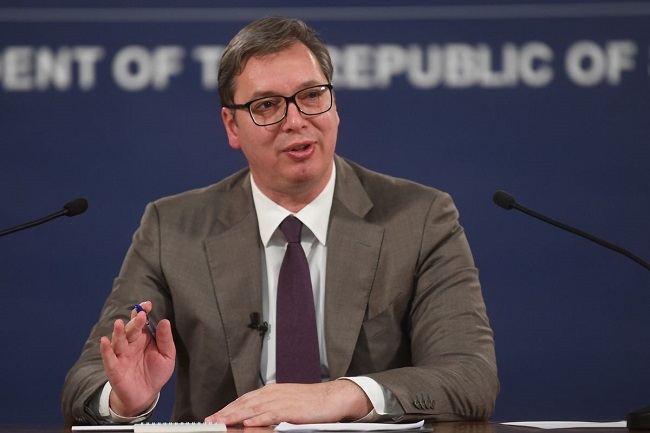
|
|
|
| Serbia has achieved great success in the field of digitalization - 7/20/2021 |
|
The Prime Minister of the Republic of Serbia, Ana Brnabić, stated at a gathering dedicated to digitalization and the IT sector, which was held in New York, that since she became Prime Minister, she is most proud of Serbia's success in the field of digitalization.
Brnabić, who is on a two-day visit to the United States, said that when she was elected Minister of Public Administration and Local Self-Government in August 2016, she wanted to do everything to change the public administration and what bothered her as a citizen.
She stated that, when she took office as Prime Minister, she knew what her priorities were and that first of all, digitalization needed to be raised to a higher level, that the education reform was supposed to begin, as well as work on strengthening the economy.
I believed in a country that believes in its people, because the Serbian people are creative. From 1 June 2017, we started working as an e-Government, i.e. we started exchanging data electronically, said the Prime Minister.
According to her, our citizens no longer had to go to, say, the Tax Administration, and since then, the public administration has exchanged 50 million documents, which means that citizens did not have to go from office to office for 50 million papers.
Brnabić pointed out that she is proud of what has been done in the field of education since she became the head of the Government, specifying that in September 2017, programming was introduced as a compulsory subject in primary schools.
Nobody believed that we could do that, but we cooperated with the private sector and some social organizations and we succeeded. At the moment, we are far ahead of numerous countries in Europe and the world, said the Prime Minister.
The Prime Minister pointed out that she was most proud when the cornerstone was laid for the science and technology park in southern Serbia, noting that so far, our country has four science and technology parks.
She pointed out that Serbia has since become one of the most successful countries in the world in the field of technology, and that according to some parameters, it is among the ten countries in the world, or among the five, assessing that this is proof that the country can change quickly.
Answering the question about vaccination, the Prime Minister emphasized that our country has never seen it as a geopolitical issue, but as a health issue.
According to her, Serbia talked with producers from both the East and the West and was among the first European countries to sign agreements with the company Pfizer-BioNTech and Sinopharm.
Unfortunately, many countries have viewed this issue as geopolitical. It did not matter to us, as long as the vaccines were safe, the Prime Minister emphasized and added that this was not the end of Serbia's success, because good organization was also needed.
Brnabić explained that the organization is another important thing in vaccination, because it is a logistically very difficult process, adding that, with the help of digitalization, success has been achieved and that everything we did in the previous years has paid off.
She stated that Serbia quickly established a system through which citizens could express interest in vaccination against the coronavirus and choose which vaccine they wanted to receive, as well as to be informed by a message when to go and get vaccinated.
Now I can log in on my phone, to see how many people have received the vaccine, how many more have registered, so that the effects of digitalization are obvious. We have made everything very efficient and easy for our citizens, the Prime Minister explained.
Answering the question of what she can tell other countries of the world about how to progress faster, Brnabić said that it is important to invest as much as possible in digitalization and education.
You need to teach children how to think, not what to think. Not all children will become IT experts, but what they can learn is an algorithmic way of thinking and how to make decisions, she said.
The Prime Minister mentioned investing in high-speed internet and providing infrastructure for start-ups as an important thing for progress, because more and more economies will be based on start-ups and innovations, emphasizing that people should be helped to start companies and implement their ideas.
Speaking about social networks, she pointed out that fake news has become the biggest problem on these networks and that it will remain so for some time.
This is the biggest challenge I face as Prime Minister, especially during the corona virus pandemic, she said, adding that social networks are also a great opportunity for politicians to communicate with citizens.
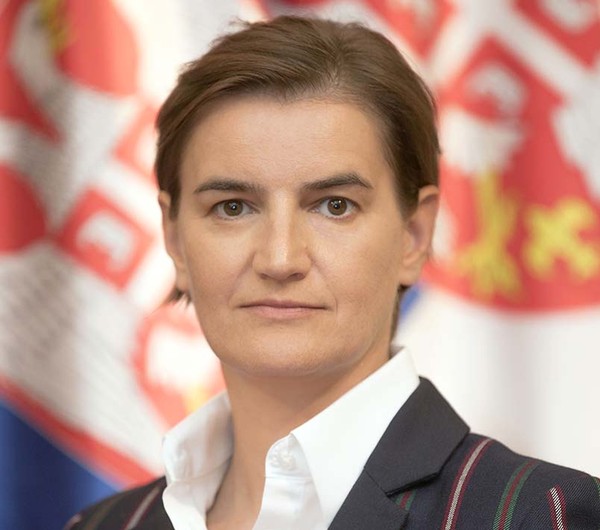
Source: www.srbija.gov.rs
Photo: www.srbija.gov.rs |
|
|
| Selaković invited representatives of members of the NAM to gather in Belgrade in October - 7/13/2021 |
|
The Minister of Foreign Affairs of the Republic of Serbia, Nikola Selaković, spoke at the Ministerial Conference of the Non-Aligned Movement (NAM) today and on that occasion sent an invitation to the representatives of the members to gather in Belgrade on 11 and 12 October, when the 60th anniversary of the first Conference of the Non-Aligned Movement held in Belgrade in 1961 will be marked.
Selaković informed the participants of the conference that Serbia would organize this important jubilee of non-aligned countries together with Azerbaijan – which is currently chairing the NAM.
In his address, Selaković reminded that the former Yugoslavia and President Tito, as co-founders of the Movement, gave their contribution to creating a vision of a different world, and that Serbia, as one of the successors of Yugoslavia, is proud of that part of its history.
"The spirit of non-alignment is based on equality, freedom, lasting peace, sovereign equality of states and peaceful cooperation of all peoples, and these values are also woven into the state-building foundations of Serbia", the minister said.
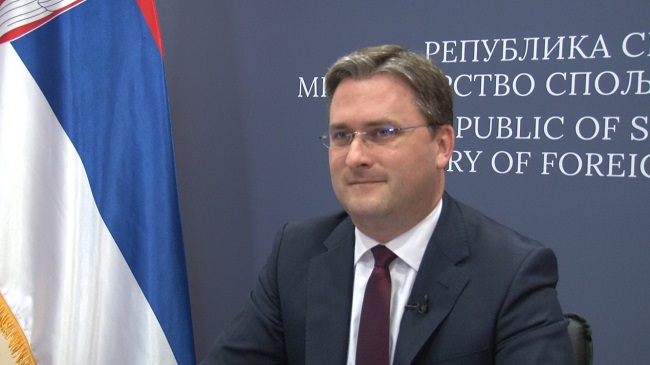
Selaković said that the Non-Aligned Movement throughout its history has been a beacon of freedom to all those who sought the right to existence and prosperity in a world that was often ruled, not by the force of law, but by the law of force. He assessed that even today we find ourselves in times of serious global challenges in which the Movement has the opportunity to reaffirm its libertarian traditions and commitment to a world of equals.
"Serbia, as a militarily neutral and politically independent state, will give its most sincere contribution to such goals of the Movement. We hope that by strengthening mutual ties and cooperation, as a group of states and peoples that share the same values and interests, we will strengthen our common capacity to face the challenges of tomorrow. And the challenges are already before us", Selaković pointed out.
The Minister emphasized that international law should be a pillar of political and security architecture of the world, and added that Serbia respects the commitment of the members of the Movement towards the goals and principles of the UN Charter.
"Many members of this movement are aware that by insisting on international law, they are working in their own favor and in favor of preserving regional and global stability," the minister pointed out.
Selaković also said that the COVID-19 pandemic clearly showed that inequality, lack of solidarity and empathy in the world have become very obvious in the roughest way.
"Serbia is eternally grateful to all the countries which, such as Azerbaijan, helped us in difficult times. We later extended that chain of solidarity by making vaccines available, not only to our citizens, but also to others in the region. We supported our neighbors with the belief that solidarity is the best investment in a common future", the minister concluded.
|
|
|
| Serbian children from the region visit the Ministry of Foreign Affairs of Serbia - 7/8/2021 |
|
The head of Serbian diplomacy, Nikola Selaković, welcomed the participants of the Summer Camp for Serbian children from the region at the Ministry of Foreign Affairs today, and on that occasion, he introduced the young guests to his work and the way the Ministry functions.
Selaković expressed satisfaction that the participants of the Summer Camp are visiting the capital of Serbia and said that Belgrade is the capital of all Serbs.
"Here on these walls, you can see the continuity of our statehood in the new century. You can see what stands behind us, so that we may know what we are fighting for and what we will one day leave to our children. I have two sons and one daughter, and everything I do, I do for them and the future of every child in Serbia and every Serbian child", said Selaković.
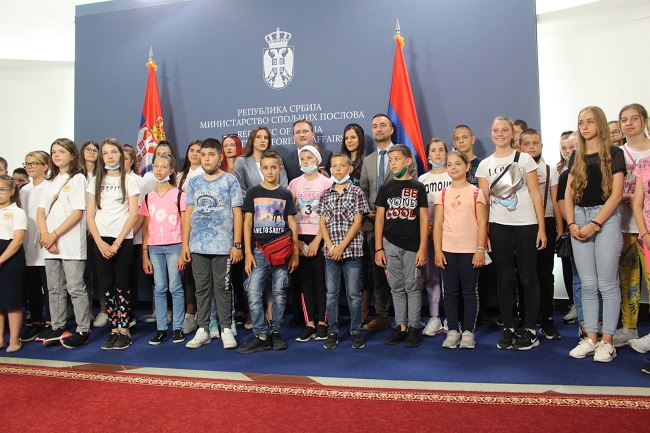
The Minister pointed out that Belgrade is a city that is rapidly changing and growing, a city to which everyone from the Balkans is flocking, and wished Serbian children from the region to come and get to know Serbia as often as possible.
Speaking about the sights of Belgrade, Selaković singled out the Temple of Saint Sava and underlined that we are all very proud of the most beautiful Orthodox temple in the world.
"I want you to see Novi Sad and Nis, Vrnjacka Banja, Studenica, Drvengrad, Zlatibor, Sombor, Vrsac, to see the beautiful places that exist here and what wonderful country our Serbia is", said the minister.
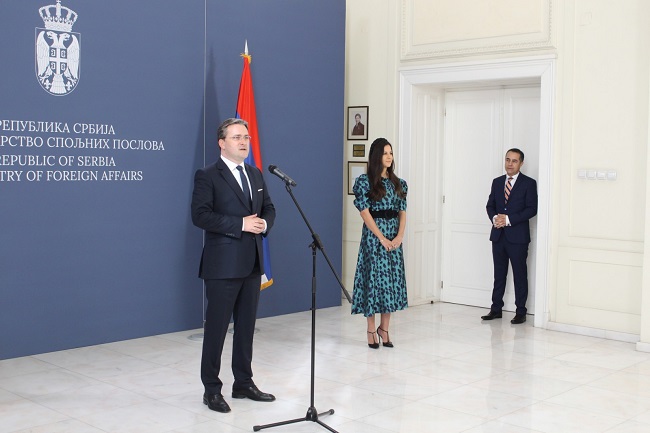
Selaković especially referred to the inscription on children's T-shirts "We are learning Cyrillic", and said that it was important for them to learn other languages as well, but not to forget our Serbian language and the Cyrillic alphabet.
"If we Serbs do not keep the Cyrillic alphabet, no one will save it for us", the minister said.
Noting that this group of participants in the Summer Camp also includes children from Dalmatian Kosovo, Selaković said that Serbs cannot escape from their Kosovo, nor Kosovo from them.
"It is a part of our soul, our identity and genetic code, it is the motive of our struggle and the life of our nation", the minister emphasized.
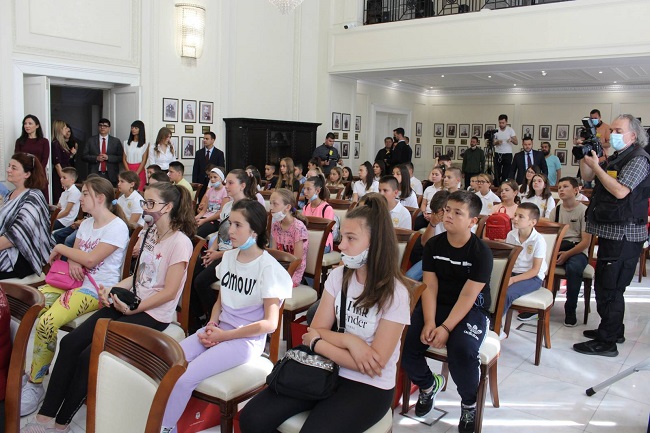
Also, the Minister expressed satisfaction that participants of the Summer Camp had their priest with them and emphasized that this shows that where the Serbian church survives, our people also survive.
Selaković wished the organizers of the Summer Camp to bring as many children as possible to Belgrade, saying that the Ministry of Foreign Affairs will always have their doors open for them.
"I want you to be exemplary citizens in the country in which you live, but also to love and protect your Serbian family, Serbian Orthodox name, Cyrillic alphabet and our Serbian language", Selaković concluded.
The wife of the President of Serbia, Tamara Vučić, also welcomed the participants of the Summer Camp.
"Apart from being good students and fulfilling your obligations, each of you also has a hobby. Someone is involved in sports, music, singing, folklore, or acting. If I have to give you advice today, it is to keep your hobbies. They will help you in the period of adolescence to direct that strong energy in the right direction", said Tamara Vučić.
She also wished that they would bring good emotions and beautiful experiences back from Serbia, which would always bring them back here.
The group that visited the Ministry included 44 children, aged 7 to 14 from Uzdolje, Vir, Kula Atlagic, Islam Grcki, Raducic, Nunic, Zadar, Bribir, Djevrske, Ridjan, Odzak, Bosansko Grahovo, Drvar, Bosanski Petrovac and Glamoca.
Today, the children had the opportunity to visit the Museum of Serbian Diplomacy, which is located in the building of the Ministry of Foreign Affairs, where they were introduced to the works of great Serbian diplomats.
The Summer Camp for Serbian children from the region is being organized in the period from 4 to 9 July 2021 in Novi Sad and Belgrade. The organizers of the camp are Member of Parliament Sanja Lakić and Duško Ćutilo, director of the Provincial Fund for Assisting Refugees, Displaced Persons and for Cooperation with Serbs in the Region.
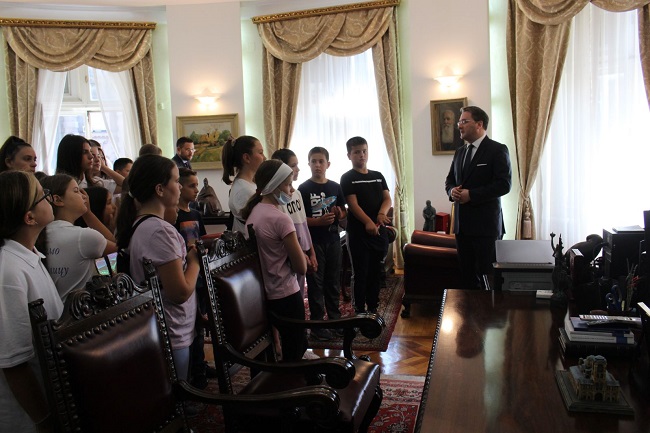 |
|
|
| Serbia strongly supports Berlin Process - 7/5/2021 |
|
Prime Minister Ana Brnabic participated today in the online Summit of Leaders of the Berlin Process, which discussed the concrete results achieved during its seven-year term, plans for the next period and initiatives aimed at providing support Western Balkans on its way to the European Union.
The focus of the summit was on building a common regional market related to four fundamental freedoms: free movement of people, goods, services and capital, for which the Action Plan was adopted in November last year, and from which the region would have special benefits.
The summit said that the transport and energy infrastructure has been expanded in recent years and connected to the roads of the European Union, and praised the implementation of the agreement on the abolition of roaming fees in the Western Balkans, which began this month.
An important project of the process is the Regional Office for Youth Cooperation (RYCO) in order to connect and build understanding and tolerance in the region.
The activities of the Regional Cooperation Council (RCC) and the Secretariat of the Central European Free Trade Agreement (CEFTA) were also praised for their efforts to implement the Common Regional Market Action Plan.
Assessing that the Berlin Process is firmly based on the fundamental belief that the economy of the Western Balkans is part of Europe, German Chancellor Angela Merkel pointed out that it greatly contributes to stability and connecting the Western Balkans region, which is also in the interest of the European Union.
In her address today, Prime Minister Ana Brnabic thanked German Chancellor Angela Merkel for her strong support and active approach to regional cooperation.
Thanks to the support of Germany and Chancellor Merkel, but also to the internal initiatives of the representatives of Serbia, Albania and North Macedonia, the Prime Minister explained, the implementation of the Action Plan will enable further expansion of economic and trade cooperation in the region, which will make it more attractive for foreign investors.
Brnabic pointed out that Serbia strongly supports the Berlin Process, not only for the purpose of economic development of the region, but also as an idea of connecting and unifying the Western Balkans and its approach to the European Union.
She concluded that support in the region was particularly visible through solidarity with neighbours during the pandemic and assistance with vaccines and medical equipment.
The summit, opened by German Chancellor Angela Merkel, was attended not only by representatives of the region, but also by Slovene Prime Minister Janez Jansa, European Commission President Ursula von der Layen, Austrian Chancellor Sebastian Kurz, French President Emanuel Macron, Italian Prime Minister Mario Draghi and Polish Prime Minister Mateusz Jakub Moravjecki and Secretary General of the Regional Cooperation Council (RCC) Majlinda Bregu.
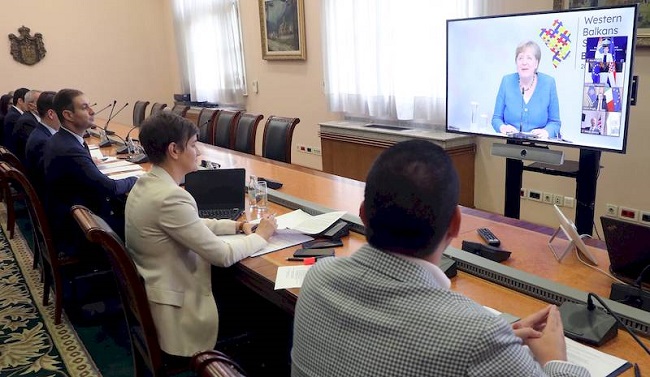
Source: www.srbija.gov.rs
Photo: www.srbija.gov.rs
|
|
|
| President Vučić participates in the Mini Schengen conference - 6/29/2021 |
|
President of the Republic of Serbia Aleksandar Vučić participated today via a video link in the conference "Mini Schengen" with the Prime Minister of the Republic of Albania, Edi Rama, and the Prime Minister of the Republic of North Macedonia, Zoran Zaev. The officials discussed further steps in regional cooperation, as a process vital to the progress of the Western Balkans and the European path as a whole.
The interlocutors agreed that the countries of the Western Balkans need membership in the European Union, but also that the European Union needs the Western Balkans just as much since the region is surrounded by EU borders and the countries aspiring to membership share common European values.
The President of Serbia and the Prime Ministers of Albania and North Macedonia have expressed the wish that the four European freedoms - the movement of people, goods, services and capital, begin to be implemented as soon as possible throughout the region, and that in this context they will provide full support to the regional common market at the Berlin Process Summit to be held on the 5th July.
"We are aware that only by working together and accepting regional cooperation within various regional initiatives such as the common market, regional Schengen, green corridors or the Berlin Process, can we bring our economies closer, increase the well-being of our people and bring in large investments that would otherwise not be possible for any of us individually", is one of the joint conclusions of this video conference.
The interlocutors agreed to meet in Skopje on July 29th to review the progress in the implementation of existing initiatives and projects and to sign additional agreements between the three countries related to the implementation of the Berlin Process commitments, as well as cooperation and assistance in the event of natural disasters and relief measures for trade, export and import.
"We call on and encourage our colleagues from the region to sign and implement similar agreements, so that the vision of a common political and economic space across the Western Balkans would soon, through the single market, become an important part of our citizens' daily lives," said the Serbian President and Prime Ministers of Albania and North Macedonia.
The interlocutors pointed out that despite the delays in the enlargement process, they will continue to try to identify new ways, policy areas and financial instruments for all three countries to increase their contribution to Europe, strengthen ties with the European Union and gradually integrate the region into the single European market.
Speaking on the Green Agenda, the interlocutors issued a joint call to the European Union and the United States to join countries across the region to support the development of projects that could be invested as soon as possible to improve environmental protection and increase the widespread use of renewables as part of the EU Economic and Investment Plan implementation and the Green Agenda for the Western Balkans.
"Our countries have a huge potential for sustainable growth and development of this sector. We will ask for practical support to find out which projects can improve our region in terms of renewable energy sources for our citizens and for the green energy future of the EU ", said the interlocutors during the "Mini Schengen" video conference and concluded that only regional connecting, with the EU support, can contribute to the overall stability and progress of the entire region and Europe.
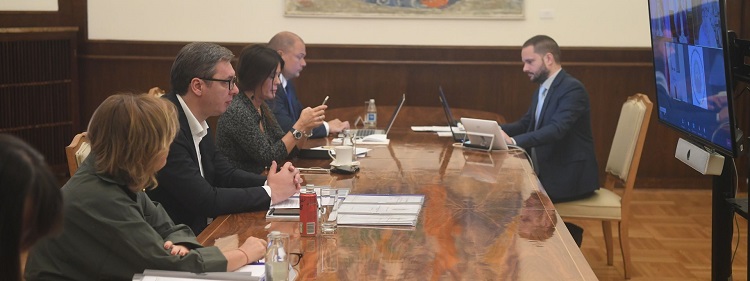
Source: www.predsednik.rs
Photo: www.predsednik.rs
|
|
|
| Minister Selaković with future defense attachés of the Republic of Serbia - 6/25/2021 |
|
The head of Serbian diplomacy, Nikola Selaković, talked today with future defense attachés at the Serbian Ministry of Foreign Affairs, who are preparing to go abroad.
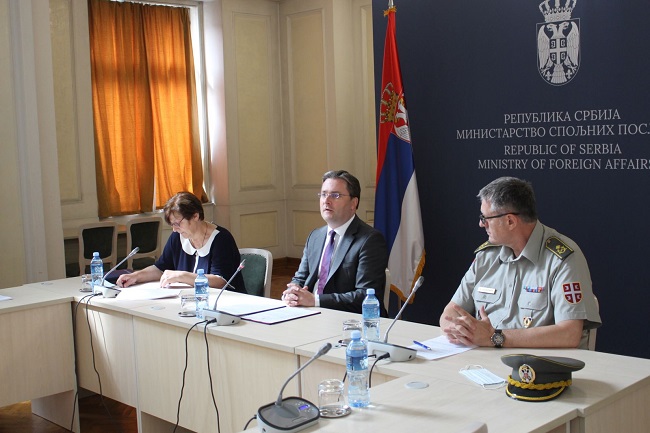
Minister Selaković wished the future defense attachés of the Republic of Serbia success in their work, emphasizing that they will have the full support of the Ministry of Foreign Affairs and our diplomatic and consular network in the performance of their work.
Selaković briefed a group of future defense attachés, who will serve in Montenegro, the United Kingdom, Germany, Croatia, Belgium, Italy and Romania, on Serbia's foreign policy priorities.
Minister Selaković paid special attention to explaining the directions of our regional policy, emphasizing that preserving regional stability and promoting economic cooperation are priority goals.
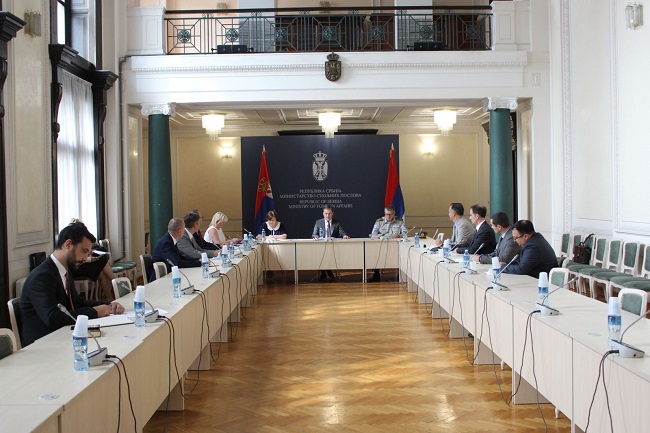
|
|
|
| Meetings in Antalya successful for Serbia - 6/18/2021 |
|
Prime Minister Ana Brnabic stated today, after the plenary meeting of the South-East European Cooperation Process (SEECP) held in Antalya, that the Joint Declaration, the Strategic Document for South-East Europe and the annual report of the Council for Regional Cooperation were unanimously adopted at this meeting.
Speaking to the press, Brnabic said that the plenary meeting was marked by two things – the fact that even Pristina voted for all documents, although Kosovo is marked in them with an asterisk, and also thatPresident of the interim institutions in Pristina Vjosa Osmani referred to the Brussels Agreement at one moment.
Brnabic underlined that in the Strategic Document for South-East Europe, in every place where “Kosovo” is mentioned, it is marked with an asterisk and a footnote.
It is also interesting that at one moment Osmani invoked the Brussels Agreement and said that according to it, asterisk is not put every time, but only the first time “Kosovo” is mentioned.
We see now that the Kosovo side invokes the Brussels Agreement when it suites them, and when it doesn’t suit them, then the agreement doesn’t exist. That is why I hope they will finally return to the Brussels Agreement, first and foremost in order to form the Community of Serb Municipalities, the Prime Minister underlined.
That has been constructive from them today and totally contrary to everything it could be heard in the Pristina parliament – that they would not allow the adoption of such documents.
Brnabic said that the meeting with Turkish President Recep Tayyip Erdogan was very good and that Erdogan once more sent an invitation to Serbian President Aleksandar Vucic to visit Turkey.
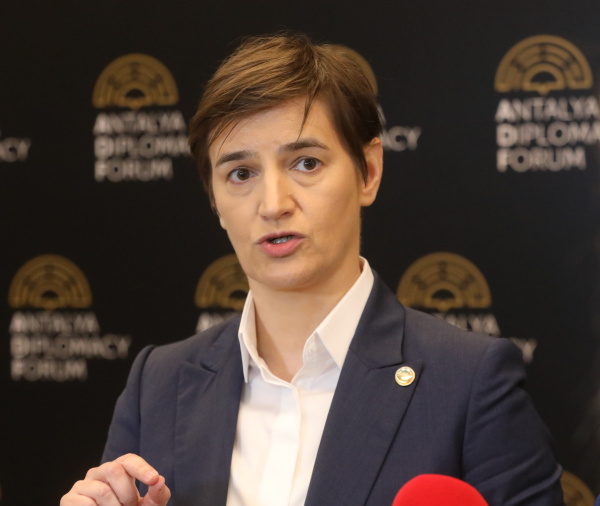
www.srbija.gov.rs |
|
|
| Selakovic: Cooperation and good-neighbourly relations are in the general interest of the entire region - 6/17/2021 |
|
Minister of Foreign Affairs of Serbia Nikola Selakovic took part today in Antalya in the Meeting of Ministers of Foreign Affairs of the South-East European Cooperation Process participants.
Selakovic underlined that the key foreign policy and strategic goal of our country was to achieve full membership of the European Union.
“I hope that the European Union will continue to support the process of integration of SEECP participants into the EU, which will, I am confident, bring lasting stability and prosperity to the region and help the consolidation and development of Europe as a whole”, Selakovic said.
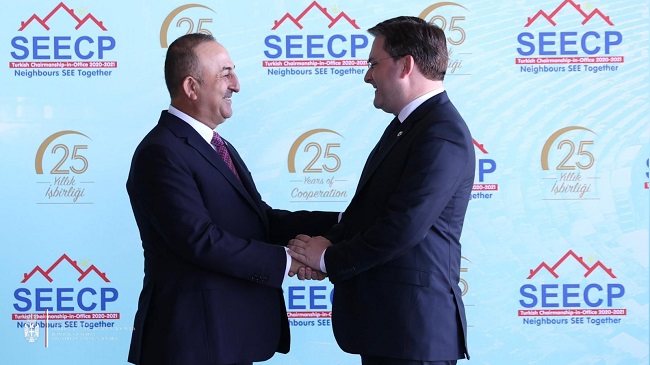
The Minister pointed out that peace and stability had no alternative, representing the guiding star on the path of our region towards the European Union. Furthermore, he emphasized in particular that Belgrade was determined to resolve all open issues through dialogue and in good faith - as a responsible and predictable partner, and in line with the principles of international law.
“We need to make sure that what is agreed upon is also respected and fulfilled on the ground later on, because our agreements primarily concern the well-being of our peoples, but they also reflect who we are and what kind of future we want”, the Serbian Foreign Minister said.
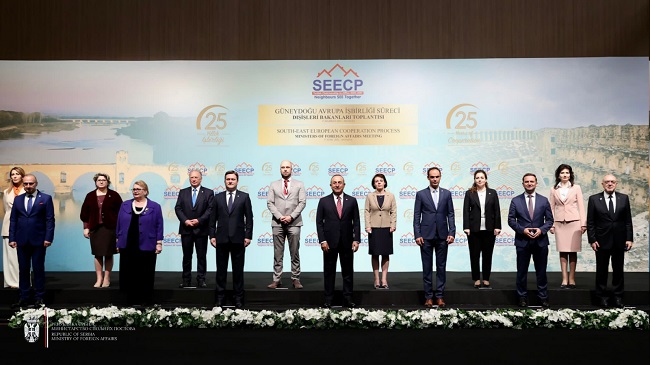
Selakovic stated that Serbia devoted full attention to the promotion of regional cooperation and good-neighbourly relations, stressing that the strengthening of economic ties within the region also contributed to the relaxation of existing political relations.
“Through participation in various formats we have committed to undertake the necessary reforms and promote regional cooperation in numerous areas, and among them, as particularly important and being in the general interest of the entire region, I would like to underline the joint infrastructure projects in the transport and energy sectors”, Selakovic said.
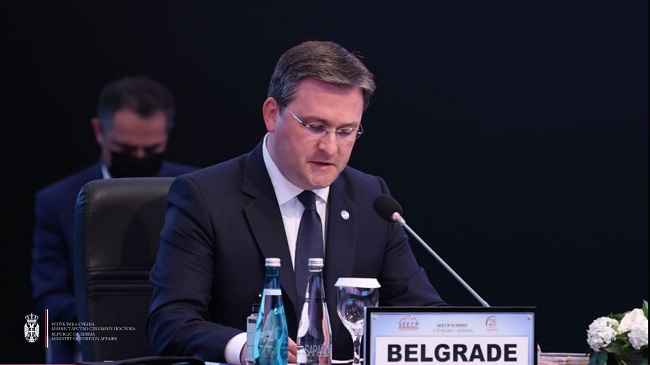
As concrete positive results of regional cooperation, the Minister underlined the Central European Free Trade Agreement (CEFTA), the Western Balkans Fund, the Regional Youth Cooperation Office, the Southeast Europe Transport Community, the Western Balkans Chamber Investment Forum, and the signing of the "Agreement on the Price Reduction of the Roaming Services in the Western Balkan region".
Selakovic commended in particular the establishment of “Green Lanes” in our region during the coronavirus pandemic, while pointing out that it was now necessary to enable their extension to border crossings with neighbouring EU member states.
The Minister also stated that Serbia welcomed the Common Regional Market Action Plan and added that this document was largely based on concrete proposals stemming from the initiative launched by Serbian President Aleksandar Vucic in cooperation with the Prime Ministers of Albania and North Macedonia.
In addition, Selakovic emphasized that Serbia had demonstrated its commitment to enhancing regional cooperation with its neighbours in the region - by sending vaccine shipments and enabling vaccination in Serbia,“So far, Serbia has sent 120,000 vaccines to the region and vaccinated around 65,000 citizens from countries of the region on its territory, which means that we have provided a total of around 200,000 vaccines for our neighbours”, the Minister said.
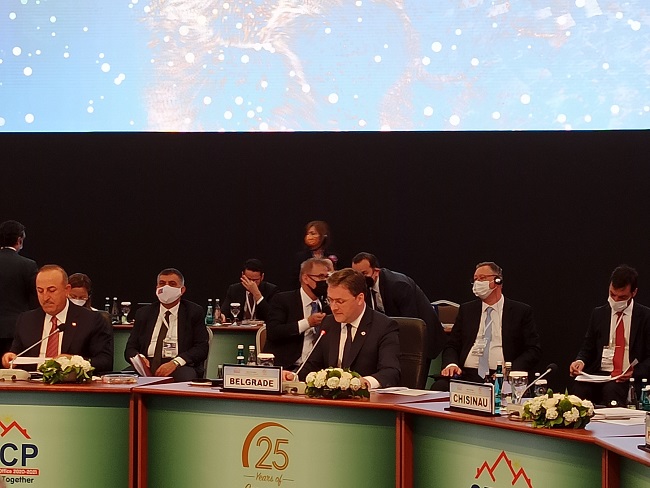
In his statement, the Head of Serbian diplomacy also touched upon the importance of the Regional Cooperation Council which, as a pivotal regional initiative, provided concrete results and contributed to achieving economic progress and deepening cooperation, and said that he expected that the implementation of the South East Europe 2030 Strategy, once it is adopted, would benefit our region.
Selakovic congratulated Turkey on its successful chairmanship and wished Greece every success as the upcoming chair.
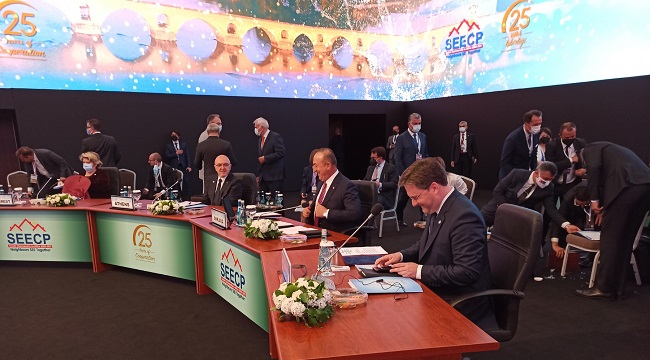 |
|
|
| Address by the President of the Republic of Serbia at the session of the United Nations Security Council - 6/9/2021 |
|
Dear Mr. President, ladies and gentlemen, members of the delegations
I would point to a few ongoing issues in my speech that refer to the competences of the Mechanism, namely, the possibility of serving the sentences passed by the ICTY and Mechanism in the Republic of Serbia, with the current practice of disabling early release of the sentenced persons as well as obligation of the Mechanism regarding protection of sentenced persons.
The second part of the speech will be dedicated to issues that are opened by the six –month Report on the work of the Mechanism by Mechanism President Mr. Agius and Report by the Chief Prosecutor Mr. Serge Brammertz, especially regarding current cooperation of the Republic of Serbia and the Mechanism.
The third part of my speech, and I noticed that in many of your statements even today, is going to be the view of Serbia on everything that took place in The Hague Tribunal and what the Tribunal verdicts brought to people in the region of former Yugoslavia.
The Republic of Serbia has initiated before the Security Council, on several occasions, the issue of possibility of serving sentences passed by the ICTY and Mechanism in the Republic of Serbia. Beside the efforts to move this issue from “square one”, not a single response was obtained from the Security Council. The majority of persons that are serving their prison sentences are citizens of the Republic of Serbia, and it comes naturally that the Republic of Serbia is interested in enabling them to serve their prison sentences in the Republic of Serbia.
ICTY and the Mechanism are making references to the Security Council as an institution in charge of dealing with this issue.
I am ready to reiterate here the readiness of the Republic of Serbia to take over obligations and liability for executing prison sentences that the Tribunal or Mechanism passed on the citizens of the Republic of Serbia, under the monitoring of the Mechanism and full respect for the authority of the Mechanism regarding early release.
Mr. President
A particular problem that we are facing with is disturbance by the judicial institutions established in the territory of Kosovo and Metohija, which is within Serbia and which is under Interim Administration of the UN. We are witnesses of attempts of retrial for two citizens that are serving their prison sentences for which they had already been trialed before the ICTY. More concretely, in previous period there was an attempt for hearing of Nebojša Pavković and for obtaining extradition of Vlastimir Đorđević.
I urge on the Mechanism and Security Council to prevent attempts of violation of the principle ne bis in idem, a civilization principle that was confirmed in Article 7 (1) of the Statute of the Mechanism and to disable retrials for persons already convicted by the ICTY, particularly to make sure that it is not done in the territory which is under interim UN administration.
Mr. President,
President of the Mechanism (Mr. Carmel Agius), apart from the regular Report, delivered also on 11 May 2021 a letter to the President of the Security Council, whose subject is the alleged omission of the Republic of Serbia to apprehend and turn over to the Mechanism Petar Jojić and Vjerica Radeta, indicted of contempt of court, claiming that in this way the Republic of Serbia was acting contrary to its obligations towards the UNSC Resolution 1966 (2010) and asking the Security Council to take measures in order to ensure that Serbia meets the alleged obligations in accordance with the Mechanism Statue and Resolution 1966.
The point of the argumentation of the President of the Mechanism comes to that that the Republic of Serbia has the obligation to deprive of liberty and extradite to the Mechanism its citizens accused of contempt of court, regardless of the nature of accusation, circumstances under which such an order was made and consequences that might result from its implementation.
It is about accusations that do not refer to sever violations of international humanitarian law and that are related to a case before the ICTY, which ended in 2018 (Vojislav Šešelj case), by acquitting the defendant in the first instance, and upon the Prosecutor’s complaint the defendant was declared guilty and sentenced to a 10-year imprisonment, which was covered by the time he spent at the UN Detention Unit.
Judge Agius states that Serbia ignores its obligations in accordance with the Resolution 1966 (2010). Quite the opposite- the Republic of Serbia takes seriously its obligations regarding cooperation with the Mechanism. After the warrant for apprehension and extradition of the two persons accused of contempt of court to the Mechanism had been introduced, the Higher Court in Belgrade established that assumptions for their apprehension and extradition to the Mechanism had not been met. The decision is founded on the rules of international law and domestic law of the Republic of Serbia and it is mandatory for holders of the executive power in the Republic of Serbia.
I would remind here that the first decision of a sole judge (Aydin Sefa Akay, 12 June 2018), that was acting in this case was that the criminal prosecution of V. Radeta and P. Jojić for alleged contempt of court was to be forwarded to the judicial authorities of the Republic of Serbia. In procedures that followed, the argument of the alleged unwillingness of the witnesses to cooperate with the judicial authorities of the Republic of Serbia was stated for the first time, and the decision on deprivation of transferring the case to the jurisdiction of the judicial authorities of the Republic of Serbia was based on the respective argument.
The Republic of Serbia expressed its readiness to take over the court procedure against Petar Jojić and Vjerica Radeta on several occasions and it provided appropriate guarantees. Additionally, the Republic of Serbia fully recognizes and accepts the obligation of the Mechanism to monitor trials that were transferred to national courts with the help of international and regional organizations, as well as to take measures envisaged by Article 6 of the Statute of the Mechanism.
I would remind here that the Republic of Serbia extradited to the tribunal all the persons indicted by the Prosecutor’s Office, and among the respective mostly highest political, military and police officials; it enabled presence of vast number of witnesses, delivered extensive documentation. Obligation of the Mechanism, in accordance with the Resolution of this Security Council, is to take measures that enable transfer of cases to national justice system. In previous practice, 13 cases were transferred to Bosnia and Herzegovina, 2 to Croatia and only one to Serbia.
The last but not the least, I want to remind all of you here of the fact that France- of course as a sovereign and independent country- upon request for apprehension and extradition of Florence Altman for publishing documents and contempt of court, refused the request for extradition, with an explanation that it does not extradite its citizens. For far smaller offence you ask as to extradite our citizens Jojic and Radeta, showing both the distrust to Serbian justice and judiciary and Serbian State, as well as a fact that the rule from ancient Rome is still valid – quod licet lovi non licet bovi.
It does not harm to underline that high-level officers and politicians were not trialed for crimes against Serbs, and that crimes against Serbs remained unsanctioned before ICTY and Mechanism. Let me remind you, just as an example that Ademi and Norac case for ferocious crimes against Serb civilians in Medački Džep was left to Croatian justice institutions. Proven crimes against Serbs, like those of Ramuš Haradinaj, Naser Orić, then Ante Gotovina and other indicted for military operation “Storm” that led to a complete ethnic cleansing of Serb population in the big part of today’s Croatia, resulted before the ICTY in acquittals. Many horrible crimes against Serb civilians that were committed in the territory of Bosnia and Herzegovina, Croatia and the Autonomous Province of Kosovo and Metohija, and that resulted in ethnic cleansing, simply were not the subject of interest of the ICTY.
What’s very important and not to leave anything unclear, Serbia is a country that condemns all crimes and all criminals who perpetrated them in the region of former Yugoslavia. However, it is interesting that despite often criticism Serbia is the only one that speaks openly and condemns crimes perpetrated by Serb nationals, while in other regional countries they do not speak at all about crimes that representatives of those nations committed against members of Serbian people.
And I want to emphasize once again here in front of you that Serbia condemns terrible crime in Srebrenica and extends its deepest condolences to the families of all killed in that massacre. And there are no “buts” about the respective.
Nevertheless, we are here to analyze results and penal policy of ICTY and the Mechanism and it was such that it has never gained trust among Serbian people, no matter where they live. And not because we Serbs do not acknowledge crime committed by some of our compatriots, but because The Hague Tribunal, with exceptions, was judging only to Serbs and in all three territories of former Yugoslavia- Croatia, Bosnia and Herzegovina and Kosovo and Metohija, which some of the SC Member States see and name of course, contrary to law and legal norms and UN Resolutions, as an independent state. I would try to plastically prove to you how The Hague justice was tailored even though I know that it will not come to understanding of many of you, but to me it is important because of the history, facts, and school books that will be made in accordance with the facts.
Namely, Serbs were sentenced to totally 1138 years of imprisonment, and to 8 life imprisonments. At the same time, The Hague Tribunal did not sentence a single Croat for crimes against Serbs, neither in actions Medački Džep, nor Flash and Storm. How politically cunning it was done in the Tribunal, and all wrapped in the form of law and justice. Prosecutors of The Hague Tribunal chose on purpose three military and political leaders of Croats, Bosniac Muslims and Albanians, on all three mentioned territories, committed against Serbs. – Ante Gotovina, Naser Orić and Ramuš Haradinaj. It is interesting that following the same pattern, the same pattern, this injustice was shared. Namely, all of them were sentenced in the first instance procedure, with the exception of Ramuš Haradinaj, because not a single witness survived. Gotovina was sentenced to 24 years’ imprisonment in first-instance procedure, while by a mysterious decision of the second instance council and 3:2 judge ratio, the verdict was changed to acquittal. Naser Orić, for crimes against Serbs, was also sentenced in first instance verdict, but by a mysterious decision of the second instance court, and again 3:2 ratio decision was an acquittal and he was set free of any liability. Let me reiterate, all witnesses in process against Ramus Haradinaj, either committed suicide or were killed under very, very strange circumstances.
Let me conclude, I do not want to believe that someone wants to say that there had been no crimes against Serbs, but judging by the verdicts of The Hague Tribunal, no one- absolutely no one- is responsible for those crimes.
Nevertheless, we in Serbia will show responsibility and we will fight for peace, stability and reconciliation in the region.
We ask UN Security Council Member States to help us with rational and pragmatic approach and respect for international law and not by attempts of further humiliation of Serbia. Serbia is a small country, with proud and courageous people, the one that gave the biggest sacrifice during the WWI and WWII; people who wants to leave in peace with their neighbors. And when I am asking you for this, I do not think I am asking for too much.
At the very end, Serbia is the fastest growing country of the Western Balkans region and we cannot progress unless our relations with neighbors, friends and other countries are good, solid and better. That is why- despite the selective justice that was applied in The Hague Tribunal- we will be open for any dialogue, any kind of cooperation and we will look towards the future and not towards the past. And I have only one message for the citizens of Serbia and citizens of Serbian nationality in the entire region- keep your heads up, neither Serbia nor Serbian people are convicted of anything and it is up to us to work even more diligently, to open factories and to fight for our children and our future.
Long Live Serbia!
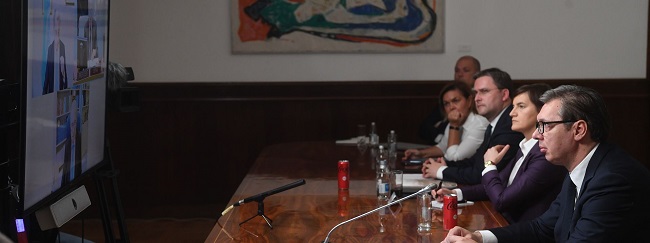 |
|
|
| Minister Selaković presented the new e-Consulate service - 5/20/2021 |
|
A new service of the Ministry of Foreign Affairs "e-Consulate" was presented in Belgrade today, intended for foreign citizens who apply for a visa and aspire to come to Serbia to work.
On that occasion, Minister of Foreign Affairs of the Republic of Serbia Nikola Selakovic said that this service was one of the indicators of good development of our country, which, as he pointed out, was becoming a magnet for serious foreign companies, which brought a large number of workers from other countries to work in Serbia.
"Not to be pretentious, but completely realistic, this service represents a turning point in the functioning of our system. E-Consulate and digitalization of the procedure for issuing work visas for foreign citizens who want to work in Serbia, is the first electronic service offered by the Foreign Ministry, and I can promise you that this is indeed our first, but by no means the last e-service", Selakovic emphasized.
The Head of Serbian diplomacy pointed out that "e-Consulate" reflected the modernization of an extremely important segment of the activities of diplomatic and consular missions of Serbia, and that we were actually talking about something that was essential for the further development processes of our country.
The Minister recalled that, when the President of the Republic visited the construction site of the Moravian Corridor, he was told that some construction works were delayed because Bechtel company was not issued work visas on time.
“The moment we saw that and heard the President, I alerted the services in the Ministry. We were surprised, as we knew that the issuance of visas in Turkey had a good dynamic, and then we determined that it was actually workers from Bangladesh who applied for a visa through our Embassy in India, where we have a problem with staff shortage”, the Minister explained.
As he added, this is a demanding and laborious task, each of our employees had to receive the documentation on paper, check it, then request additional information, and only then forward it.
"Today, this has been fantastically perfected for our consular officers, all that documentation is submitted in electronic form. We used to have two filters to check the documentation, now we actually have three. And the work is significantly more efficient", Selakovic pointed out.
As he emphasized, this is a service which was promised less than four months ago and it becomes available on Monday, in 95 diplomatic and consular missions of Serbia, i.e. in all our embassies and consulates general.
The biggest result of that endeavor, the Minister pointed out, apart from the advantage it would bring in the future work, was the fact that it was not a project of one state body, but a joint endeavor of the Ministry of Foreign Affairs, IT and eGovernment Office, General Secretariat of the Government, Ministry of the Interior, Ministry of Labor, Employment, Veterans and Social Affairs, National Employment Service.
“We did an extremely good job in record time. This is to the pride of our Ministry, to the pride of the entire state. I am convinced that in the period ahead, we will further modernize our affairs and make Serbia one of the few countries that has such mechanisms and such state-of-the-art provision of consular services", Selakovic said.
Speaking about the "e-Consulate" portal itself, the Minister explained that there is a cartoon of Nikola Tesla and the building of the old railway station with one crane, which actually symbolizes a historical fact - that Tesla was in Belgrade in the year when it was built.
"Today it is the place behind which the Belgrade of the future is rising, and what we managed to do together is an indicator of something that is the future of Serbia, the development of artificial intelligence, IT and creating conditions for more people to live and arrive here in Serbia in the future seeking good life and employment", concluded the Minister.
The Director of the Office for IT and eGovernment, Mihailo Jovanovic, said that this was the first time that e-services were focused on foreign citizens, which was the case with our citizens so far.
In the period from 1 January 2019 to 17 May this year, the most applications for Serbian visas were submitted at the Embassy in Beijing, 6,766 applications, then in New Delhi - 2,973, Shanghai 2,115, Tokyo 1,798, and Cairo 1,756.
In that period, 1,270 requests were submitted in Algiers, 1,095 in Jakarta, and 1,077 in Beirut.
In terms of their nationality, Serbian D visa for employment is most requested by citizens of China - 9,516 applications, followed by India 1,955, and Ukraine - 673.
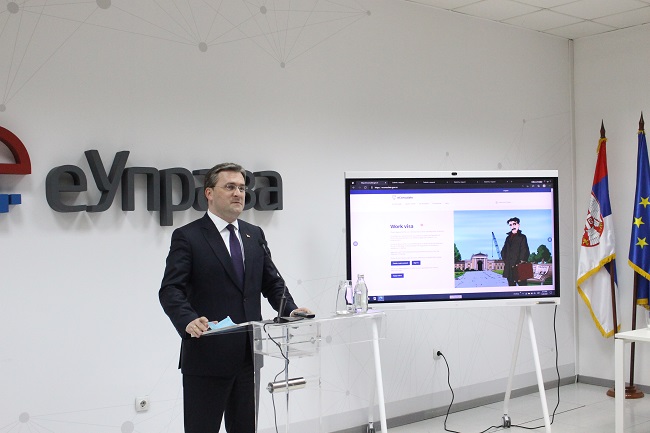 |
|
|
| Selakovic: Serbia demonstrated that solidarity does not solely have to be the privilege of the rich - 5/11/2021 |
|
Minister of Foreign Affairs of the Republic of Serbia Nikola Selakovic participated today in the Adriatic and Ionian Council of the Adriatic and Ionian Initiative and the Ministerial Meeting of the EU Strategy for the Adriatic and Ionian Region, stating that it was necessary to include all available resources of this initiative more directly in finding common answers to the challenges posed by the coronavirus pandemic.
The Serbian Foreign Minister pointed out that the pandemic can only be defeated by joint forces, emphasizing that solidarity was the key word in these challenging times.
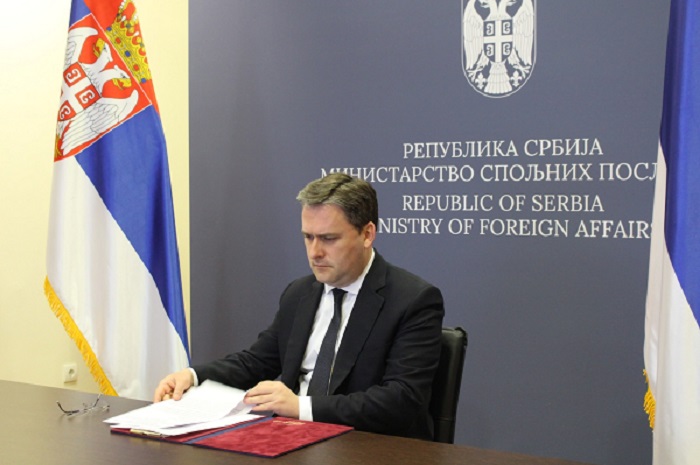
“Being committed to the principles of solidarity, Serbia vaccinated a large number of foreign nationals, primarily from the region. We have donated a number of vaccine doses to neighbouring countries as well as to the secretariats of regional initiatives in which Serbia participates. In this way, although not one of the economically strongest countries in this initiative, Serbia endeavoured to demonstrate that solidarity does not solely have to be the privilege of the rich”, Minister Selakovic said.
The Minister stressed that Serbia had entered the process of immunization of citizens against Covid-19 at the end of last year, and underlined that Serbia was one of the countries that faced both the epidemic and the vaccination process in the most efficient way.
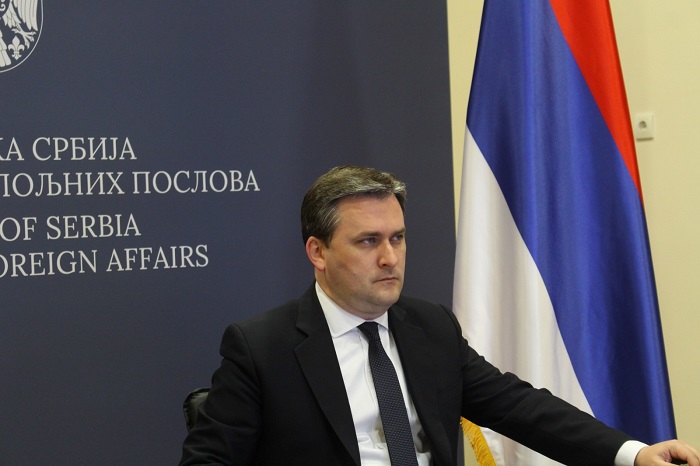
Selakovic expressed pleasure over the fact that the "Izola Declaration" recognized the importance of a common European response to the pandemic and the need to revise the activity, particularly within the EU Strategy for the Adriatic and Ionian Region, while also being pleased that the Declaration confirmed the European perspective of the Western Balkans.
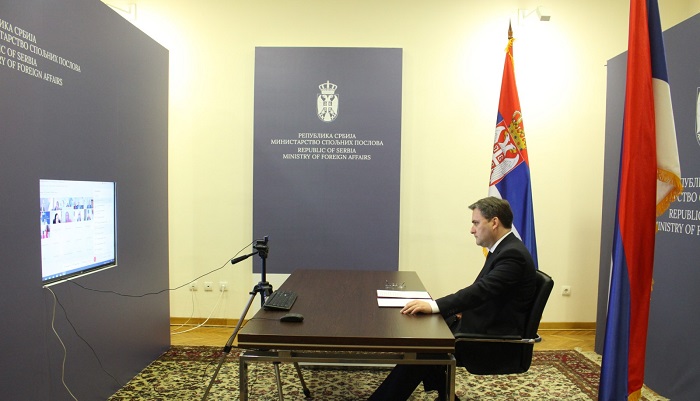
“Serbia's commitment to building a further European perspective and strengthening regional cooperation has been unequivocal”, Selakovic said adding that Serbia focused special attention on the green and digital transition in line with the European Green Deal, with support from the relevant EU funding programmes.
The meeting was held in video format, within the Slovenian Chairmanship of the initiative. |
|
|
| Vucic: We consider Europe our home - 5/8/2021 |
|
President Vucic said tonight that the visionary idea of Robert Schuman brought a true victory of the new trust after the Second World War and faith in the unification of differences in peace and solidarity, with the message that Serbia has that faith, as well as hope that it will become a country that will be gladly regarded in the European family of nations.
Congratulating everyone in Serbia and the EU on Europe Day, Vucic reminded that 9 May was also the day when the great victory of freedom is celebrated, which was won with huge sacrifices.
"While the horrors of war were still fresh in memory and Europe was healing the wounds of World War II, it also had people like Robert Schuman who understood that future can only be created based on the reconciliation of nations and their unity", Vucic said at the reception on the occasion of Europe Day.
He pointed out that the European peoples dared to see the recent adversaries as future allies.
"Schuman's visionary idea that peace will be preserved, if the creative forces are commensurate with the dangers that threaten, that Europe will emerge from specific achievements, has brought a true victory of newly found trust and faith in uniting differences in peace and solidarity", Vucic said.
He said that Serbia, although it did not always look like that, had that faith, as well as the hope that our concrete achievements, on the long and not easy path to EU membership, would be adequately valued.
“And that with your help, support and criticism, Serbia will become a country that you will be happy to see in the European community of nations. I believe that with our support, help and criticism, we would also contribute to the EU becoming an even better place to live", Vucic said.
Full membership of the EU, with a compromise solution to the issue of Kosovo and Metohija, is a way to achieve the goal and make Serbia orderly and successful, which would mean that we are on a good, European path, the President of Serbia said.
Vucic said that we still had to make a lot of efforts in reforms, not because someone is asking us to do that, but because we know that it brings us and the country a benefit.
He also pointed out that the reforms in the rule of law were exceptionally important, which were now being approached with much more responsibility.
"In our country, there is a race in who will say that they are more in favour of Europe, while saying under the table that they are the least for Europe. Europe does not belong only to those who would like to use European money, it does not belong to those in the government who say that they are on the European path because they believe that they are in that way preventing the opposition from coming to power, nor to those who think that this is the only way to get hold of power. It belongs to all of us, but we cannot take from Europe only what we like without accepting what we do not like", he explained.
I know, he added, how difficult it is to us in Serbia to hear criticism concerning Kosovo as well as in the field of the rule of law.
"I saw for myself that we are the ones who did not pay enough attention and apply a dedicated approach to the burning problems in that area. I believe that with greater zeal we will be able to change the attitude of the citizens of Serbia and gain greater respect from the EU for what we are doing", he pointed out.
President Vucic also pointed out that the EU was undoubtedly the largest donor, investor, and by far the most important trade partner of Serbia, and recalled that about two-thirds of all trade and even more service activities were EU related and that these were facts, whether someone liked it or not.
He pointed out that seven years ago when he became the Prime Minister, three times fewer people were employed in companies that came from EU countries than today.
"Despite all the problems, it shows how much we managed to do together and make good results, to provide people with life, security at work, to show that we can take care of them more", Vucic said, noting the great EU assistance in the field of education.
He said that during the recent visit to the EU, which he assessed as the best one so far, Serbia received additional support for infrastructure projects, primarily for modernization, i.e. essentially the construction of a new Belgrade-Nis-Presevo railway.
He said that this was confirmed in the letter of the President of the European Commission, Ursula von der Leyen, pointing out that this was the best letter he had ever received from Brussels.
"I am grateful to Von der Leyen for pointing out that this is a game-changer in our relations. It is a turning point because that support exceeds everything we have done together when you look at the scale, strength and significance of that project", he said.
He said that Serbia and its citizens considered Europe as their home and that is why we wanted to give our best contribution to peace through regional connectivity, the Berlin Conference and mini-Schengen.
"Encouraged by the message of European officials, I hope that I will be able to host them soon so that we can discuss the further acceleration of our European path", Vucic concluded.
Head of the Delegation of the European Union to Serbia Sem Fabrizi hosted a reception tonight on the occasion of marking 9 May, Europe Day. In addition to Serbian President Aleksandar Vucic, the reception in the Belgrade City Assembly was attended by Serbian Parliament Speaker Ivica Dacic, Serbian Prime Minister Ana Brnabic, Foreign Minister Nikola Selakovic, European Integration Minister Jadranka Joksimovic, representatives of the diplomatic corps and public figures.
Europe Day was established in memory of the beginning of the creation of the European Union (EU) and the Day of Victory over Fascism in the Second World War. The reception is held in memory of 9 May 1950, when the Schuman Declaration was signed, which laid the foundations of the European Union, a project that brought the longest period without war on the Old Continent.
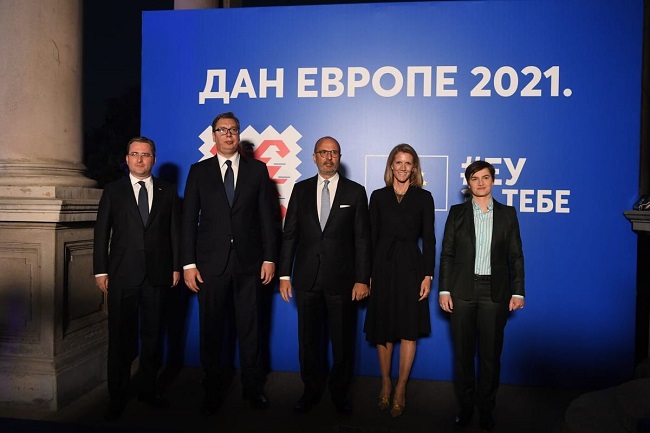
Source: Tanjug
Photo: Tanjug |
|
|
| Selakovic congratulates Josep Borrell on Europe Day - 5/8/2021 |
|
Minister of Foreign Affairs of the Republic of Serbia Nikola Selakovic extended a congratulatory message on the occasion of 9 May, Europe Day, to High Representative of the EU for Foreign Affairs and Security Policy Josep Borrell, expressing confidence that the idea of uniting in diversity, in peace and solidarity, would continue to be the guiding idea of the European Union.
"I am deeply convinced that the Republic of Serbia, through a policy of peace and good-neighbourly cooperation, can contribute to the European Union becoming an even better place to live, with the sincere belief that our achievements on the path to membership in the European family of nations will be adequately valued", reads the congratulatory message by Minister Selakovic, adding that the European perspective gave a strong impetus for our country to comprehensively implement political, economic and social reforms with the aim of becoming a full member of the European Union in the foreseeable future.
The Serbian Foreign Minister underlined that Serbia historically, culturally and in terms of values, belonged to the circle of countries united under the flag of the European Union and expressed hope that not only our country, but also our neighbours in the Western Balkans, would have the opportunity in the near future to become a part of what is without a doubt the most successful peace, democratic and economic project in the history of our common continent.
Selakovic also took the opportunity to extend gratitude on behalf of Serbia to the European Union for its assistance in the fight against the infectious Covid-19, emphasizing that our country highly appreciated the expressed solidarity and support in the difficult times of the pandemic outbreak and expressing confidence that the period ahead would see us contribute by joint forces to identifying solutions for overcoming the economic consequences of the corona virus pandemic.
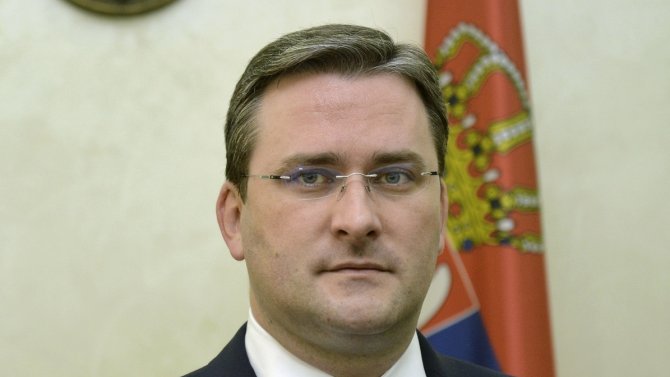 |
|
|
| Croatian Ministry of Foreign and European Affairs needs to stop deceiving the public - 5/7/2021 |
|
If the Ministry of Foreign and European Affairs of the Republic of Croatia sincerely cares about the promotion of relations and regional stability it needs to stop deceiving the public and feeding falsehoods and stereotypes about Serbs and Serbia.
Building good-neighbourly relations between states implies, first of all, the ability to refrain from inflammatory rhetoric and then also from actions that a neighbour could recognize as a provocation, or, even worse, an act of hostility. In that sense, the Croatian diplomacy has made a twofold departure from benevolent and friendly restraint.
The Republic of Croatia, as a NATO member and one of the KFOR contributor countries, has the opportunity and the right to participate in the international military forces in Kosovo and Metohija within the prescribed international legal framework, however, given the difficult and traumatic history of Serbia-Croatia relations, a friend and a well-meaning neighbour should not deploy additional contingents of its troops with enthusiasm and passion in the territory that the neighbour perceives as an integral part of its state.
If we take into account the fact that the Croatian diplomacy has been working with great zeal to create a Croatian-Albanian axis and the markedly affective interethnic relations, it is understandable that Serbs in Kosovo and Metohija, but also the rest of Serbia, do not see Croatian militarization of our southern province as a contribution to peace and security, but as a threat.
Furthermore, the deviation from the benevolent and friendly tone noticeable in the latest statement of the Croatian Ministry of Foreign and European Affairs is worrying, and we wonder what message and example that ministry wishes to send to its own citizens by using an inappropriate, almost profane language.
If we are to talk about the position of the Croatian national minority in Serbia using the language of argumentation, we will remind that last year Serbia bought Ban Jelacic's house and handed it over to the Croatian National Council, to which the Serbian Government also provided quality premises in the very centre of Belgrade.
In the field of the right to education and fostering cultural identity, we contributed to the preservation of the Croatian class in primary school in Backi Breg, expanding the profiles in Croatian language schools, establishing the lectorate in Croatian, supported the "Jelačić" Association from Petrovaradin, reconstruction of the House of Culture in Tavankut, etc.
When it comes to the political representation of Croats in the institutions and authorities of the Republic of Serbia, parallels with Croatia cannot be made, because neither in number nor in percentage can comparisons be made between the Serb minority in Croatia and the Croat in Serbia, but Serbia is open to, in cooperation with the Croatian National Council, make well-intentioned and friendly steps in order to make concessions to Croats in that area as well.
In light of the recent threats to Serbs in Borovo and the chanting of "Kill a Serb" and "Oh, Croatia, mother, we will slaughter Serbs", we must emphasize something like that is inconceivable in Serbia and that anyone who dared to threaten our fellow citizens of Croatian nationality in a similar way was most drastically sanctioned.
We also emphasize that Serbia's attitude towards national minorities has been continuously praised by the OSCE and other relevant international factors, so that all mystifications about the alleged endangerment of Croats in Serbia are a malicious and false political construct.
On the other hand, we will remind you that this time again, that two and a half decades after the end of the war, the Serb people in Croatia in practice do not have access to the rights guaranteed by the Erdut Agreement and the laws of the Republic of Croatia, and the attitude of the majority people towards Serbs in Croatia is still predominantly negative, which is why Serbs continue to be marginalized, discriminated against and often stigmatized and treated as second-class citizens.
We will also remind you of the fact that there is an aggressive resistance to the use of the Serbian language and script in parts of Croatia, as well as that the right to foster the Serbian national and cultural identity is a forbidden topic in many areas where Serbs live. The attitude towards the Cyrillic script, Serbian language, culture and tradition is still, to put it mildly, discriminatory in parts of Croatia, and there are no indications that sincere and consistent work is being done to create a social climate in which Serbs can feel like equal citizens.
However, the most problematic thing in the statement of the Croatian Ministry are not untruths about the position of Croats in Serbia and keeping silent about the truth about the position of Serbs in Croatia, but that it is an attempt to feed stereotypes about Serbs and Serbia from an important state institution, which is not only not a friendly and good-neighbourly demeanour, but borders on hate speech.
Serbia is very interested in resolving the issue of missing persons, as the Zagreb authorities are well-aware, since Serbs account for a significant percentage of those gone missing during the conflicts in Croatia, so there are no grounds to claim that readiness to overcome this painful issue is not mutual. The Croatian Ministry of Foreign and European Affairs is therefore knocking on an open door, while there is a sincere readiness on the part of our side to also discuss other issues that burden our bilateral relations.
However, to accuse Serbia of alleged "camps", coming from a country that is still burdened by the criminal legacy of the NDH and in which there is no readiness to face that part of its own history, is not appropriate, to put it mildly, much like it is inappropriate to elaborate on the topic of a "greater Serbia politics", at the time when Croatia is deploying its army on the territory of Serbia.
Croatian diplomacy should be a leader in the process of reconciliation and promotion of Serbia-Croatia relations and not a leader in their deterioration and one feeding the anti-Serbian stereotypes that distance us from any possibility to teach at least new generations that it is possible to have productive, harmonious and civilized relations with neighbours.
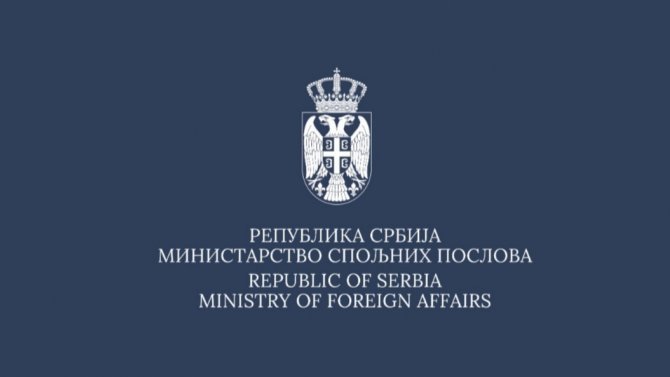 |
|
|
| Marking the banishment of Serbs in Operation Flash - 5/2/2021 |
|
Charge D’ affairs D. Trkulja attended the prayer marking of the anniversary of the suffering of Serbs in Operation Flash, which was held in the church of the Holy Martyr Dimitrije in Okučani. During Operation Flash 1995, 283 Serbs were killed or missing, while 18.000 were expelled from Western Slavonia.
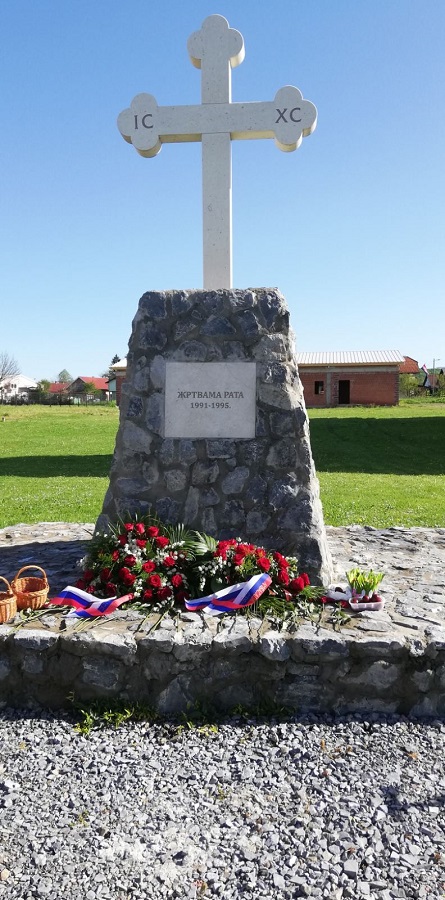
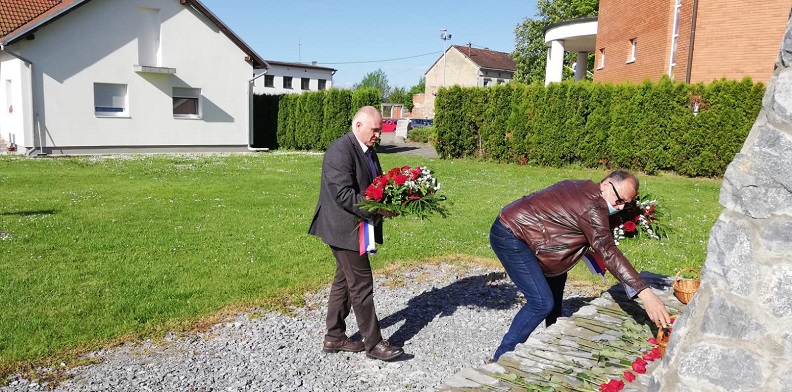
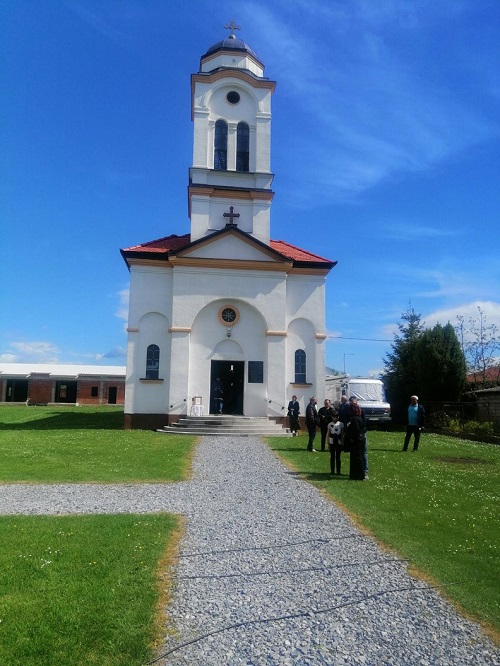
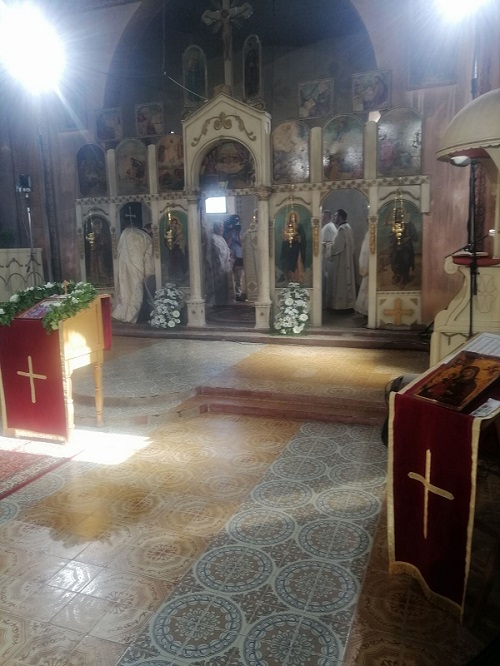
|
|
|
| Information On Vaccination against Coronavirus in Serbia - 4/23/2021 |
|
Vaccination (immunization) in Serbia began on 24 December (earlier than in the majority of European countries). Prime Minister Ana Brnabic received the first vaccine. She was also the first Prime Minister in Europe to receive the vaccine shot.
Serbia was the third country in Europe, after Britain and Switzerland, to start the vaccination. In Serbia, mass vaccination of the population in the fight against Covid-19 launched on 19 January.
Medical staff was the first to receive the vaccine, the immunization of geriatric centres' patrons followed, and the vaccines were then administered to the personnel of the Ministry of the Interior, Serbian Army and other security services, media representatives and others.
In Serbia, citizens express interest to be vaccinated against Covid-19 through the e-Government portal or by phone - via the contact center, upon which they receive a message with the date and time of vaccination appointment.
The Serbian Government informed that it enabled registering for vaccination against coronavirus via Viber app, starting 6 April, which is available through the official info service of the Serbian Government launched on Viber.
As of 9 April, all local governments will start arranging open vaccination posts where citizens will be able to get vaccine shots without prior registration, while the immunization of citizens who registered via e-Government portal or the Viber app will also be carried out at the same time.
More than 1,700,000 citizens applied through the e-Government portal or contact centers. Between 10,000 and 15,000 citizens apply for vaccination daily through the e-Government portal.
Citizens are able choose the vaccine they wish to receive, and the following are available: Pfizer-BioNTech, Chinese Sinopharm, Russian Sputnik V and AstraZeneca.
Serbia is one of the few countries that has four vaccines at its disposal.
According to the data, 70 percent of those vaccinated received the Sinopharm vaccine (more than a million citizens), 12 percent received the Pfizer vaccine, 9 percent Sputnik V and 9 percent the AstraZeneca vaccine.
The elderly are constantly pleaded with and invited to apply for the vaccine if they have not already, considering that citizens over 70 years of age are a priority. At the same time, citizens of all ages are invited to register and get vaccinated, since immunization has also begun of those who are not in the priority groups. Medical workers have also been vaccinating residents of smaller and rural areas, who have not registered via e-Government.
The importance of vaccination is constantly emphasized, as well as the fact that it is the only solution in the fight against the Covid-19 virus.
According to the latest information, 3.163.499 vaccine doses were given in Serbia, out of which fully vaccinated citizens (having received both doses) account for 1.282.971 (a third of the Serbian adult population). It is estimated that by the end of April, we will have about 40 percent of the adult population vaccinated with the first vaccine dose.
950,000 citizens were fully immunized - which means that three weeks have passed since their second dose, or 5 weeks since their first dose in the case of AstraZeneca.
In the age group between 65 and 74, more than 51 percent of the population has been vaccinated, and in the age group over 75, we have 42 percent of those vaccinated.
*On April 6, President Vucic was vaccinated in Rudna Glava, receiving the Chinese Sinopharm vaccine.
On Thursday, 8 April, Serbia broke its own record for the number of persons vaccinated, when more than 75,000 people were vaccinated. This is a result that, in proportion to the number of citizens, even the most developed countries in Europe and the world cannot take pride in.
The goal is to have more than 2,800,000 persons vaccinated, and 2,200,000 revaccinated by the end of May, and more than three million vaccinated and revaccinated persons by the end of June.
Belgrade, Novi Sad, Nis, Uzice and Sremska Mitrovica are at the top of the list with about 36 or 37 percent of vaccinated adult citizens.
*Example of Belgrade – 40,8 percent of adult citizens have been vaccinated (574.729 citizens), out of which fully vaccinated citizens 402.416 or 28,6 percent. There are additional 18 posts in city municipalities where they can be vaccinated without making an appointment. When it comes to senior citizens, aged 65 to 74, more than 70,2 percent of that population was vaccinated.
PROCUREMENT OF VACCINES
*On 22 December, the first quantities of Pfizer-BioNTech vaccine were delivered to Serbia. Serbia is the second country in Europe, after Great Britain, to receive the Pfizer vaccine.
*On 16 January, one million doses of the Chinese Sinopharm vaccine arrived.
*On 29 January, 40,000 million doses of the Russian Sputnik V vaccine arrived.
*On 9 February, a new consignment of 50,000 Sputnik V vaccines arrived from Russia.
*On 11 February, Russian experts arrived in Serbia and discussed with Serbian experts how to start the production of Russian vaccines in Serbia as soon as possible. They visited the Torlak Institute in order to assess the technological and personnel capacities of the Institute for the production of the Sputnik V vaccine.
President Vucic announced that our country will invest in new plants, new equipment that would meet all standards, with the goal of producing the vaccine in our country. The Sputnik V vaccine would be distributed to the region from our country, but also to European countries.
* On 10 February, another batch of 500,000 Chinese Sinopharm vaccines arrived in Serbia.
* On 15 February, 40,950 doses of the Pfizer-BioNTech company vaccine against coronavirus arrived in Serbia.
*On 21 February, 150,000 AstraZeneca vaccines arrived in Serbia, which have been available at every vaccination post since 23 February. Serbia was the first country in the Balkans to have this vaccine at that point in time.
*On 22 February, 46,800 more Pfizer vaccines arrived in Serbia.
*On 22 February, 50,000 more Sputnik V vaccines were delivered.
*On 28 February, a new consignment of 100,000 doses of the Sputnik V vaccine arrived (this was a delivery of the second dose of the vaccine - for revaccination), since the first and second doses have a different composition.
*On 1 March, a delivery of 58,500 Pfizer-BioNTech vaccines arrived.
*On 4 March - during his official visit to Berlin, Minister of Foreign Affairs Nikola Selakovic said that German Foreign Minister Heiko Maas informed him that Serbia would soon receive 300,000 vaccines from the COVAX program (the first doses arrived on 2 April).
* On 5 March, 500,000 more Sinopharm vaccines were delivered.
*On 8 March, 28,080 doses of vaccines by Pfizer- BioNTech company arrived.
*On 11 March – Minister Popovic announced that the production of the Russian Sputnik V vaccine at the Torlak Institute will begin in May, and that Serbia will thus become the first country in the territory of Europe where this vaccine is produced.
The first phase of production of the Russian vaccine in Serbia implies transport of the substance, filling of bottles in accordance with the highest technological standards, packaging and distribution of vaccines in our country and region, and after the establishment of the first phase of production, the preparation of a feasibility study will begin on production in the so-called full cycle, which includes the production of the substance in Serbia. This will require the procurement of complex technological equipment and the expansion of Torlak's production capacities, but estimates are that full-cycle production could begin by the end of this year.
*On 11 March – during his visit to the UAE, Serbian President Aleksandar Vucic announced that it had been agreed that, together with the United Arab Emirates and China, a vaccine against the coronavirus of the Chinese company Sinopharm would be produced in Serbia. President Vucic pointed out that, in addition to the timetable made with the competent Russian minister for the production of the Russian vaccine at Torlak, it was agreed that the factory for the Sinopharm vaccine would be completed and start production from 15 October.
*On 15 March - A delivery of 16,380 doses of Pfizer-BioNTech vaccine arrived.
*On 18 March - President Aleksandar Vucic talked via video link with the management of Sinopharm company about the process of procuring vaccines, building a factory of Chinese vaccines in Serbia and building and equipping Serbian hospitals. An agreement on the purchase of another two million doses of Sinopharm vaccines was signed at the meeting.
* On 18 March - President Vucic announced that Serbia will have two vaccine factories and will produce between 30 and 40 million doses a year. The President had talks with the representatives of Sinopharm, while Minister Nenad Popovic discussed the production of the Sputnik V vaccine. (He stated that he expected that in less than a year, the liquid for the vaccine would be produced, and not just packaged.)
*On 22 March - 55,990 doses of Pfizer-BioNTech vaccine were delivered.
*On 23 March - 100,000 doses of the first component of the Sputnik V vaccine arrived in Serbia.
*On 25 March - The Russian Direct Investment Fund and the Institute of Virology, Vaccines and Sera “Torlak” announced that an agreement has been reached on the production of the Sputnik V vaccine in Serbia. This will make our country the first state in Southern Europe to produce Sputnik V, and the vaccine could be exported to other countries in the region at later stages. The production of the vaccine will start by May at Torlak.
*On 29 March - 23,570 doses of Pfizer-BioNTech vaccine arrived.
Serbia paid EUR 4.8 million in advance to the COVAX system, and we donated EUR 2 million for the development of the vaccine through the European Commission. Since no vaccines from the COVAX programme were delivered to Serbia, Serbia procured them bilaterally.
*On 2 April, the first consignment of 57,600 AstraZeneca vaccines arrived through the COVAX mechanism.
*On 5 April, half a million Sinopharm vaccines arrived.
The Prime Minister stated that 2.5 million vaccines were delivered to Serbia from China alone, and that a little less than a million of vaccines were delivered by all other manufacturers.
*On 5 April - The Torlak Institute signed a Technology Transfer Agreement with the Russian Direct Investment Fund and the Russian pharmaceutical company Generium, under which the Russian side will transmit to the Serbian side data on procedures and technologies required for the production of the Sputnik V vaccine in Serbia.
Minister Nenad Popovic announced that three validation series of the Sputnik V vaccine would be produced in April, and that samples from these validation series would be sent for quality control to the Gamaleya Institute, and after the institute confirms the validity of samples produced at Torlak, our institute would start the production of the vaccine. This is expected to materialize by 20 May this year, and in that way Serbia will become the first country in Europe to produce the Sputnik V vaccine.
*On 6 April, 106,420 vaccines manufactured by Pfizer-BioNTech were delivered.
With that delivery, Serbia procured a total of 3.5 million vaccines, paid for all the vaccines, as well as all that we received from the COVAX system.
*On 12 April - 106,470 doses of Pfizer-BioNTech vaccine arrived.
*14 April – The first series of control doses of the Sputnik V vaccine was filled at Torlak. The vaccines produced at Torlak will be released in June this year.
*15 April – President Vucic announced that another 211,000 Pfizer vaccines would arrive on Monday, 19 April, as well as that 50,000 doses of the second component of the Russian vaccine arrived on 14 April, and that on 16 April another batch of same quantity was expected, as are another 100,000 doses of the Sputnik V first component on Monday or Tuesday. Chinese Sinopharm vaccines are also expected by the end of this month.
*19 April - 211,000 doses of the Pfizer vaccine arrived in Serbia, which is the largest single delivery of that vaccine to our country so far.
VACCINATION OF MEMBERS OF THE DIPLOMATIC CORPS IN SERBIA
The Serbian Government was among the first in the world to enable the immunization of members of the diplomatic corps in Serbia. All four vaccines are available.
Close to 1,300 members of the diplomatic corps, holders of special ID cards (diplomatic, official, consular, etc.), registered and were vaccinated.
*On 13, 18 and 19 February, Sinopharm vaccines were administered. This completed the first round of vaccination. The second round, that is, revaccination with that vaccine, was carried out on 11 and 12 March.
*On 23 February, vaccination with the Pfizer vaccine began. Revaccination using this vaccine was carried out from 16 to 19 March.
Also, vaccination with Sputnik V and AstraZeneca started.
*On 20 March, remaining revaccinations were performed and it was also made possible for members of the diplomatic corps to receive the vaccine, who for certain reasons could not be vaccinated.
VACCINE DONATIONS TO COUNTRIES IN THE REGION
*On 14 February - President Vucic handed over the first batch of 4,680 Pfizer vaccines to Prime Minister of North Macedonia Zoran Zaev, while on 24 February, Minister Loncar handed over another 3,510 doses of Pfizer vaccine to the Macedonian Minister of Health.
*On 17 February - Serbia donated 2,000 Sputnik V vaccines to Montenegro.
*Approximately 5,000 health care workers from the Republic of Srpska have been vaccinated in Serbia so far, and our country will make the vaccination information system available to the Republic of Srpska so that they can use it when they have enough vaccines.
*On 2 March – Serbian President Aleksandar Vucic handed over to the Chairman and Members of the Presidency of Bosnia and Herzegovina a batch of 5,000 AstraZeneca company vaccines donated by Serbia to Bosnia and Herzegovina, while on 12 March, another 5,000 doses of AstraZeneca vaccine were delivered from Serbia.
* On 15 March – all employees of the Constitutional Court of Bosnia and Herzegovina were vaccinated at a hospital in Uzice, at the request of that court, in cooperation with the Constitutional Court of Serbia, the Ministry of Health, the Ministry of Foreign Affairs and the Serbian Embassy in Sarajevo.
*On 23 March - vaccination of 105 journalists from North Macedonia began at the Public Health Institute in Vranje. AstraZeneca vaccines for Macedonian journalists were provided at the request of the Macedonian Association of Journalists in cooperation with the Journalists' Association of Serbia, and with the support of the Office of the Serbian President.
*On 23 March - President Aleksandar Vucic handed over ventilators and other medical equipment for the Republic of Srpska. The donation was received by Chairman of the Presidency of Bosnia and Herzegovina Milorad Dodik.
*On 24 March - The Chamber of Commerce and Industry of Serbia (PKS) announced that, in cooperation with the Serbian Government, 10,000 vaccines were provided for businessmen from the region and their employees.
*On 29 March - The President of the Chamber of Commerce and Industry of Serbia announced that 8,500 businessmen from the region were vaccinated in Serbia over the weekend (on 27 and 28 March).
*Serbia donated a total of 40,000 doses of the Sputnik V vaccine to North Macedonia, the first batch of 20,000 vaccines for the first dose arrived on 1 April, and it was announced that the revaccination doses would arrive in the following period.
39,000 foreign nationals were vaccinated (using AstraZeneca vaccine), who arrived either at the invitation of the Serbian Chamber of Commerce or registered on their own via the e-Government portal. Prime Minister Brnabic stated that the vaccination of people from the region was a huge success and assessed that this was a way to raise common security, because if people in the region were not safe, people in Serbia were not safe either. The most numerous were citizens of Bosnia and Herzegovina, North Macedonia and Montenegro
*On 8 April - The Prime Minister stated that Serbia was currently focused on vaccinating its citizens, but that we would endeavour to help friends and neighbours in the fight against coronavirus through vaccine donations.
Around 53,000 foreign nationals who do not have a registered residence in Serbia have applied for vaccination in Serbia, by registering for vaccination via the e-Government portal. Foreign nationals are currently not being vaccinated, but Serbian citizens only, and once they have been vaccinated the option of vaccinating registered foreign nationals will be considered. Vaccination is free in Serbia, and the same applies to foreign nationals who get a vaccine shot in our country.
Advertisements for vaccination through agencies have appeared on social media and the internet, however, it is not possible to make a vaccination appointment in Serbia through any foreign or domestic travel agency, and these are internet frauds.
*On 8 April - The Government has decided to send a donation of 20,000 doses of AstraZeneca vaccine to the Canton of Sarajevo.
*On 9 April - 29 journalists from the Sarajevo Canton Television were vaccinated in Novi Pazar.
On 10 April - Chairman of the Presidency of Bosnia and Herzegovina Milorad Dodik stated that he had agreed with the Serbian President that around 20,000 vaccines would be delivered from Serbia to the Republic of Srpska early next week.
VACCINATION OF MIGRANTS
*On 24 March, the vaccination of migrants started in the outpatient clinic of the migrant center in Krnjaca. Around 500 migrants have registered.
Head of UNHCR Office in Serbia Francesca Bonelli pointed out that this UN agency was deeply grateful to the Serbian authorities for including the refugees in the vaccination plan. |
|
|
| President Vučić met via video link with representatives of the IMF delegation, 4/22/2021 |
|
President of the Republic of Serbia Aleksandar Vučić talked today via a video link with the representatives of the delegation of the International Monetary Fund led by the Head of the Mission, Jan Kees Martijn. The interlocutors concluded that Serbia's main goal remains to preserve the hard-earned reputation of a fiscally secure country, as well as to continue with a responsible fiscal policy so that public debt does not exceed 60 per cent of GDP, whereby Serbia continues to work on further economic growth.
During the conversation, President Vučić and Jan Kees Martijn especially referred to the incentive measures and adopted three packages of measures to help the economy and citizens, which preserved macroeconomic stability and even achieved a higher employment rate. Martijn commended the responsible economic policy of Serbia and the successful crisis management during the pandemic.
"Serbia achieved one of the best results last year despite the challenges of the pandemic", Martijn said, noting that Serbia was one of the few countries to which the IMF did not adjust the initial projection of the 5% growth rate it gave last year.
President Vučić added that following the first quarter of 2021, Serbia is well on its way to achieving the planned growth of 6% as planned, since one of the main focuses of the Government is investing in large infrastructure projects and intensifying work on attracting foreign direct investments.
"In 2020, Serbia was at the very top in terms of economic growth in Europe, and I am convinced that this year we can enter the first three or four countries in terms of growth", said President Vučić, adding that he was satisfied that Serbia still, despite the pandemic situation, has an extremely strong inflow of investment.
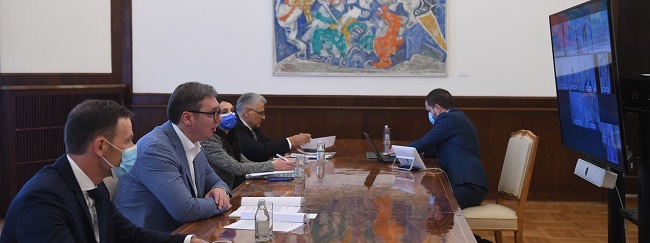
President Vučić and Jan Kees Martijn also discussed a new advisory arrangement, which is of special importance in light of the improvement of the general investment climate in Serbia, as well as in the context of even greater investor assurance.
"Given Serbia's tremendous progress over the past eight years, the priority goal of this arrangement will be to preserve the results achieved, but also to provide support for further implementation of structural reforms aimed at even faster, stronger and more sustainable growth", said President Vučić and thanked the IMF and the personal engagement of Jan Kees Martijn in the professional and expert support that Serbia is counting on.
President Vučić pointed out that Serbia will pay special attention to reforms in public companies, and that priorities will continue to be investments in infrastructure, creating an even better climate for investments, greater investments in the environment, science and capital projects, which will further contribute to the long term stable financial growth in the coming years.
Source: www.predsednik.rs
Photo: www.predsednik.rs
|
|
|
| Meeting with the World Health Organization Regional Director for Europe, 4/20/2021 |
|
President of the Republic of Serbia Aleksandar Vučić met today with the Regional Director of the World Health Organisation for Europe Hans Kluge, to discuss cooperation in the fight against the COVID-19 pandemic, as well as cooperation in improving health care in our country and other joint activities.
President Vučić thanked Dr Kluge for his personal engagement and support during the current pandemic, especially for technical assistance and expertise. On this occasion, he informed the WHO official about the results of immunisation in Serbia and plans on how to provide the vaccine to all citizens who want to get it.
Dr Kluge congratulated President Vučić on his leadership and personal commitment to provide vaccines. He emphasised that Serbia, with its good immunisation strategy, ranked among the global leaders, thus becoming an example of humanity and solidarity by enabling vaccination of elderly people in rural areas, foreign citizens and donating vaccines to other countries.
"Serbia has accepted the vaccine as a life-saving product and has not looked at it geopolitically", said Dr Kluge.
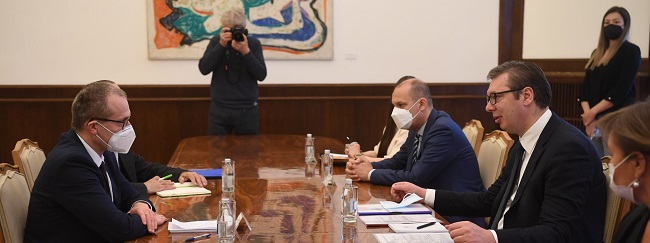
The two interlocutors agreed that the world should increase production capacities for vaccines, as well as develop new adequate therapies for the fight against COVID-19, and, in this regard, work on increasing the level of citizens' trust in science.
President Vučić informed Dr Kluge about the plans for improving the work of the Institute for Virology, Vaccines and Sera "Torlak".
"We want to make 'Torlak' one of the best vaccine factories in Europe", said President Vučić.
Source: www.predsednik.rs
Photo: www.predsednik.rs
|
|
|
| WHO describes immunisation process in Serbia as impressive, 4/19/2021 |
|
Prime Minister Ana Brnabic talked today with World Health Organisation (WHO) Regional Director for Europe Hans Kluge about the epidemiological situation and the course of immunisation of citizens in Serbia.
Brnabic expressed gratitude for the cooperation in the fight against the pandemic, technical assistance and expertise, emphasising that the support of this organisation is very important for our country.
She informed the WHO Regional Director for Europe about the course of immunisation of citizens in Serbia, expressing her belief that, thanks to the large number of vaccinated people, we will be able to create collective immunity and return to normal life.
Kluge assessed the immunisation process in Serbia as impressive, and added that Serbia has made a good decision to offer citizens all available vaccines used in the fight against coronavirus.
Expressing concern over the emergence of new strains of the virus, he stressed the need to speed up the immunisation process and show mutual solidarity.
The WHO Regional Director for Europe praised Serbia for the humanity it has shown by donating vaccines to the countries of the region and enabling vaccination for those who do not have a sufficient number of vaccines for their citizens.
The Prime Minister said that Serbia will continue to cooperate with the countries of the region and help in accordance with its capabilities.
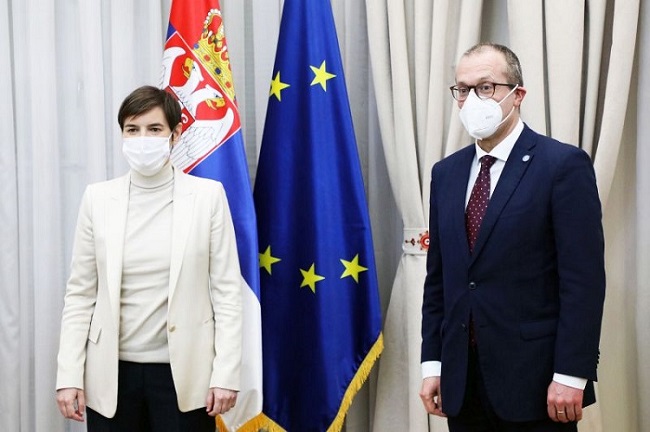
When it comes to the project "Roadmap for Health in the Western Balkans 2021-2025", it was stated that, if epidemiological conditions allow, a regional meeting will be held in Belgrade at the end of the year, important for future improvement of cooperation between countries in the field of health challenges.
Source: www.srbija.gov.rs
Photo: www.srbija.gov.rs |
|
|
| Marking the Day of Remembrance of the victims of the NATO aggression, 24 March 2021 |
|
President of the Republic of Serbia Aleksandar Vucic made a statement on the occasion of marking the Day of Remembrance of the victims of the NATO aggression.
"Your Holiness, distinguished Chairman of the Presidency of Bosnia and Herzegovina, distinguished Speakers of the National Assemblies of the Republic of Serbia and the Republic of Srpska, distinguished Prime Ministers of the Republic of Serbia and the Republic of Srpska, distinguished Ministers of both Governments, dear guests and friends, representatives of the Serbian People from Montenegro, North Macedonia, Croatia, thank you for the fact that we are all together tonight and that the Serbian spirit is unbreakable and invincible.
One child a day and a little more than that. That is the most difficult, sickening and painful number of the NATO aggression from 1999. Killed, stopped, guilty of nothing, having committed no sin, without the right to defence, without the right to justice and without the right to life.
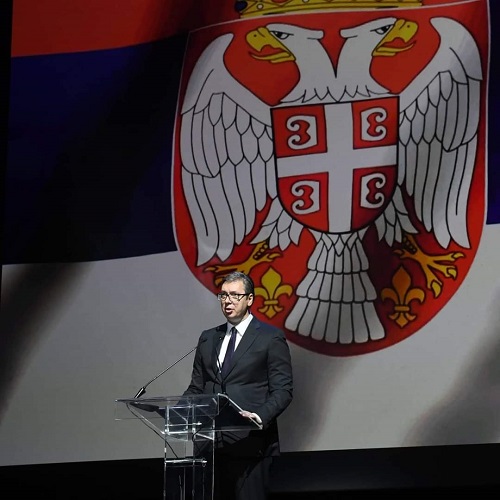
No one has ever been held accountable for this crime, a crime greater than a crime. No one, for the 2,500 killed civilians, but also soldiers and policemen who were only guilty of guarding, protecting themselves and their homes. No one has ever been held accountable for more than 6,000 persons injured.
Even today, 22 years after the aggression, it is not possible to explain that, there is no universal justification, despite all the work done to that end, there is no reason, it makes no sense, and only names remain, as eternal as sin.
Miljana Milic, fifteen years old,
Vladimir Milic, twelve years old,
Miomir Mladenovic, fourteen years old,
Dragan Dimic, three years old,
Julijana Brudar, ten years,
Olivera Maksimovic, twelve years old,
Miroslav Knezevic, thirteen years old,
Dajana Pavlovic, five years old,
Stevan Pavlovic, eight years old,
Marko Simic, two years old,
Milica Rakic, three years old,
Ivan Ivancic, seven years old,
Marko Ivanovic, three years old...
And the list goes on, eighty nine names, not only Serbian ones...
The senselessness of sheer killing did not choose. Sixteen children, aged two to seventeen, from the Ahmetaj and Hasani families, were killed in a convoy returning home to Prizren.
In one headline in the West, this was simply explained as a "tragic mistake". The deaths of Marko Roglic, Milan Ignjatovic, Gordana Nikolic, Irena Mitic, Milica Stojanovic, Bojana Tosovic, Branimir Stanijanovic, our Sanja Milenkovic...could not expect or get even such an explanation.
Those deaths were not tragic, for those who caused them, much less a mistake. It was just an excuse, a miserable excuse.
They were a result of intent and a clear decision, as a severe judgment against one country, its people, its children.
And that is why today we will refrain from speculation in giving a name to everything that happened during the spring of 1999. Because a crime happened, a heinous and terrible one. And it was an aggression, not a bombing, not an intervention, not a campaign, not an operation. An aggression is what happened. An attack on a sovereign country, without a decision of the United Nations, without a sufficient reason that would justify attacking the then Yugoslavia or a neighbouring or NATO country.
No one was attacked by Serbia or the Federal Republic of Yugoslavia at that time. They attacked us, with one goal. To defeat us, to keep killing us, and in the end to take away a part of our territory.
And no matter how much we analyze things today, no matter how harsh and critical we are towards ourselves, our policy and leadership at the time, it is clear that the Federal Republic of Yugoslavia and Serbia were left with almost no choice then. The choice was horrible, either the loss of territory and people on the one hand, or the complete disappearance of the Serbian state, morals, honour, Serbian spirit, names and surnames. And we could not help but lose. Nineteen big ones attacked one small country, the Federal Republic of Yugoslavia. They attacked both Serbia and Montenegro. And even when they don't talk about it today, in one of the two independent countries, those are the facts. And that small country, and that small nation, to all nineteen of them so great and powerful, held a lesson in what matters most - honour, morals and love for freedom that a nation can have.
Yes, justice, lest we forget justice. All those nineteen great ones today still silently talk about their military success, avoid answering questions, while - can you imagine, one small, only numerically small Serbian people, that small but magnificent nation, with sadness, tears in their eyes, proudly remembers their resistance and struggle against the nineteen cruel and arrogant ones.
We lost a lot, we lost our fathers, brothers, spouses, children, but the honour and Serbian heart are still there, to protect Serbia, which is eternal and indestructible.
We lost children, we lost people, we lost control over a large part of the territory, we lost billions because of the destroyed infrastructure and economy.
And all that was left for us was the body of a tortured, destroyed country, a country in disintegration, mutilated, looted, wounded, deserted, and guilty, condemned for everything that happened not only in the 1990s, but throughout history.
A country that, even ten years after the aggression, did not have the strength to stand up, rise to its feet, and do anything but be silent, or bow its head and obediently apologize, for everything, even for its dead, even for its murdered children.
Today, it is no longer that failed, tortured, devastated, mutilated Serbia.
Today, it is Serbia, which has found its strength and its pride again.
Serbia, which calls things by their real names.
Serbia, which turned its back on war and defeats, and started working.
Serbia, which rose to stand on its own feet and has a voice of its own.
Serbia, which, even when they don't believe it, they listen to. Which is capable, which is growing, and is no longer part of the problem. Serbia, which is and will be, at least we will do our best to this end, the very solution that enables the entire region to live in peace and understanding.
And that Serbia, today, when there are still many more bombs in the world than vaccines, sends not bombs, but precisely those vaccines to the region. Today, it is ready to produce them as well, and in just a few months we will do just that, but not only for ourselves, but also for others, for the entire Balkans.
We are ready, and we are willing to help.
We are not ready to be and we will not be silent, nor be humiliated again.
We draw the right to that not only from the victims we had, but also from the fact that we stopped looking at others only a long time ago, and looking for fault and guilt only in them, and not sometimes in ourselves as well.
We looked at each other and admitted. Every loss, every defeat and every crime that someone committed in our name, every failure and every wrong policy.
And we are no longer doing anything that could endanger anyone.
We continue to work and work, and grow more and more, gaining strength with only one goal - to be the best in economy and education, health, in culture, science, sports...
And we want to be safe, on our own. We want our army to be much stronger than it was in 1999. So that we never again face a situation that someone is killing our children, destroying the country, or expelling our people.
We want to remain free, to decide our own destiny, and for no one to take everything away from us ever again, and give us nothing.
And that nothing today, and I will repeat it as much as necessary, is the idea of some great, powerful ones, but also those who serve them, the idea that "Kosovo" should recognize us, so that we could recognize "Kosovo".
We do not need that recognition. And Serbia will not allow you to walk over our victims, our history, our past, but also to walk over our future. You will get the answer of reasonable, kind and responsible people. We need a compromise. We need all the obligations that we and Pristina have assumed to be fulfilled, but only we have fulfilled them so far.
And this is not our whim. It is not a phantasmagoria about a Serbian world that we want to create.
Even today, when they threaten us with the formation of a Greater Albania, when they say that the Community of Serb Municipalities is not going to happen, it is ours to be calm, to take care of our people in Kosovo and Metohija, but to send a clear message to all those great, powerful ones that we are not as weak as we were, that we will be able to preserve what is our own, not touching anything that belongs to anyone else. After all, Serbia is not and will not be but a handful of oats that every crow from the whole wide world can eat. As for those who used the strength and power of the nineteen arrogant and cruel ones, I only ask them not to threaten us. Please, please, don't threaten us. They should not think that Serbia is broken and that it will not have the strength to respond. Please, please, our Albanian neighbours, do not threaten us. And we ask all others, who have demonstrated their cruelty towards Serbia, not to help you in that. That is all we are asking and nothing more.
And we will respond to calls for peace, calls for compromise, and always with good will, because we do not want to have children killed again. And we do not want the children of others to suffer again. But do not underestimate Serbia, and do not look at Serbia with the same eyes as you did in 1999.
Today, Serbia is much stronger, much more powerful. Today, Serbia is a united country of togetherness, not a divided one. Today, Serbia is incomparably stronger and better in every aspect than it was in 1999, from the economy to our army. And we will never threaten anyone, we just ask you and request from you to respect us and nothing more.
Today, we are building roads that will connect us, among ourselves, with the region and with the world. Until the end of the year, we will work on eight motorways, on eight routes in the entire Balkans, not only Serbia, eight roads of peace and cooperation.
Only a crazy person would trade this for war, for dead children, for demolition and new loss. And yes, we want to have the closest relations with everyone who took part in the aggression against our beautiful Serbia, we have forgiven a long time ago, but no, we will never forget. And don't ask us to. That one day, every year, we will remind both ourselves and you. The nineteen of you, the most powerful, strongest, greatest in terms of might and force, but not so much when it comes to honour and morality. We will keep remind you and ourselves, just so it would never happen again. Not to us only, but to none other freedom-loving people in the world.
And if we have an offer, today it reads as follows: we are ready to make the whole Balkans a winner, for everyone to win, as long as no one tries to make Serbs the only losers.
And the path to this goal is not difficult at all.
We just need to respect and understand each other and not try to humiliate each other.
And not to touch into what everyone paid the highest and bloodies price for. Freedom. And we, Serbs, know the price of freedom.
Into our right to have it, to keep it and to remember all the victims who are part of it.
And our defeats, our lives and our children are built into ours. And the lives of our heroic pilots, and our giants from Kosare and Pastrik, and our children, innocent, completely innocent, and only guilty of living in Serbia.
This is too high a price to be quiet about it.
Because that would mean that we are ready for another defeat, for another humiliation.
And we are not.
And when all go quiet, we will keep repeating.
A child a day, and a little more. This was how much you killed us. In an aggression that even you did not understand why you carried it out.
And we will keep repeating this, just so it does not happen to us again.
With special reverence, we are fulfilling our obligation to pay tribute to all innocent Serbian victims who laid their lives on the altar of the homeland, both civilians and our heroic soldiers and policemen, the heroes of Kosare, Prizren, Mitrovica.
Today, for us Serbs, life in Kosovo and Metohija is like Via Dolorosa, using their last strength on the road to Golgotha, but we would not be Serbs if we were not capable to "exist in a terrible place".
And today, tonight, I can conclude with one important sentence. On the soil of Europe, there was, and today is stronger than ever, an indomitable, unwavering, unconquerable and never conquered Serbia.
May eternal glory be to all the victims of the NATO aggression and let us all exclaim together - long live free and proud Serbia", President Vucic said.
Source:www.predsednik.rs
Photo:www.predsednik.rs |
|
|
| Commemorating Remembrance Day of 17 March 2004 - Pogrom in Kosovo and Metohija |
|
President of the Republic of Serbia Aleksandar Vucic participated today in the commemoration of the Remembrance Day of 17 March 2004 - Pogrom in Kosovo and Metohija. He said that exactly 17 years ago, a pogrom took place in Kosovo and Metohija, and that pogrom surpassed all other crimes.
"There may be times when we are powerless to prevent injustice, but there must never be a time when we fail to protest, these words of Elie Wiesel, a camp survivor and Nobel laureate, make it forever incumbent upon us not to remain silent against crime, regardless of who and for what reason committed it", President Vucic stated and added that we remembered and learned every lesson in which we were losers, each one in which we were silent to our own victims, and each one when we were ready to forget.
"Serbia is no longer weak today, nor is it a country of losers, it does not threaten, but it does not forget either, it is ready for talks, but not for humiliation. Serbia, just like everyone else, has the right to take care of its people, their safety and well-being. The right to life is a fundamental human right and we will always defend it", President Vucic said.
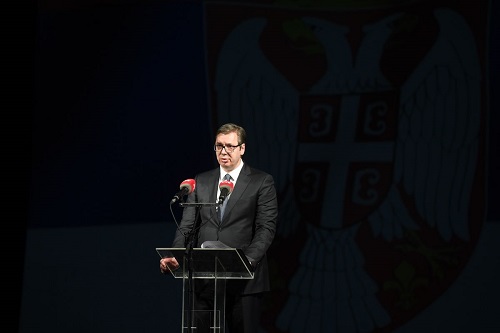
President Vucic said that pogrom surpasses all other crimes, because it is not only an act, but an intention, a policy, a premediated attempt to forcibly cleanse persons belonging to other peoples and faiths from a region or a country.
"We have no right to remain silent to that", said the President of Serbia, emphasizing that we have an obligation to be winners without blood spilled and war, to be the best in the economy, healthcare, sports, education and everything else that implies development and progress.
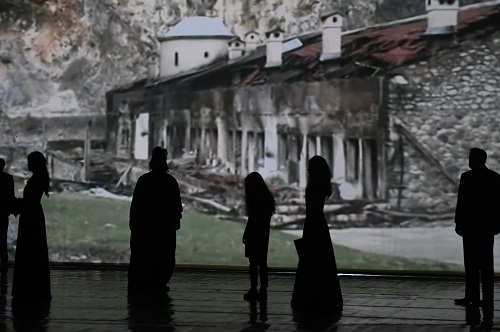
"We also wish others to work on themselves and be successful, because we are aware that crime is a tool for losers that winners do not need, as they remember, but forgive and move on, while the losers keep spinning in the same vicious circle. We Serbs do not want to be that anymore, we want a future in which we will remember, but from which we will not return. We know what happened and we call it by its real name", President Vucic concluded.
|
|
|
| Meeting with the Head of the Delegation of the European Union, 3/17/2021 |
|
President of the Republic of Serbia Aleksandar Vučić met today in Belgrade with the Head of the Delegation of the European Union, Ambassador Sam Fabrizi, to discuss the continuation of the fight against the COVID-19 pandemic and the challenges in the mass vaccination process.
President Vučić thanked the EU for its support to Serbia in the conditions of the pandemic and expressed hope that the first contingents of vaccines from the COVAX program will arrive soon.
"Serbia was among the first to join this programme, thus proving again to be a reliable partner of the European Union," said President Vučić and stressed that our country has taken a serious and responsible approach to fighting the pandemic, as evidenced by comprehensive measures adopted by the Serbian Government to preserve the health and lives of people, both citizens of Serbia and its surrounding.
Ambassador Fabrizi assured that the EU will continue to provide full solidarity to Serbia. Last week, the European Commission announced the allocation of 12 million euros for Serbia from the EU Solidarity Fund, which is another indicator of the EU's support for Serbia since the outbreak of the pandemic. The EU will continue to work to ensure a fair and global distribution of vaccines. In this regard, Ambassador Fabrizi stressed the importance of the COVAX program. The EU and Team Europe, as a true global donor, have already pledged more than 2 billion euros for the programme. The Ambassador commented positively on Serbia's contribution to the COVAX program and congratulated Serbia on the results achieved in the vaccination process, as well as on the timely and decisive measures taken in the fight against the coronavirus.
On this occasion, President Vučić also confirmed that cooperation with the European Union and full membership of Serbia remains one of the key foreign policy priorities of our country. He particularly emphasised that Serbia is sincerely committed to further reforms, which it approaches with responsibility and seriousness, and that through cooperation with the institutions of the Union and its members, it strives to adopt and apply best practices.
Ambassador Fabrizi pointed out that despite the current challenges caused by the pandemic, the EU keeps the issue of enlargement very high on its agenda, given the new methodology to be presented by the European Commission.
President Vučić pointed out that Serbia expects the European Union to monitor and evaluate the dynamics of Serbia's accession negotiations and evaluate its reform efforts, and that our country is ready to continue working with its European partners on the implementation of reforms and numerous joint projects. In this regard, they also discussed specific joint infrastructure projects.
"We will continue to work intensively on fulfilling the European agenda, aimed at opening new chapters and faster progress on the path to EU membership," concluded President Vučić.
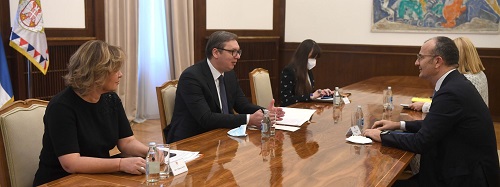
President Vučić and Ambassador Fabrizi discussed the process of harmonising the legislation of Serbia with the legislation of the European Union and agreed that more energetic work is needed in the area of the rule of law.
The two interlocutors also discussed judicial reform, including the constitutional process, the fight against corruption, media freedom and the resumption of inter-party dialogue.
Ambassador Fabrizi particularly underlined the need for concrete improvements to provide a suitable environment in which the freedom of the media and the role of civil society can be realised unhindered and without pressure.
President Vučić especially emphasised that he advocates that the representatives of all media do their job in an atmosphere of complete freedom of expression and that he remains personally committed to that since media freedom is one of the greatest achievements of democracy.
|
|
|
| Selakovic: Fight against all forms of crime is a priority of the Serbian Government - 8 March 2021 |
|
Minister of Foreign Affairs of Serbia Nikola Selakovic said today that the fight against all forms of crime was a top priority of the Serbian Government and an integral part of the EU accession process.
"It is also our moral duty, in order to leave a better world for the generations to come", Selakovic said participating via video-link at the 14th UN Congress on Crime Prevention and Criminal Justice, held in Kyoto.
Minister Selakovic emphasized that Serbia, in its Second Serious and Organized Crime Threat Assessment from 2019, identified as its goal to eliminate cybercrime, human trafficking, terrorism and irregular migration.
The Serbian Foreign Minister pointed out that our country had established in a timely manner a normative and institutional framework that regulates prevention of abuse in this area, as well as that the Office of the Special Prosecutor for Cybercrime, a special court department and a special police unit were established.
The Minister underlined that, in the field of the fight against corruption, Serbia was guided by the postulates set out in the UN Convention against Transnational Organized Crime and the UN Convention against Corruption.
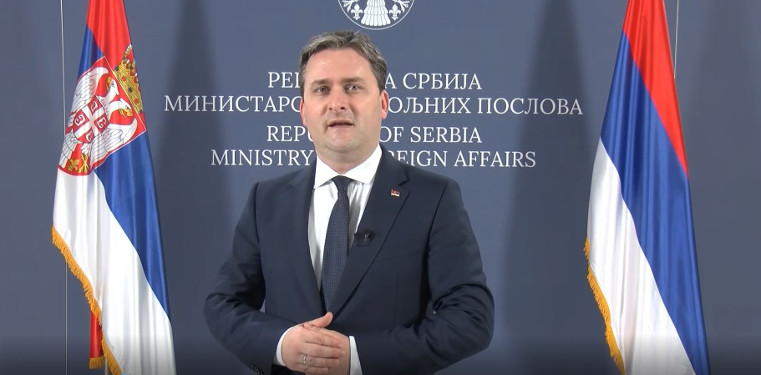 |
|
|
| Metropolitan Porfirije of Zagreb and Ljubljana elected as the new Patriarch of Serbia - 18 February 2021 |
|
The Holy Assembly of Bishops of the Serbian Orthodox Church elected His Eminence Metropolitan Porfirije of Zagreb-Ljubljana, PhD, as the new Serbian Patriarch, in its convocation in Memorial Cathedral of Saint Sava in Belgrade on 18 February 2021.
Immediately after the election a thanksgiving service was officiated and Many Years was chanted to the Archbishop of Pec, Metropolitan of Belgrade-Karlovci and Serbian Patriarch Porfirije. Bells at Saint Sava Cathedral in the Vracar district of Belgrade rang a few minutes before 4:00 pm indicating that the 46th Patriarch of Serbia was elected.
Newly-elected Archbishop of Pec, Metropolitan of Belgrade-Karlovci and Serbian Patriarch Porfirije (Peric) was born on 22 July 1961 in Becej, to father Radivoje and Mother Radojka. He was baptized as Prvoslav. He finished primary school in Curug, and the “Jovan Jovanovic Zmaj” Grammar School in Novi Sad. He was ordained a monk according to the rite of small schime by his spiritual father, then hieromonk Dr. Irinej (Bulovic), at Decani Monastery on Sunday of St. Thomas in 1985.
He graduated from the Faculty of Orthodox Theology in Belgrade in 1986, when the then Bishop of Raska-Prizren Diocese, future Serbian Patriarch Pavle of blessed memory, ordained him a hierodeacon at the monastery of Holy Trinity in Musutiste.
He attended postgraduate studies in Athens from 1986 until 1990. That year, upon the blessing of Bishop Dr. Irinej of Backa, he joined the monastery of Holy Archangels in Kovilj, where he was ordained as hieromonk and became its abbot.
Many young monks and novices came to the monastery following him. These were the years when the Kovilj Monastery became a spiritual center for many young people: intellectuals, artists, popular actors and rock musicians, especially from Novi Sad and Belgrade. Since then abbot Porfirije has particularly dealt with drug-addicted patients. In 2005, he formed for this purpose a therapeutic community called “The Land of the Living”, which is recognized as the most successful drug-addiction therapy project and, under the leadership of Bishop Porfirije, it has more than a hundred residents in camps throughout Serbia today.
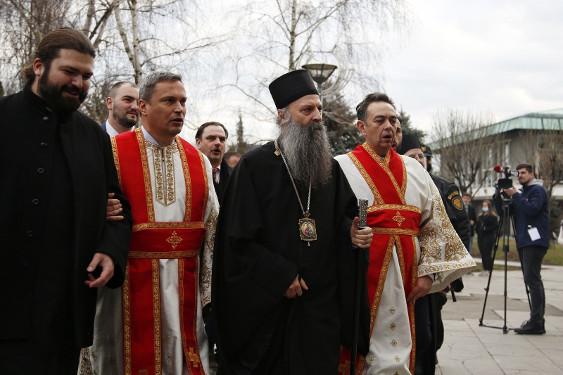
|
|
|
| Statehood Day of the Republic of Serbia -15.02.2021. |
|
Honouring Statehood Dau of the Republic of Serbia, Ministry of Foreign Affairs of the Republic of Serbia has prepared video material which you can view it here.
|
|
|
| President Vucic: Serbia is ready for dialogue on Kosovo and Metohija, but will refuse being humiliated - 07.02.2021. |
|
President of the Republic and Supreme Commander of the Serbian Army Aleksandar Vucic attended a demonstration of capabilities of one part of Serbian Army units in the "Rastko Nemanjić" barracks in Pancevo. On this occasion, President Vucic stated that Serbia was ready to continue the EU-facilitated dialogue with Pristina at any point, while respecting also the position of the United States as well as the positions of Russia and China.
The President said that he would rather put his "head on the chopping block" than sign any document with a recognition and reminded that he had already once refused to do so in Washington, where there were two versions of the agreement.
He stated that he immediately had his delegation leave the meeting, that he told the U.S. delegation that Serbia would not sign such an agreement, while conveying that Serbia would always endeavour to hold peaceful talks in order to preserve peace, but that it would not take any humiliation.
The Serbian President thanked the U.S. President Joe Biden for the letter of congratulations on the occasion of the upcoming Statehood Day, in which, in addition to the usual emphasis on commitment to promoting economic cooperation, regional stability and democratic values, he unequivocally called for mutual recognition of Serbia and "Kosovo" as a result.
Mutual recognition between Serbia and "Kosovo" is not part of any act of any world organization, the President pointed out and reiterated that Serbia was ready to continue the EU-facilitated dialogue with Pristina at any point, while respecting also the position of the United States as well as the positions of Russia and China.
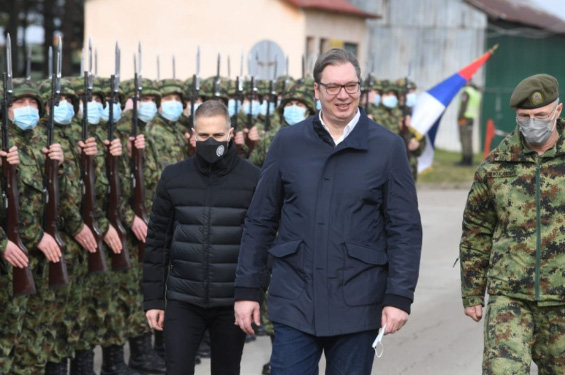
|
|
|
| Minister Selakovic: We do not respond to provocations, we want peace in the region |
|
Minister of Foreign Affairs Nikola Selakovic stated today that the position of Serbia was not to respond to the provocations of certain politicians from the region, because, he pointed out, it was determined to remain the factor of peace and stability in the region. Asked by the journalist to comment on Serbia's relations with other countries in the region in the context of more and more frequently heard provocative statements about our country, Minister Selakovic said that Serbia did not want to respond to provocations but to be the protagonist of all good initiatives bringing development to the region.
"Serbia's position in the region, politically speaking, is anything but simple, but what we will not give up on and in which we are completely determined is that Serbia is, will be and should remain the factor of stability in the region", Selakovic said.
He pointed out that the state demonstrated its role as a "factor of stability in the region" in several ways, including by refraining from commenting on and responding to provocations.
"There have been constant provocations, and as you are well aware, in previous decades, it was a kind of a hobby or regular activity to call out Serbia during the election campaigns in the region", Selakovic stated. He added that the state leadership never reacted to those provocations in a way that could be detrimental to our country as well as to others.
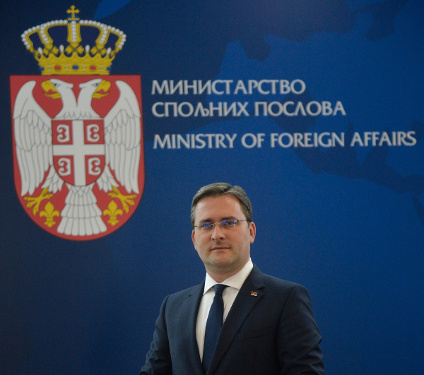
"On the other hand, we demonstrate our resolve to remain the factor of stability in the region, aiming to preserve political stability and peace, through our initiatives", Minister Selakovic pointed out, adding that "mini-Schengen" was one of these initiatives.
He recalled that the initiative advocated a tight market connectivity in the region and also that it was an opportunity for the entire region to strengthen its infrastructure and economy. Furthemore, the initiative implied the freedoms on which the EU is based upon - free flow of goods, people, capital and ideas, Selakovic said.
"This is the kind of initiatives Serbia has been presenting to its partners in the region, as the protagonist of those ideas", Selakovic underlined. He emphasized that in the period ahead, the focus would be on having other countries in the Western Balkans join "mini-Schengen".
Source: Tanjug
|
|
|
| Meeting with the Head of the Delegation of the European Union to Serbia - 4th February 2021 |
|
President of the Republic of Serbia Aleksandar Vučić met earlier today with the Head of the Delegation of the European Union to Serbia, Ambassador Sem Fabrizi, to discuss Serbia's European path, continuation fight against the COVID-19 pandemic, implementation of political and economic reforms, with particular emphasis on the rule of law and plans for new EU investments in our country.
President Vučić thanked the EU for its support to Serbia in structural reforms and economic measures and the EU investments in our country. The President especially expressed hope that the first contingents of vaccines from the COVAX programme promoted by the European Union will arrive soon.
"Serbia was among the first to join this programme, thus showing once again that it is a serious and reliable partner of the European Union. I am convinced that together, with solidarity and mutual understanding, we will manage to get out of this crisis and continue working to recover the economy," said President Vučić, adding that the EU is the most important foreign trade and investment partner of our country since two-thirds of our trade and investments are related to EU countries.
The Head of the EU Delegation, Sem Fabrizi, affirmed that the EU will continue with solidarity to the fullest extent and that it will continuously work on ensuring the distribution of vaccines both in Serbia and in the Western Balkans countries. He expressed satisfaction with the Government of Serbia's results, especially emphasising that timely and decisive measures taken in the fight against the coronavirus contributed to maintaining the country's economic stability during the pandemic.
"Thanks to the current structural reforms, Serbia, in line with the accession process, has shown resilience to the crisis and the ability to mitigate the effects on the economy with excellent results in the healthcare area", Sem Fabrizi said, stressing that the pandemic did not affect the undoubted commitment of the Western Balkans to the EU process.
Ambassador Fabrizi also introduced President Vučić to the new head of the EIB's Office for the Western Balkans, Alessandro Bragonzi, who pointed out that it was a great honour for him to take over activities for the region at a time when it is facing such a difficult crisis.
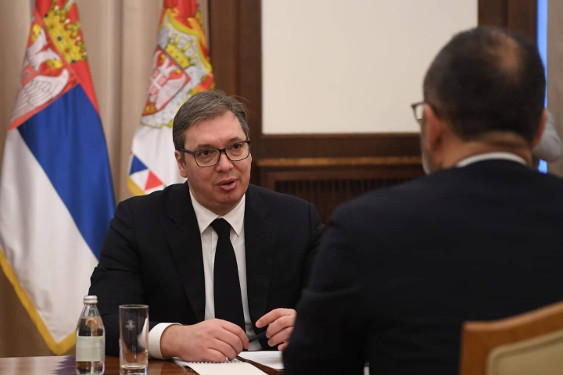
|
|
|
| Minister Selaković: Serbia is committed to the values of the Adriatic and Ionian Initiative - 28.01.2021. |
|
Serbia is committed to the values of the Adriatic and Ionian Initiative and its corresponding Strategy, as a framework within which we conduct activities that strengthen the European path of our country, all the while creating an even better place to live in together with the participating EU Member States, Minister of Foreign Affairs Nikola Selaković said at the video-conference of the Fifth Forum of the EU Strategy for the Adriatic and Ionian Region.
"Despite the difficult challenges faced amid the coronavirus pandemic, during its Chairmanship of the Adriatic and Ionian Initiative, Serbia succeeded in maintaining continuity in the implementation of the fundamental values adopted by signing the Ancona Declaration", Minister Selaković stated today.
The Serbian Foreign Minister said that our country was committed to the values of the Adriatic and Ionian Initiative (AII) and that when its assumed its yearlong Presidency of the Initiative and Chairmanship of the EU Strategy for the Adriatic and Ionian Region, it had ambitious plans - first and foremost, Serbia had planned to continue to deepen cooperation in the framework of the Adriatic and Ionian region
The Minister explained that, through joint efforts, concurrently with the traditional activities, Serbia managed to continue pursuing the so-called new activities launched during the previous chairmanship.
"The process aimed at expanding AII participation demonstrated in last year’s Budva Declaration, and the admission of North Macedonia and of San Marino to membership of the Initiative successfully continued during the chairmanship of the Republic of Serbia too", Selaković said.
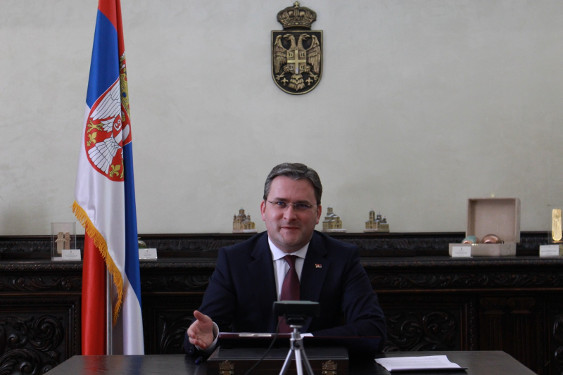
|
|
|
| Minister Selakovic speaks for Politika: The year of rejuvenation of Serbian diplomacy - 26.01.2021. |
|
Serbia's foreign policy positions are naturally being adjusted to the new developments at the international level, but our foreign policy priorities have not changed in a long time. Our top and most important interest is to preserve good-neighbourly relations and stability and peace in the region and, in the same context, to find a peaceful and just solution to the problems in Kosovo and Metohija, Serbian Foreign Minister Nikola Selakovic said in an interview with Politika daily.
Another lasting interest of ours is full membership of the European Union, because this is the type of society we strive for. At the bilateral level, our goal is to strengthen ties with traditional friends, the Russian Federation and the People's Republic of China, but also to build new partner relations with the United States. One of the most important tasks of our foreign policy is to improve the position and protect the rights and identity of our people in the region, as well as to provide various types of support to Serbs in the diaspora. All these are very important and more often than not complementary goals, Nikola Selakovic pointed out.
What kind of relations do you expect Serbia to have with the new U.S. administration?
It is too early to speculate about this in public. The new presidential administration in Washington is currently preoccupied with internal issues and this will be the case for some time. There are people in the team of President Joseph Biden who have dealt with our region, and it is likely that the Balkans and Serbia will be the focus of the U.S. foreign policy at some point. I will remind you that President Vucic and President Biden not so long ago had very substantive talks in Belgrade, after which our President stated that he had the opportunity to talk to someone extremely well acquainted with the situation in this part of the world and an extraordinarily prepared interlocutor. Taking their personal relationship into account, but also the importance of enhancing the ties between Serbia and the United States, we have reason to expect that a meeting between the two presidents will be organized in the foreseeable future. I am sure that the nature and dynamics of the relations between Serbia and the United States will be influenced by the fact that Ambassador Marko Djuric now represents us in Washington, whose presence at President Biden's inauguration ceremony is an important signal and, I believe, a harbinger of positive developments in bilateral relations between our two countries.
How would you describe our country's relations with Moscow, Brussels and Beijing?
Russia is our traditional friend and that friendship goes beyond merely political ties. These are deep spiritual, cultural and civilizational bonds, and it is only natural that we have a mutual interest in improving those ties, even though they are at a very high level. We have a relationship with the People's Republic of China which is, in addition to the sincere iron-clad friendship between our peoples and high political representatives, based on deep trust and mutual support. Full membership of the European Union is Serbia's strategic orientation that all our friends are aware of, but our country does not forget its friendships, but strengthens and promotes them instead, and approaches all with honesty and no ulterior motives. In this context, we do not seek any preferential treatment, but only the right to freely and independently make decisions about our future and relations with all who respect us.
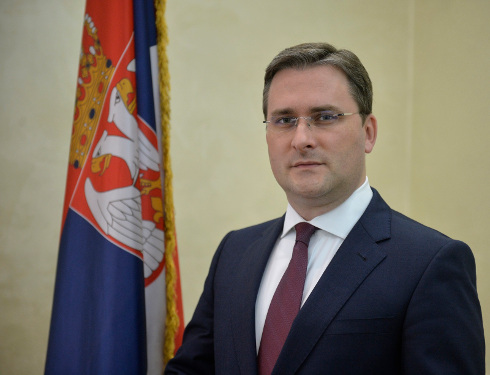
|
|
|
| President Vucic: Serbia is the first in Europe in terms of growth - 12 January 2021. |
|
Serbian President Aleksandar Vucic pointed out that Serbia is the first in Europe in terms of economic growth, which will be officially confirmed at the end of March, and that this was possible owing to the reform measures taken since 2014 and the rapid opening of the country after the first wave of corona virus.
The President pointed out that Serbia had a growth of 5.2 percent in the first quarter, while the Eurozone was at minus 3.2 percent, in the second quarter Serbia had a growth of minus 6.3 percent, while the Eurozone was at minus 14.7 percent, and in the third quarter, when the Eurozone was at minus 4.3 percent, Serbia's figure was only minus 1.4 percent.
Vucic stated that Montenegro, for example, recorded as much as 26 percent minus in the third quarter.
Furthermore, the President emphasized that hospitals were built and renovated in our country, and that two hospitals were built from the ground up in just four months.
He said that the state made significant efforts to procure respirators, masks, gloves, protective suits, medicines, everything that was needed, and pointed out that work was being done on 10 general hospitals throughout Serbia, adding that all these were major achievements that were only possible owing to the success of the 2014 reforms, the enactment of the Labor Law, which yielded excellent results, and also through fiscal consolidation measures.
"These are unprecedented results for Serbia. Was Serbia ever before the first in Europe in terms of growth rate? We will get the results on 31 March that will confirm that Serbia is number one in Europe. All that was possible thanks to people who believed in difficult changes", Vucic said.
According to the President, this year, as many as six highways will be built in Serbia at the same time, and in this regard, he noted that Bulgaria has announced that the highway from our border to Sofia will be completed by the end of the year, after which it will be possible to use motorway to travel to Istanbul, which is very important to ensure that our country is on a transport route.
President Vucic emphasized that in 2020, the so-called year of corona, our country had a net inflow of foreign direct investment amounting to EUR 2.9 billion net, and three billion gross, which means that many foreign companies such as Toyota Tires, Boysen, ZTF and Brose have invested in Serbia even in this year of crisis.
The President said that Serbia has the highest average wages in the region, amounting to 511 or 512 euros, and that in February, due to the January increase, the average wage will be 535 or 536 euros, and that only in Belgrade in the last seven years the average wage increased by 180 euros or 40 percent.
.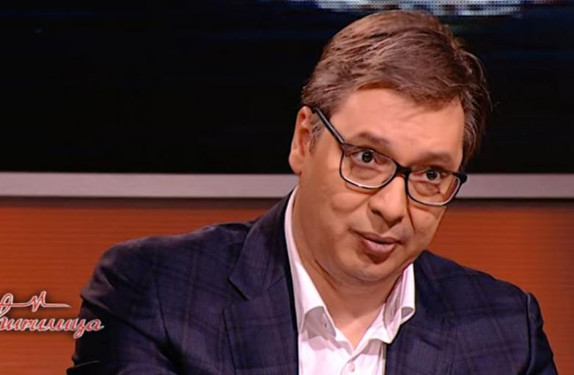
|
|
|
| Every Serb in the diaspora is potentially a lobbyist - 3 January 2021 |
|
Our compatriots living abroad are one of the great potentials that the state has not recognized in the right way so far, which is why a different approach is needed to the issue of how to strengthen our diaspora and use the good will of people who are potential lobbyists for the interests of Serbia and the Serbian people, Foreign Minister Nikola Selakovic said.
"When it comes to Serbs in the diaspora, and especially in the region, this issue has been a kind of an unattended crop which requires a lot of work, and even when a lot is done at once this is not apparent immediately ", Minister Selakovic stated in an interview with Tanjug.
He emphasized that the appointment of the Director of the Office for Cooperation with the Diaspora and Serbs in the Region for the first time after almost seven years since this body was formed within the Ministry of Foreign Affairs, shows that it is one of the priorities of the Ministry he is at the helm of.
Selaković notes that intensive efforts have been long underway on forming a plan to make the diaspora more visible both outside the borders of Serbia and in the mother country itself.
"Every person in the diaspora is a potential lobbyist for the interests of our country and people, and we need to find the right way to use that", he said.
That much can be done in that regar Selakovic illustrates with the fact that only in Switzerland, in 24 cities, there are Serbian cultural and artistic associations which amounts to more than 3,000 young people who get together in order to preserve our tradition, culture, the Serbian language and history.
"If they were able to set up such associations in 24 cities, it speaks volumes about the enthusiasm of these people. There is so much enthusiasm, energy and love in these people. We need to explore ways to help them and use their good will and potential", the Minister points out.
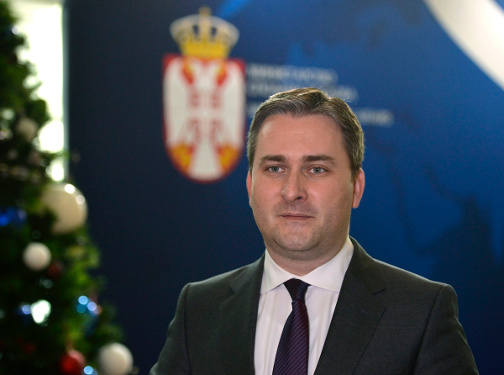 |
|
|
| Minister Selakovic: New ambassadors will be appointed this year, but the goals remain the same - 2 January 2021. |
|
This year, Serbia could finally have Ambassadors and Consuls General appointed to about a third of the currently vacant positions in the country's diplomatic and consular missions in the world, and Minister of Foreign Affairs Nikola Selakovic is convinced that most of these positions will be filled, as he points out, by the best possible people.
"In the next year, I am convinced that the majority of these vacancies will be filled", Selakovic told Tanjug, emphasizing that the work is being done gradually, because the state wants to show that is has a quality staff who will represent Serbia's interests in the best possible way.
The Head of Serbian diplomacy reminded that in a number of diplomatic missions, the four-year mandate of Ambassadors and Consuls General has already expired, so that the procedure for appointing new ones will follow, after their recall.
One of the "vacant" spots is the post of the Serbian Ambassador to China.
"We are working hard to find the best possible solution for our new Ambassador to China and as we appointed one of the best people in the state system as Ambassador to the United States, who, I am sure, will perform his duties in the best possible way, I am convinced that it will be the same for the Ambassador in Beijing", Selakovic said.
The Minister, who took over the foreign policy sector in the Government a little over two months ago, points out that circumstances in the world, as well as Serbia's position in it, have changed, but that Serbia's foreign policy goals do not change: the country remains strategically committed to European integration and, while pursuing the EU path, it will also strengthen traditional friendships with Russia and China, as well as promote and strengthen new partner relations with the United States.
"Relations in the region, good-neighborly relations, regional cooperation are also important for Serbia, because this fits into the set of requirements on the European path. But, even regardless of the European path, it is always important who you live next to, who you live with, what your neighbors are like and what the relations are like in the neighborhood", Minister Selakovic said.
He also points out that the issue of Kosovo and Metohija is of inestimable importance, it being the main national and state issue for Serbia and the Serbian people.
"When I say that circumstances are changing, but not the goals - the EU and European integration was our goal seven years ago as well, but look at what our room for maneuver was then, in terms of economic aspects, and look at it today. Circumstances changed, and then you adjust your actions to these changed circumstances, to the best extent possible", Minister Selakovic said.
He reminds that foreign policy priorities for 2021 were also outlined by the President of the Republic, and that maintaining peace and stability in the region is the absolute priority.
"Only in a peaceful and stable region of the Western Balkans and Southeast Europe can Serbia thrive economically, culturally and scientifically - in every respect. Peace and stability in the region are “sine qua non” without which there is no development and progress. Serbia has acted, is acting and will act as a factor that stabilizes the entire region and maintains peace in the region, showing that it is the region that benefits everyone the most", Minister Selakovic said.
Relations in the region have always been complex, and the region, Minister Selakovic noted, is to our great regret, burdened with issues that we cannot have a bearing on, and which concern
the past.
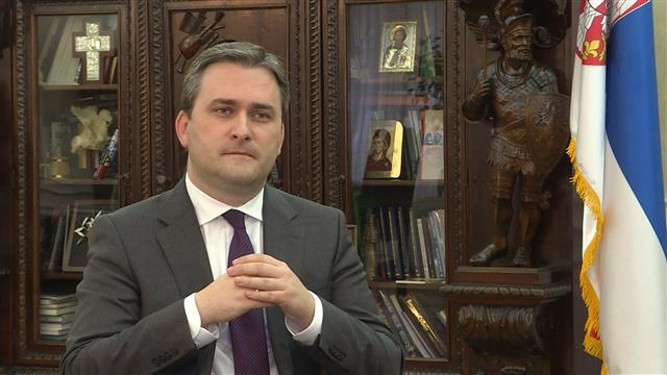
|
|
|
| Serbia donates €1 million to Croatia to repair damage from earthquake |
|
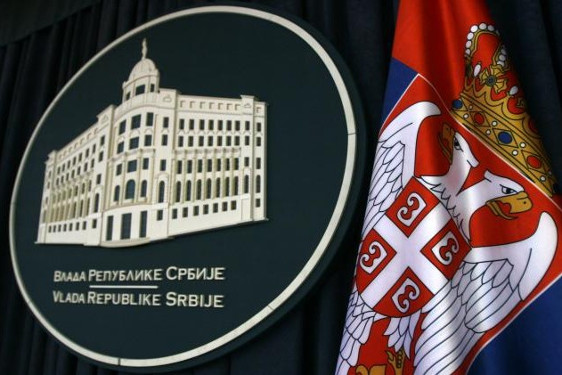
At today's session, the government of the Republic of Serbia made a decision to send the amount of €1million to the Republic of Croatia as financial assistance for repairing the damage caused by the devastating earthquake that hit our neighbouring country.
Members of the government expressed regret over the human lives lost in this natural disaster, and the funds were intended to help rebuild the destroyed buildings, many of which are of public importance.
Belgrade, 30 December 2020. |
|
|
| President Vucic: Serbia to remain on the course of a winning policy of stability - 29 December 2020. |
|
Preservation of peace, taking care of the health and better living standard are key for Serbia in 2021, underlined President of the Republic Aleksandar Vucic, convinced that even though the completion of this ambitious and by no means easy task will be anything but straightforward, best results can be achieved by working in concert with the Government, while ensuring security and a future of certainty for the citizens.
The President said that Serbia has set for itself great and ambitious goals for the next year, notwithstanding the complex international and regional circumstances, and that it will endeavour to fully preserve peace and stability in the region and the country, while safeguarding the vital national and state interests.
"Serbia will remain on the course of a winning policy - the policy of stability", President Vucic said and stressed that our country remains on the European integration path and that it will carefully foster its friendship with Russia and China, while building a friendship with the United States as well.
According to the President, Serbia will continue to pursue a winning policy, with the country itself as a top priority, i.e., a policy that will enable Serbia to continue being one of the top three countries in Europe in terms of growth rate in the next two years.
A precondition for that, the President noted, is to crack down on criminal groups, but also to ensure even bigger investments in the police and army forces.
"Serbia is the country that recorded the highest growth in Europe in 2020", the President pointed out at the annual press conference and added that he expects to conclude a new arrangement with the IMF, as well as that Serbia, by the end of next year or early 2022, will raise its credit rating to an "investment" one, which will put our country's rating on par with the most developed EU countries.
As the greatest success in 2020, Vucic noted that Serbia will end the year with the highest growth rate in Europe, which, as he said, is expected to be from minus 0.75 percent to minus one.
"I am proud to be the President of a country that is the European champion in terms of GDP", Vucic pointed out and added that German Chancellor Angela Merkel was also pleased with Serbia's success
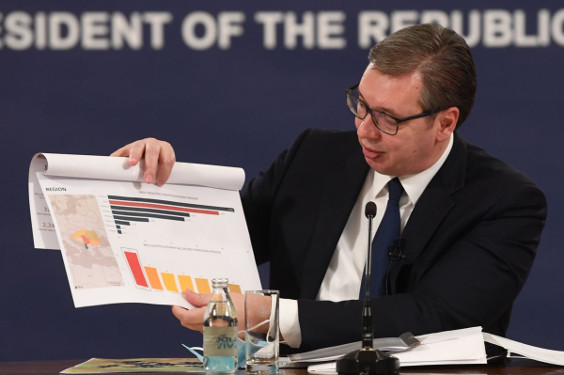
|
|
|
| Serbian Prime Minister the first PM in Europe to receive a Covid-19 vaccine |
|
Prime Minister of the Republic of Serbia Ana Brnabic received today the first vaccine against the coronavirus made by Pfizer company, at the Torlak Institute of Virology, Vaccines and Sera.
Brnabic, who is the first European Prime Minister to receive the vaccine, pointed out that this day may be the first since 6 March that we have a reason for a smile on our faces as it marks the beginning of the end of the coronavirus pandemic in Serbia, but also in Europe and the world.
As Prime Minister and as someone who leads the COVID-19 Crisis Response Team, I felt obliged to be the first to receive the vaccine, to show that we believe in it, as well as in our institutions - the Medicines and Medical Devices Agency of Serbia and experts who worked round the clock to test the vaccine, she said.
Underlining that it was an honour to do this for her country and be the first to pave the way for all citizens, the Prime Minister said that she agreed with President of the Republic Aleksandar Vucic that the two of them receive different vaccines, so he will most likely receive the next one that arrives, most probably the one produced by China.
At the moment we have the Pfizer-BioNTech consortium vaccine, and the vaccines from the Chinese Sinopharm are expected in the near future, as well as certain quantities of the Russian vaccine Sputnik V.
She expressed her belief that at the end of the first quarter or the beginning of the second quarter of next year we will have the vaccine of the company AstraZeneca, and after that the vaccine manufactured by Moderna.
As we promised, all vaccines licensed in their countries and approved by relevant international agencies will be available to our citizens, and of course they will be tested by all of our agencies and institutes as well, the Prime Minister pointed out.
She said that prior to the vaccination of health care workers, Minister of Health Zlatibor Loncar will also receive a vaccine shot as we endeavour to serve as an example and show how confident we are in the vaccines and institutions.
Brnabic pointed out that Serbia, not counting Great Britain, is the first country in Europe to receive the Pfizer-BioNTech vaccine, and the third to start a mass immunization and campaign for giving the vaccine - after Great Britain and Switzerland.
We achieved something very important and we will not stop even for a moment until the immunization of the population is completed, the Prime Minister said.
She specified that our country will receive another 16,000 doses of Pfizer-BioNTech vaccine in January, as well as that together with other vaccines we will have a total of one million doses in January, and a total of approximately two million doses during the first quarter of next year.
There is a dynamic on which Pfizer delivers vaccines and it varies depending on the production, and this is the case with deliveries to both Serbia and all other countries worldwide. We expected to receive 10,000 doses from Pfizer-BioNTech in December, however 4,807 doses arrived, the Prime Minister explained.
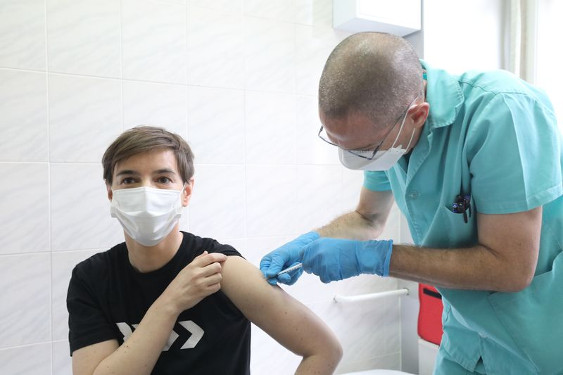
|
|
|
| Minister Selakovic met with leadership of the Danube Commission in Budapest |
|
Minister of Foreign Affairs of the Republic of Serbia Nikola Selakovic met today in Budapest with leadership of the Danube Commission and discussed importance of the Danube for the promotion of regional economy and an intensive flow of people and goods.
The interlocutors assessed that it is important to use the economic potentials of the Danube, but also to preserve its natural beauties, i.e., to meet the environmental standards.
Minister Selakovic emphasized that Serbia will be able to invest more in infrastructure on the Danube, owing to the successfully implemented reforms in the past years, and to take part in the implementation of the strategic projects of the Danube Commission.
Minister Selakovic wrote into the visitors' book that, since it was founded in Belgrade in 1948, the Danube Commission has been a thread of cooperation and friendship among the member countries.
"The Danube was a river of peace throughout all the difficult periods in the turbulent history of our region", Selakovic wrote down.
Source: Tanjug
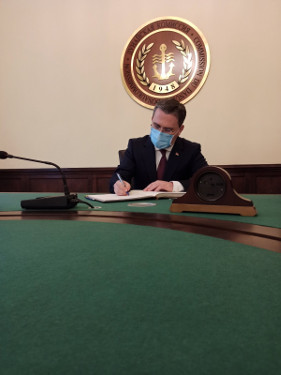
|
|
|
| Minister Selakovic: Full EU membership remains a priority of the new Government |
|
Minister of Foreign Affairs of the Republic of Serbia Nikola Selakovic had talks today via video link with Head of EU Delegation in Serbia Sem Fabrizi and Ambassadors of the EU Member States.
On this occasion, the Serbian Foreign Minister emphasized that full membership of the EU remained one of the key foreign policy priorities of the Serbian Government, and that the European integration process was a strategic goal also aimed at promoting the quality of the society.
Minister Selakovic pointed out that Serbia was ready for an acceleration of the accession process' dynamic which is why it accepted the new methodology in the first place, and that it is now hoping that it will, in the period ahead, receive clearer guidelines on its implementation in the negotiating process.
The Minister said that Serbia has taken a number of important steps forward in the reform process, which were not fully reflected in the European Commission's Annual Progress Report.
The Minister reminded that our country opened 18 out of 35 negotiating chapters with the EU since 2014, provisionally closing two, and that it is at this point ready to open five new chapters.
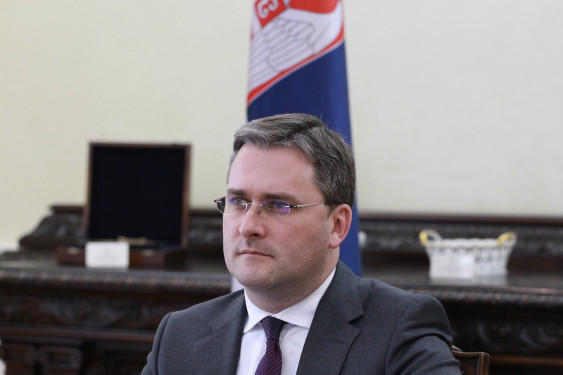 |
|
|
| Minister Selakovic: Someone in the region has an issue with economically strong Serbia |
|
Minister of Foreign Affairs Nikola Selakovic said that it was unacceptable to talk about the elimination of the Republic of Srpska as one of the entities in Bosnia and Herzegovina, stressing that Serbia maintained that the Dayton Accords cannot be amended unless all three constituent peoples and both entities agreed.
The Minister said for RTS that Serbia is a guarantor of the Dayton Accords and that it respects the territorial integrity of Bosnia and Herzegovina, but that no-one can prevent it from having love and caring for the Serbian people living there, in a way all other countries take care about their own people. He noted that Serbia and Russia share similar positions on the Dayton Accords, which is important for the stability of the region.
Minister Selakovic said that the Dayton Accords are a complex political and military mechanism which established peace after a bloody conflict in the territory of Europe and that, as such, it contains a number of details whose amending can cause chain reactions.
Referring to the articles from the Croatian media stating, among others, that the only solution for the region is to break Serbia's back, Minister Selakovic said that he found it interesting that three influential media houses in Croatia on the same day issued three articles against Serbia, out of the blue, attacking the policy pursued by Serbia and its strategic activity as well as its right to care about Serbs in Kosovska Mitrovica, Montenegro and the Republic of Srpska.
"Breaking one's back, an axis, these words bring back the talk and narratives from the previous periods...", Minister Selakovic said.
He said that the approach of the Serbian President Aleksandar Vucic is absolutely opposite one and that he keeps saying that it will be good in Serbia when everyone around it is good as well, which is the key of his foreign policy initiatives in the region.
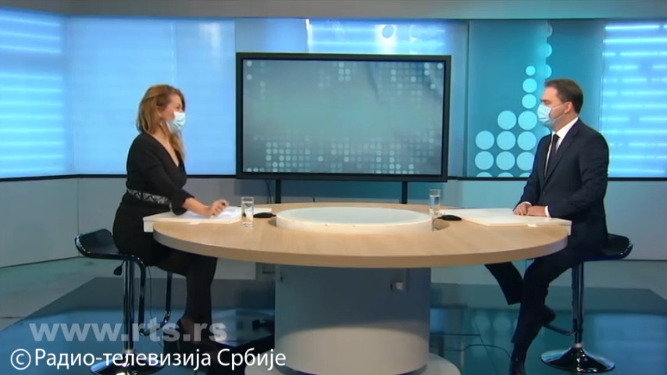 |
|
|
| Brnabic and Borrell: Political and economic aspects of negotiations |
|
The Serbian government stated that at a meeting of the Stabilisation and Association Council between Serbia and the EU held today, the overall progress achieved in Serbia's accession negotiations so far was commended, as well as the adoption of an improved enlargement methodology that should accelerate Serbia's EU accession process.
The participants in the meeting exchanged opinions on the current political and socio-economic situation in Serbia, and above all on the further dynamics of negotiations on EU accession, cooperation within the Common Foreign and Security Policy, as well as regional cooperation in the Western Balkans.
Accordingly, they welcomed the fact that the new government has placed European integration, preserving public health and economic growth, as well as normalising relations with Pristina at the top of its priority list.
At the meeting held via video link due to the pandemic, the Serbian delegation was led by Prime Minister Ana Brnabic and Minister for European Integration Jadranka Joksimovic.
The EU delegation was headed by High Representative of the EU for Foreign Affairs and Security Policy Josep Borrell and European Commissioner for Enlargement Negotiations Oliver Varhelyi.
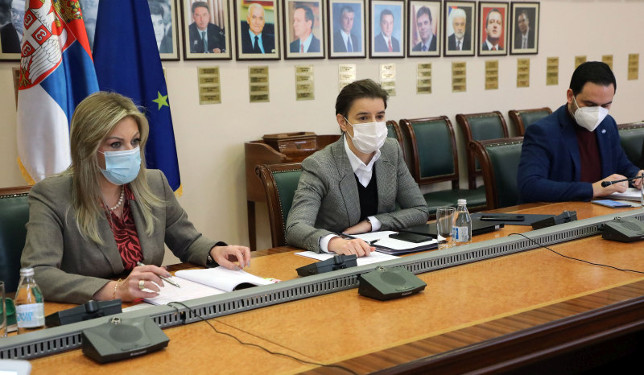 |
|
|
| J. Joksimović and Roth on Serbia’s negotiations and new methodology |
|
Minister of European Integration Jadranka Joksimović has held a video meeting today with Michael Roth, the Minister of State for Europe at the German Federal Foreign Office. They have discussed the current epidemiological situation in the two countries and the EU, as well as Serbia’s European integration process.
Joksimović and Roth have also talked about the issues related to the EU’s internal situation, particularly regarding the new seven-year budget, the place and the future of the enlargement policy and the Western Balkans, notably about all aspects of Serbia’s accession process, challenges and expectations from the new methodology, which should bring a faster negotiation process that would be better monitored and directed under stronger political steering.
Joksimović has particularly informed Roth about the fact that the Government of Serbia prepared a concrete implementation plan for the first negotiation cluster on the rule of law, which comprises five rule-of-law chapters that have already been opened, adding that the realisation of the plan has already begun.
“This serious implementation plan includes a repeated initiative sent to the National Assembly for the adoption of constitutional amendments, the adoption of the Action Plan for the implementation of the Media Strategy, as well as the Working Group on monitoring the implementation of the Action Plan and the Working Group on journalist safety and protection”, said Joksimović, according to the press release published by the Ministry of European Integration.
She has also stressed that GRECO recommendations for the fight against corruption have been published in a transparent way, and that further actions will be taken in line with them.
She has further presented all other important segments of Serbia’s reform policy in all six clusters, including Green Agenda, digitisation, Economic and Investment Plan for the WB, and stable and sound macroeconomic indicators, stressing that, therefore, this year, Serbia has again undeniably demonstrated that it deeply and substantively participates in key EU policies and that it is a credible European country.
Joksimović has emphasised that Serbia understands that the EU and member states will need some more time to define the application of the new methodology to Serbia’s negotiation process, and that it is therefore important to maintain a constant and open dialogue so as to direct the process in line with the new methodology.
She has expressed regret that conclusions on enlargement have not been adopted this year and that, consequently, the political Intergovernmental Conference with Serbia has not been held during the German presidency.
On the other hand, the Minister has expressed belief that the upcoming Stabilisation and Association Council will offer an opportunity to discuss all political and economic aspects of Serbia’s process at the highest level.
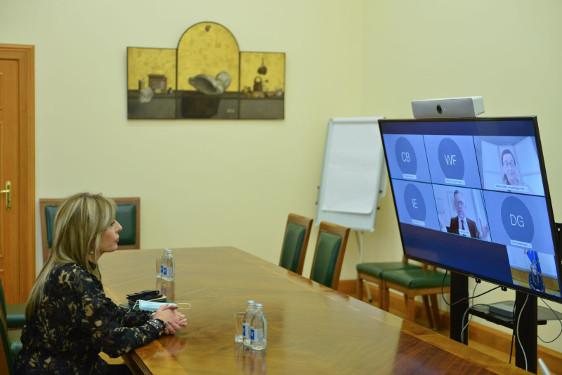 |
|
|
| STATEMENT BY THE MINISTRY OF FOREIGN AFFAIRS |
|

On the occasion of 10 December, the international Human Rights Day, the Ministry of Foreign Affairs of the Republic of Serbia reaffirms its commitment to the principles and values of the Universal Declaration of Human Rights, adopted on this day in 1948.
The principles enshrined in the Universal Declaration of Human Rights have been the foundation for the development of international law in this field, and of the international system for the promotion and protection of human rights, as a unique achievement of modern civilization. It is incumbent upon us today to safeguard and strengthen the international system ensuring respect for human rights, to develop human rights standards, control the implementation of commitments, and also to continue cooperating with international and regional institutions on the protection of human rights.
Serbia is fully committed to the universal values of human rights and implementing in practice the international legal instruments relating to human rights. Our continued cooperation with the Human Rights Council mechanisms in the framework of the United Nations, with the Council of Europe and the mechanisms of the OSCE human dimension, represents an important segment of activities carried out by all state authorities, thus demonstrating our consistent commitment to the implementation of international human rights standards.
The international Human Rights Day is an opportunity to point out once again that Serb and other non-Albanian population is being deprived of its rights in Kosovo and Metohija and to call again on the international community to ensure the respect for the guaranteed international human rights norms and contribute to creating conditions for the return of internally displaced persons and giving them back their usurped property.
|
|
|
| President meets the ambassadors of the EU member states accredited to Serbia and the head of the European Union Delegation |
|
The President of the Republic of Serbia Aleksandar Vučić met today the ambassadors of EU Member States accredited to Serbia and the Head of the EU Delegation Sem Fabrizi in the Palace of Serbia, to talk to them about topics such as dynamics of the accession negotiations between Serbia and EU, stability in the region, regional projects, as well as the Economic and Investment Plan presented by the European Commission together with the Enlargement package.
President Vučić once again confirmed that cooperation with the European Union and fully-fledged membership of Serbia remain one of the key foreign policy priorities of our country. He particularly emphasised that in this respect Serbia is honestly dedicated to further and deeper reforms, approaching them with responsibility and seriousness, and that it tries to adopt and apply the best practice through cooperation with institutions of the EU and its member states.
"Serbia will continue being dedicated to the promotion of peace and stability in the region, by improving bilateral relations with neighbours, and by strengthening regional cooperation while respecting all concluded agreements", President Vučić stated, adding that the European future of the Western Balkans is of utmost importance for both stability of the entire region and security and further prosperity of the EU.
Ambassadors pointed out that declarations on the common regional market and the Western Balkans green agenda, which were signed by Serbia and all leaders of the region, received a warm welcome in Brussels and EU Member Stated, and that good and solid connectivity and integration of the region largely facilitates the cooperation of the very Union with the Western Balkans in all areas of joint interest.
"As much as 70% of foreign investments come from the countries whose representatives are sitting here today", Head of the EU Delegation to Serbia Sem Fabrizi said, adding that Serbia can rest assured the EU will continue supporting and investing in the Serbian economy. While Covid-19 has put all economies under stress, Serbian economy has resisted and proved its resilience. With the Economic and Investment Plan for the Western Balkans, the EU will remain Serbia's strongest partner for economic recovery which will support infrastructures, green and digital transition. We welcome the announced reforms in the areas of rule of law, including judiciary reforms and media freedom. This is precisely the base for acceleration of the accession process and we encourage the new government to keep working and implementing in this direction", Fabrizi said.
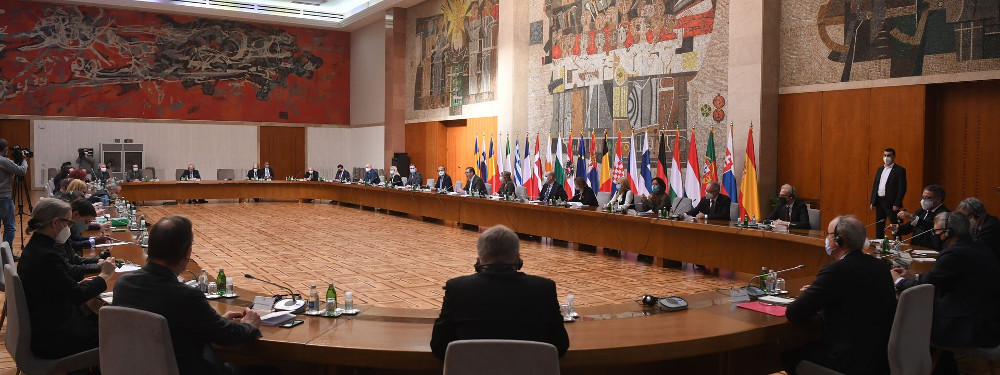
|
|
|
| Promotion of tourist potentials of the City of Belgrade |
|
On 4th July 2019 in Zagreb, Tourist Organization of Belgrade held Promotion of tourist potentials of the City of Belgrade. During promotion, opened by Ambassador of the Republic of Serbia in Croatia, H.E. Ms. Mira Nikolic, representatives of TOB presented forthcoming events in Belgrade, showed promotion movie and conveyed several prizes to the audience. At the end, famous Serbian actors and artists Ms. Tanja Boskovic and Mr. Rade Marjanovic, performed a Cabaret show “Welcome to Cabaret Belgrade”.
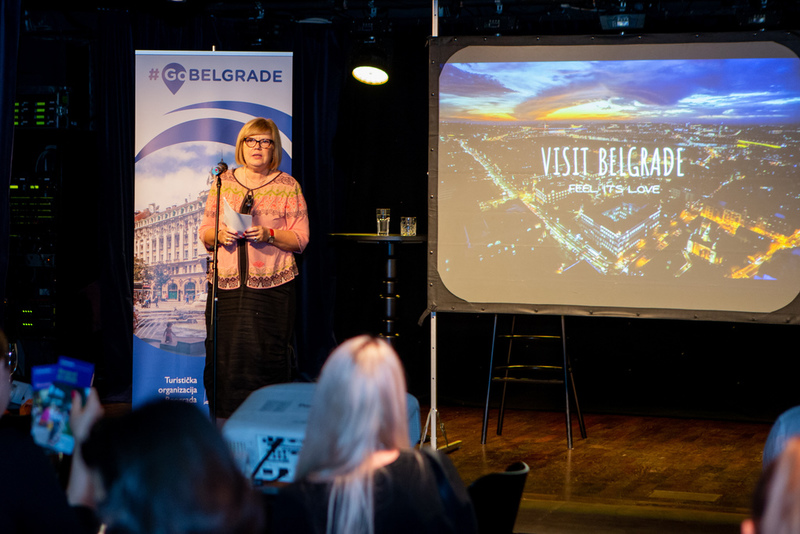 Photo: Place2design d.o.o. Photo: Place2design d.o.o.
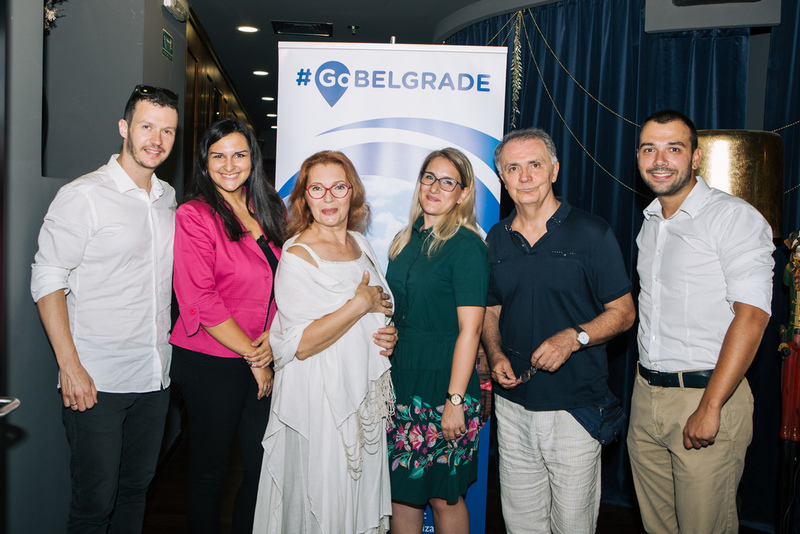
Photo: Place2Design d.o.o. |
|
|
| Jadovno 1941 Remembrance Day |
|
Representatives of the Embassy of the Republic of Serbia, laid flowers on the Monument near "Saranova pitt", on the occasion of the "Jadovno 1941 Remembrance Day". Respect to the victims of the "Ustase" regime where payed by the large number of representatives of Serbian and Jew communities in Croatia, antifashist movement and other citizens that gathered there.
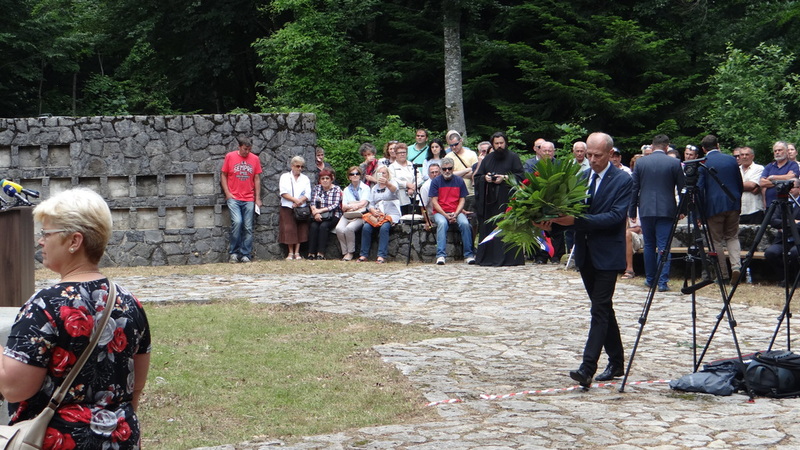
|
|
|
| “National Minorities of City of Zagreb Day”, 16th June 2019 |
|
Representatives of the Embassy participated at the “National Minorities of City of Zagreb Day” on 16th June 2019 in Zrinjevac Park, where 18 national communities of the City of Zagreb, among which Serbian, had an opportunity to present their customs, tradition and literature.
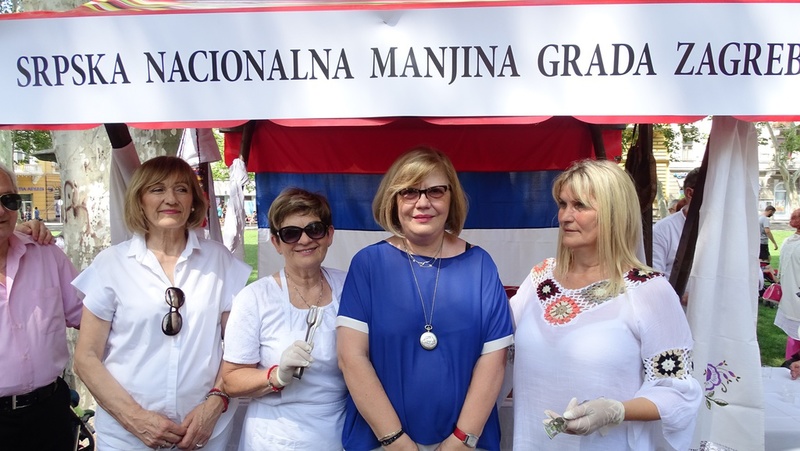
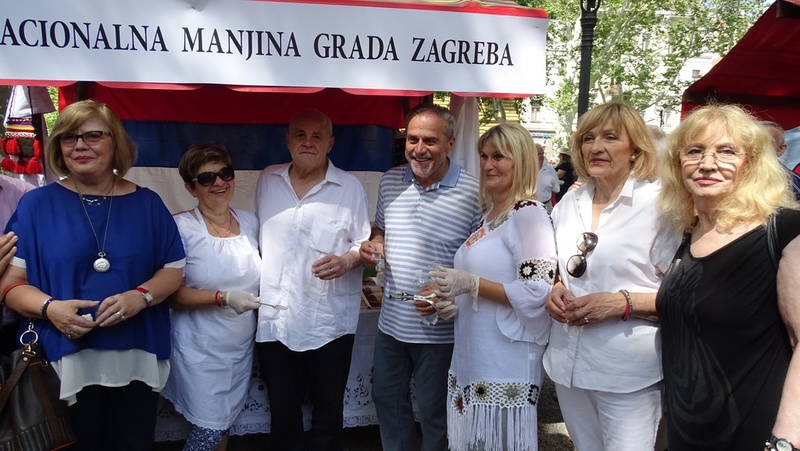
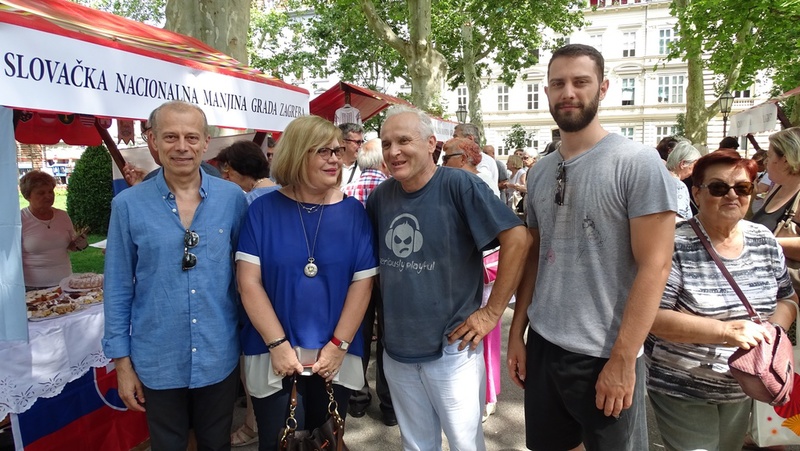 |
|
|
| Participation of the Embassy at the “Days of Friendship”, 14th June 2019 in Sunj |
|
Ambassador of the Republic of Serbia H.E. Ms. Mira Nikolic and Mr. Dejan Djordjevic, Defence Attache, participated at the “Days of Friendship”, on 14th June 2019 in Sunj, in organization of Croatian-Russian Friendship Society from Sisak, Croatian-Serbian Friendship Society from Sisacko-Moslovacka County and Croatian-Norwegian friendship Society from Sunj.
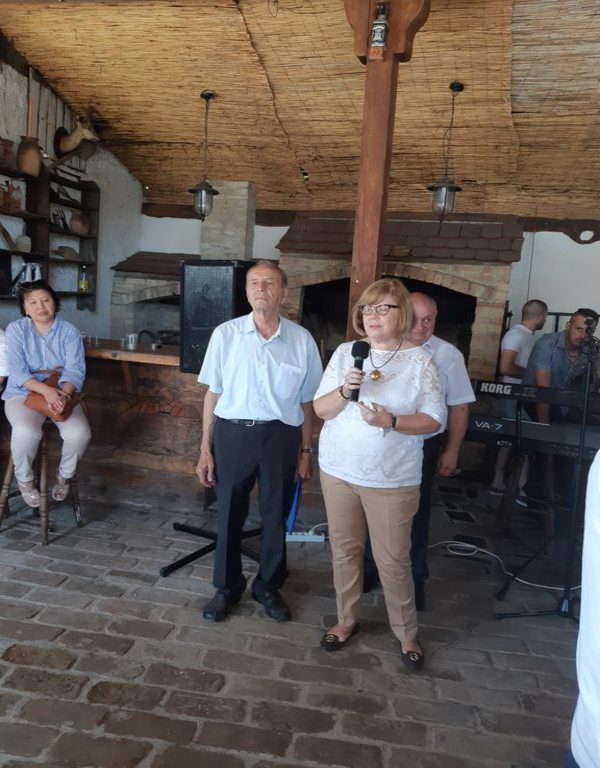
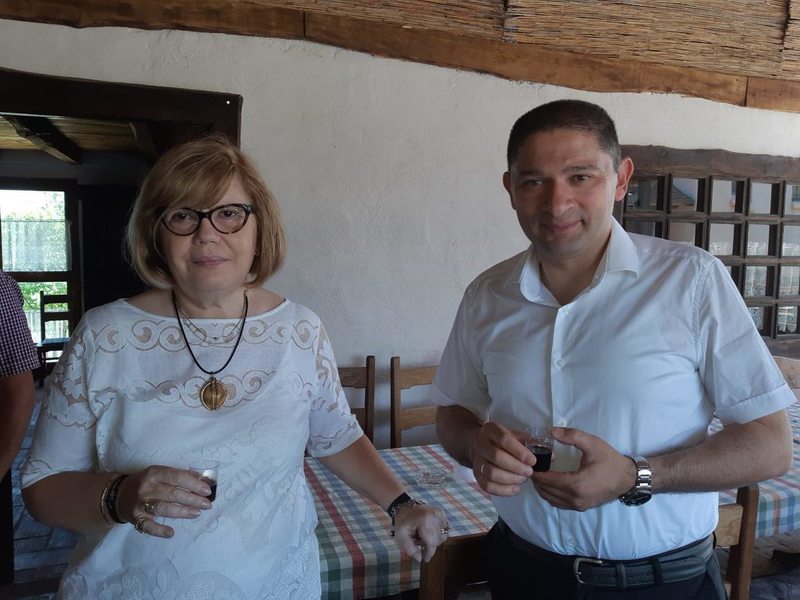 |
|
|
| Delivery of humanitarian aid for the Krka Monastery |
|
On 29th May 2019, as part of the Embassy’s Project initiated in 2018, Embassy delivered humanitarian aid for the Krka Monastery provided by the Office for refugees and migrations of the Republic of Serbia and Indjija County.
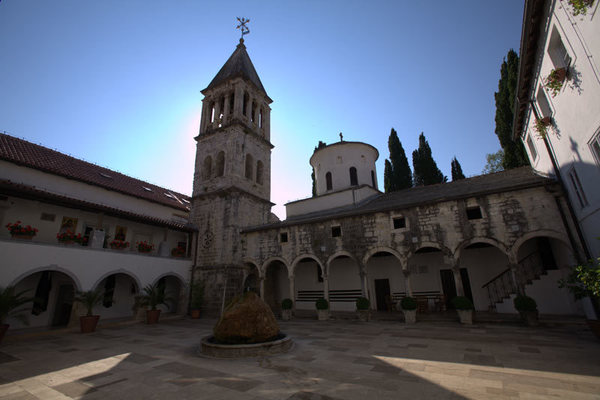 |
|
|
| Participation of the Embassy of the Republic of Serbia at the 64th Session of UNWTO Commission for Europe, 28. and 29. May 2019. in Zagreb |
|
Embassy, together with delegation of the Ministry on Trade, Tourism and Telecommunication, participated at the 64th Session of UNWTO Commission for Europe, 28. and 29. May 2019. in Zagreb. On abovementioned Meeting, Serbia was elected for the vice-chair of the Commission (shared seat with Poland) and for the Member of the Committee for Tourism and Sustainability.
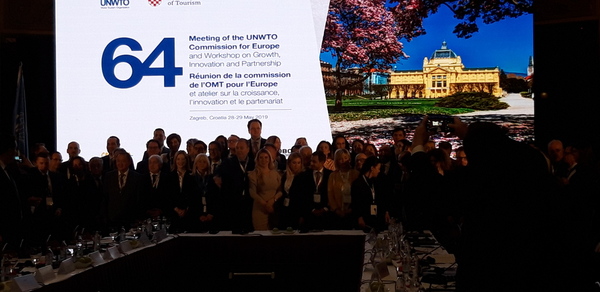 |
|
|
| Flowers laid at the Monument on Petrova Gora |
|
On 11th May 2019, Embassy of the Republic of Serbia laid flowers at the Monument on Petrova Gora on the occasion of 77 years of partisan fighters broke trough siege in Biljeg.
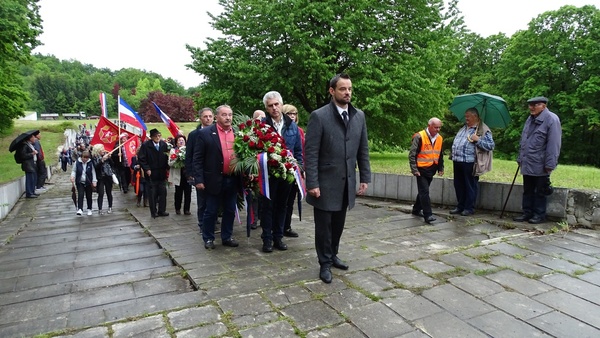
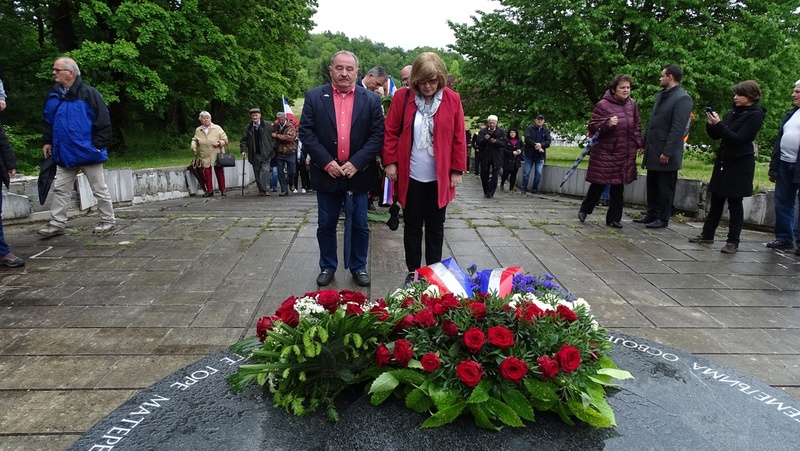 |
|
|
| Flowers laid at the Monument of falen soldiers of Red Army in Batina |
|
Representatives of the Embassy of the Republic of Serbia in Zagreb and Consulate General in Vukovar, on the occasion of the Victory Day in WWII, laid down flowers on the Monument of falen soldiers of Red Army in Batina.
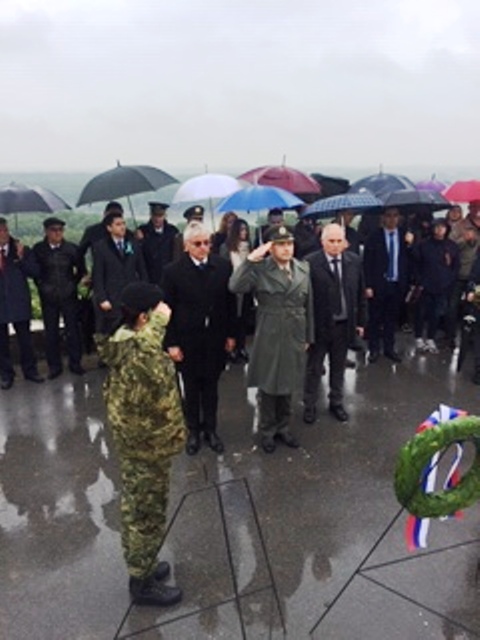 |
|
|
| 24th International Cartoon Exhibition in Zagreb |
|
The 24th International Cartoon Exhibition has been held from 8th to 19th May 2019 in Zagreb with main theme “Male-Female Relations”. Exibition rounded up more than 400 authors from 60 countries. In the award section, Ms. Miroslava Rakovic, an author from Novi Sad, received Second Award.
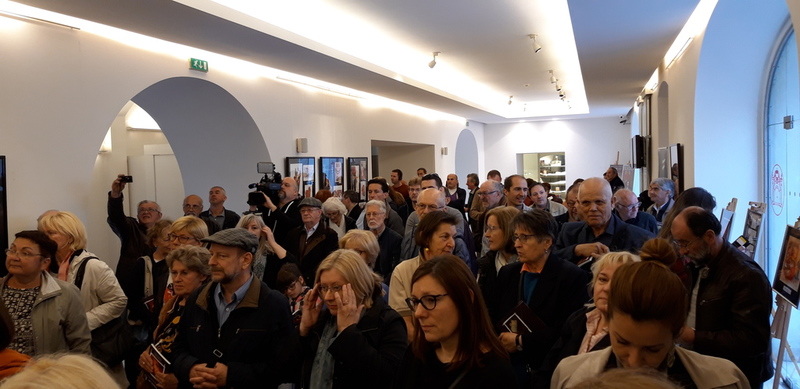 |
|
|
| Flowers laid at the Monument of National Heroes in Mirogoj Cemetery in Zagreb |
|
Representatives of the Embassy of the Republic of Serbia in Zagreb, on the occasion of the Victory Day in WWII, laid down flowers on the Monument of the National Heroes in Mirogoy Cemetry in Zagreb.
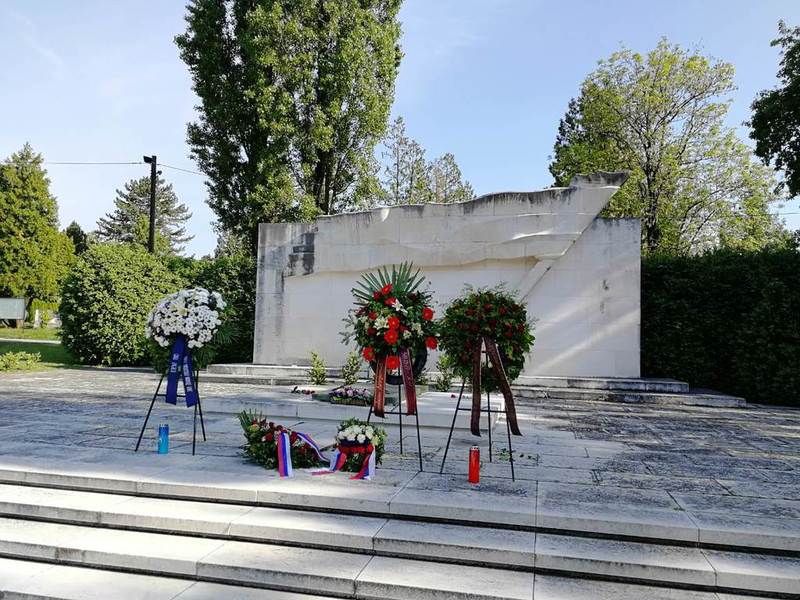 |
|
|
| Eight Summit of the Heads of Government “16+1” Initiative of the Central and Eastern European Countries and China |
|
Embassy, as a part of the official delegation of the Republic of Serbia led by Prime Minister of the Government of the Republic of Serbia H.E. Ms. Ana Brnabic, participated at the Eight Summit of the Heads of Government “16+1” Initiative of the Central and Eastern European Countries and China, held in Dubrovnik on 11th and 12th April 2019.
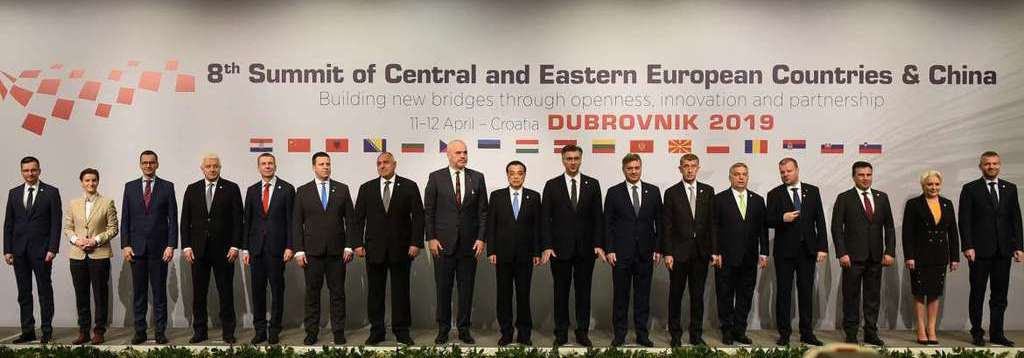 |
|
|
| "DAYS OF THE SERBIAN MOVIES - MOVIE THEATER IS OPEN AGAIN!" |
|
Days of the Serbian Movies Festival, third in a row, has been opened on 3rd April 2019. in “Tuskanac” Cinema in Zagreb. Festival will last until 7th April 2019 and will be dedicated to two magnificent Serbian artists – Milena Dravic and Dusan Makavejev.
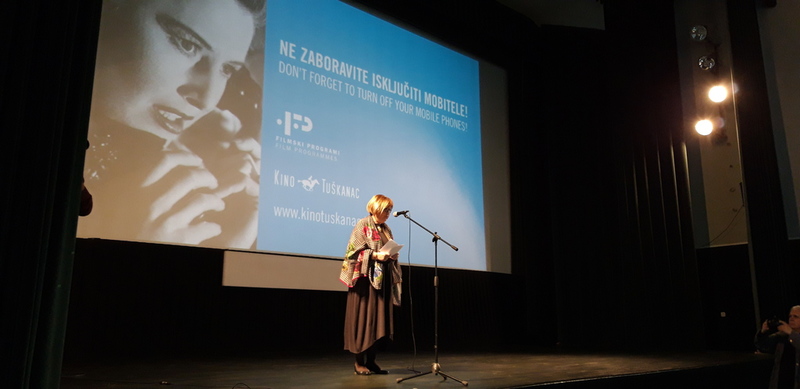
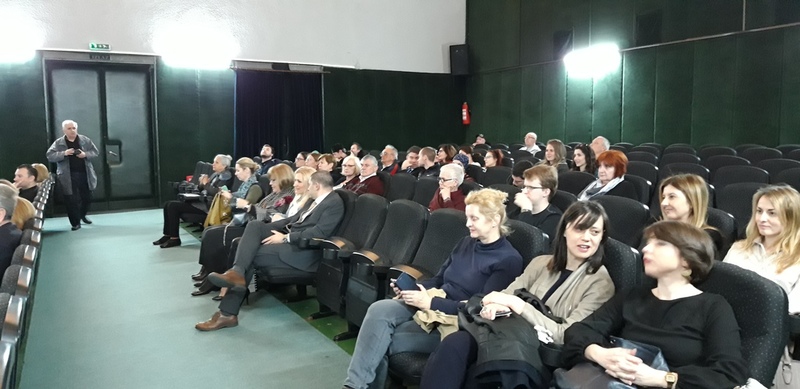 |
|
|
| Study visit to the County of Brodsko-Posavska |
|
Embassy participated at the Study visit to the County of Brodsko-Posavska, on 20th March 2019. Visit was organized by the Ministry of Foreign and European Affairs of the Republic of Croatia for the members of the Diplomatic Core in Croatia. The goal of the visit was to present economic, as well as tourist and cultural potentials of the County.
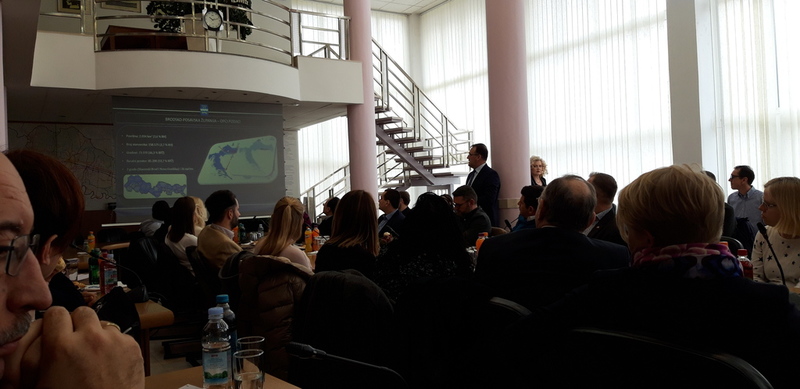
|
|
|
| International Tourism Fair “Place2Go” in Zagreb |
|
Ambassador of the Republic of Serbia in Croatia, H.E. Mira Nikolic, attended oppening of the International Tourism Fair in Zagreb on 15th March 2019, where she wisited exibitors from Serbia.
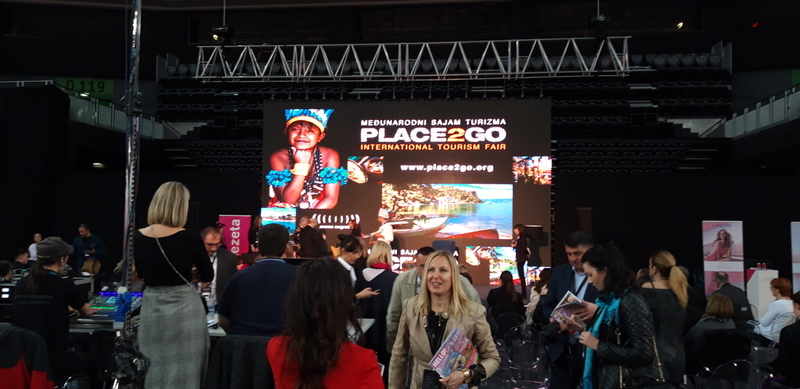 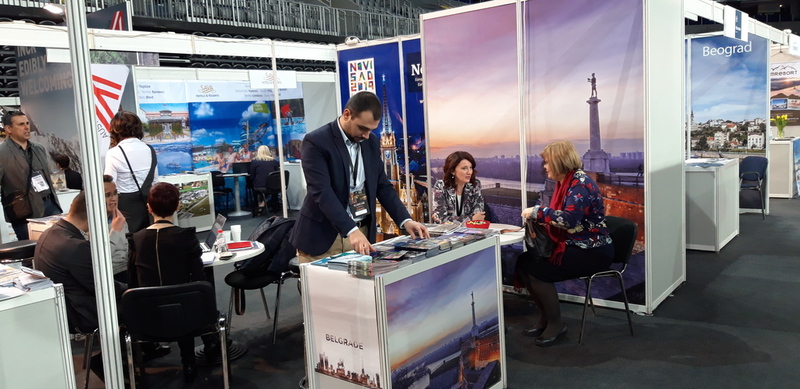 |
|
|
| Wisit to the Krka Monastery and muncipalities of Kistanja and Sinj |
|
Representatives of the Embassy of the Republic of Serbia wisited muncipalities of Kistanja and Sinj, as well as Krka Monastery, where they delivered humanitarian aid from Muncipality of Indjija (Serbia).
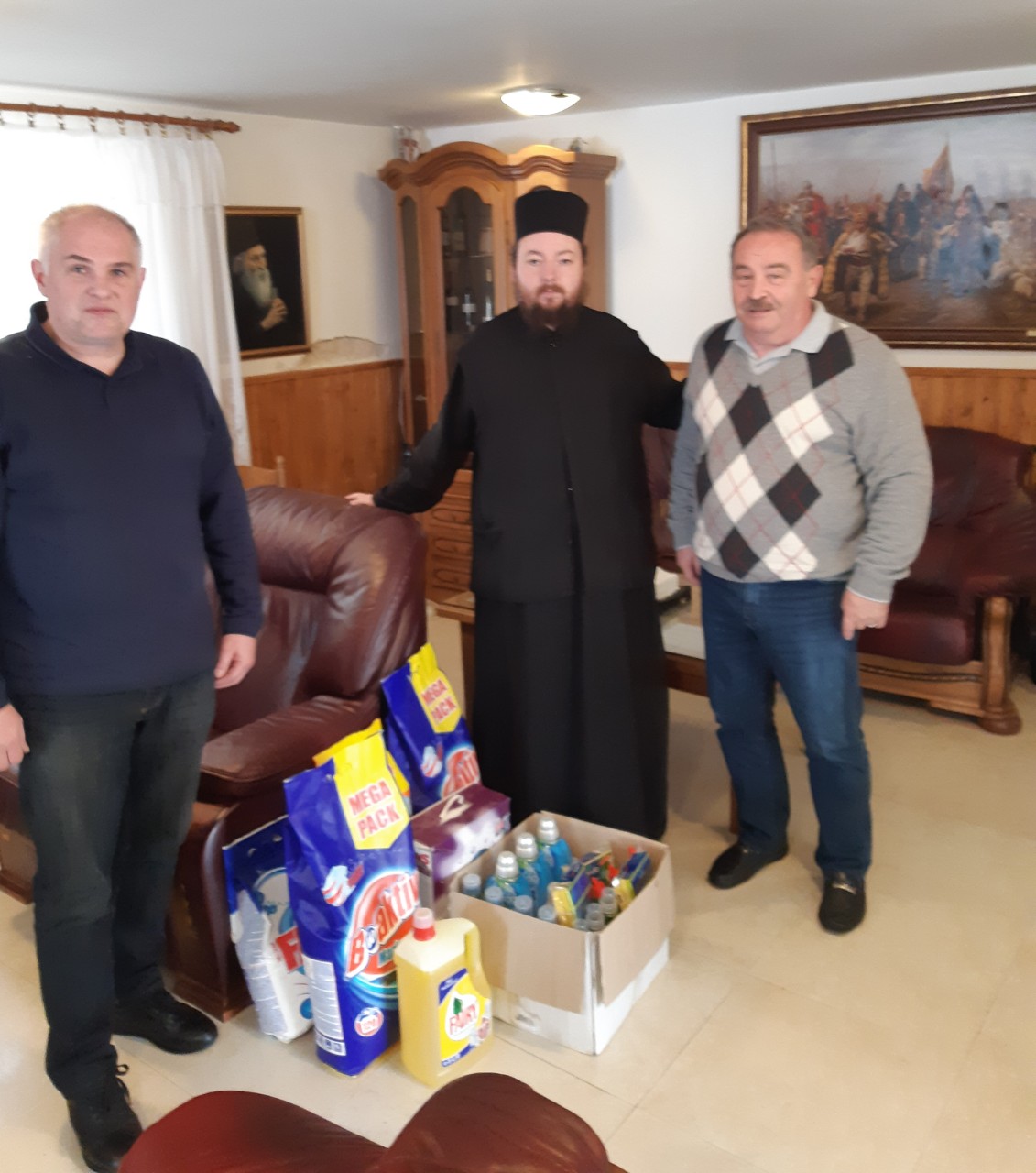 |
|
|
| Eight Meeting of the Intergovernmental Board for Minorities between Serbia and Croatia |
|
Eight Meeting of the Intergovernmental Board for Minorities between Serbia and Croatia was held in Zagreb (12th March) and Pakrac (13th March) 2019. Board took in consideration facilitation of recommendations for improvement of the status of Serbian minority in Coratia and Coratian minority in Serbia and adopted new recomandations that will further inmprove this issu.
At the conclusio of the Meeting, members of the Board visited Gathering Temple of Holy Trinity and “Vladicanske Dvori” as well as Churchs Archive, as quests of Episkop, Father Jovan.
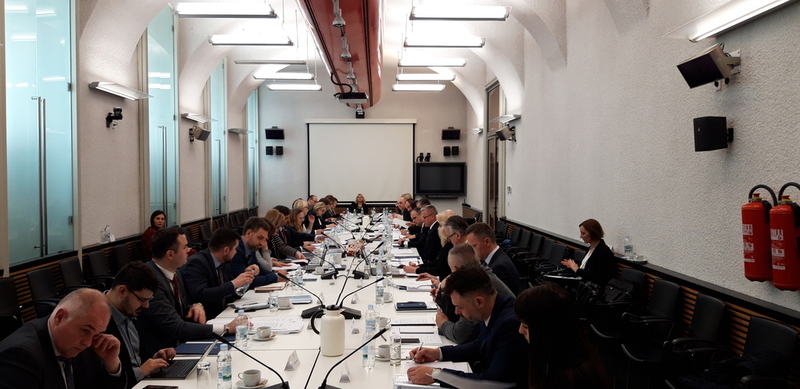 Board meeting in Zagreb Board meeting in Zagreb
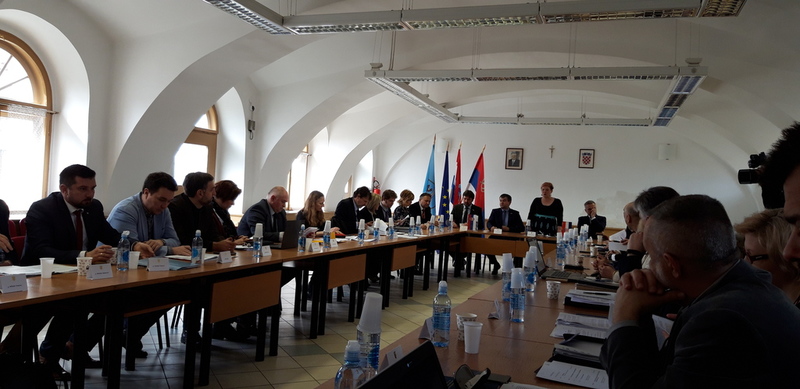 Board Meeting in Pakrac Board Meeting in Pakrac
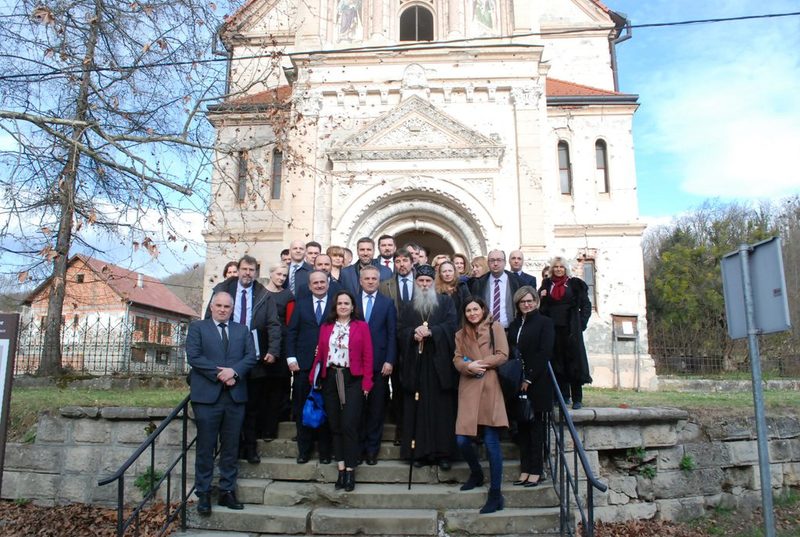 Board members in front of Gathering Temple of Holy Trinity in Pakrac Board members in front of Gathering Temple of Holy Trinity in Pakrac
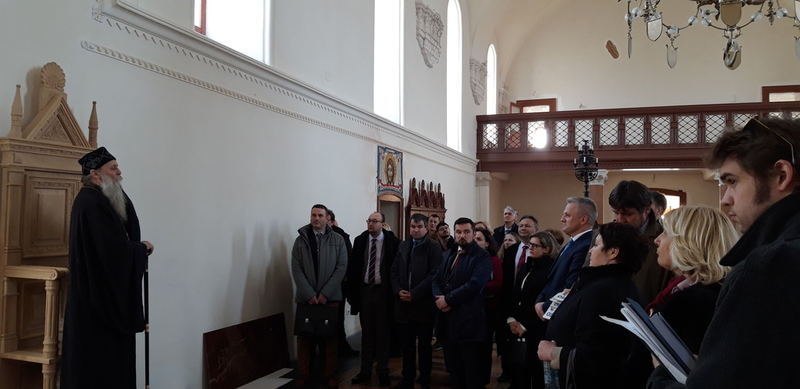 |
|
|
| 36th Rijeka Carnival |
|
Embassy attended Traditional Rijeka Carnival - A magnificent event as always.
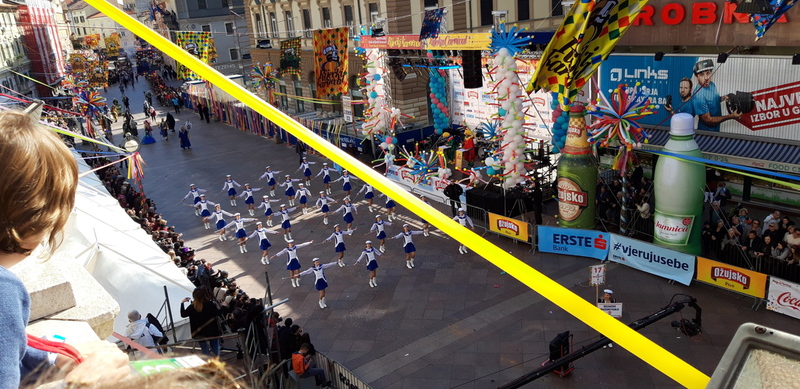 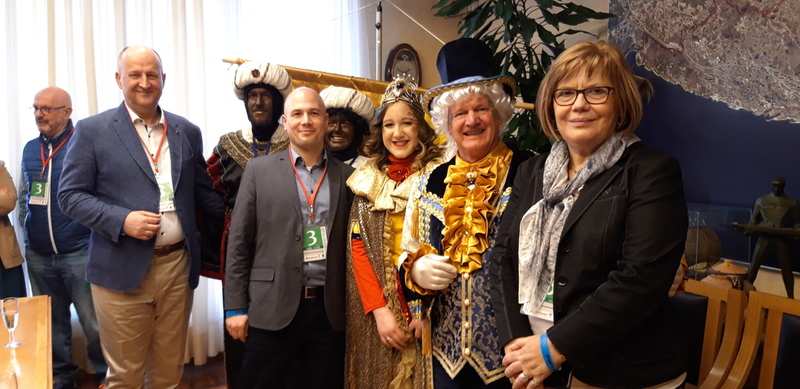 |
|
|
| Meeting of National Coordinators for China+16 Initiative |
|
Amb. Mira NIkolić participated at the Meeting of National coordinators of China+16 Initiative, held on 1. March 2019 in Zgreb. Meeting was organized bu Ministry of Foreigh and European Affairs of the Republic of Croatia as a preparation for the forthcomin China+16 Summith to be held on 11. and 12. April 2019 in Dubrovnik.
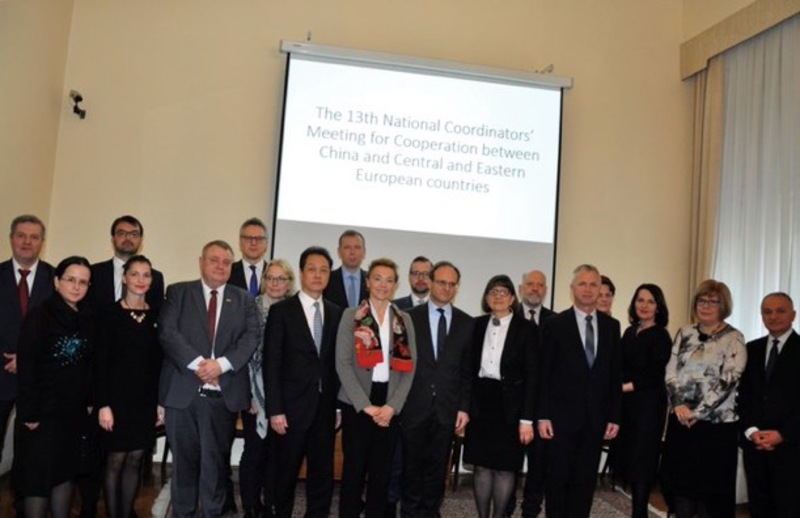
Author: Ministry of Foreign and European Affairs of the Republic of Croatia |
|
|
| Presentation of the 16th Belgrade Dance Festival |
|
On 25th February 2019, with support of Department for Culture of City of Zagreb, presentation of the 16th Belgrade Dance Festival (22. March to 12th April 2019) was held at Zagreb Dance Centre. Presentation was attended by members of art community, diplomatic core, serbian community and Zagreb City officials.
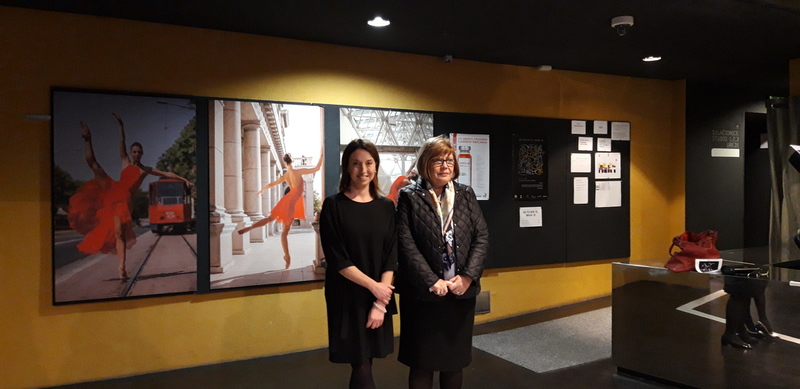 .jpg) .jpg) |
|
|
| Visit to the Gomirje Monastery |
|
Ambassador of the Republic of Serbia, H.E. Ms. Mira Nikolic, with members of the Embassy, on 23 February 2019 visited Gomirje Monastery.
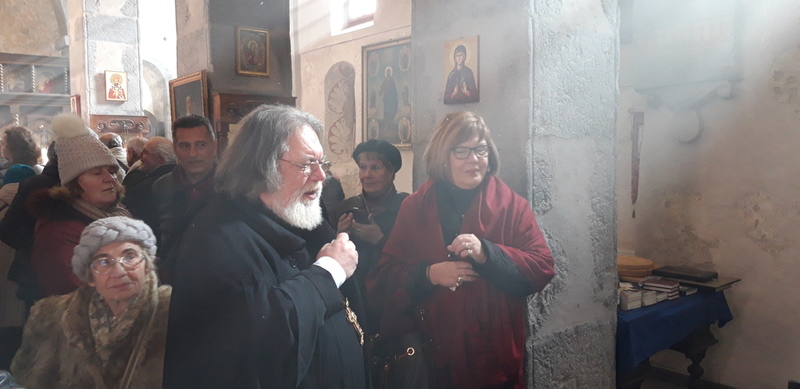 |
|
|
| Visit of the Director of RACVIAC, Major General Jeronim Bazo |
|
Major General Jeronim Bazo, Director of RACVIAC visited Embassy of the Republic of Serbia on 18th February 2019, and had a meeting with H.E. Ms. Mira NIkolic, Ambassador of Serbia in Croatia and Defence Attache LtCol Dejan Đorđević.
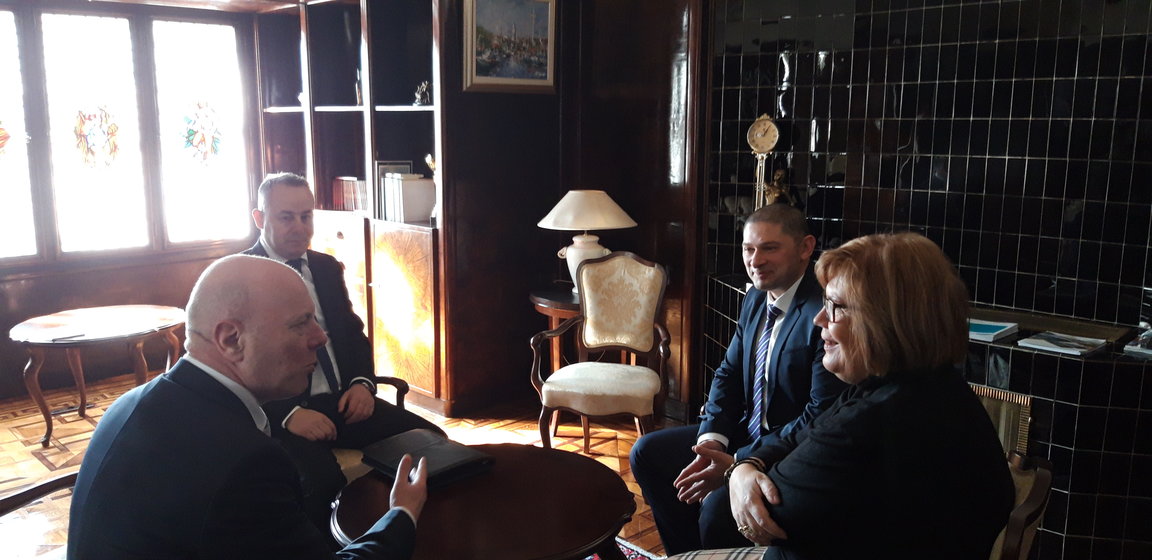
|
|
|
| Visit to Kistanje County |
|
Amb. H.E.Mira Nikolić, together with delegation of Indjija County (Serbia), visited Kistanje County on 15th February 2019. On that occasion, President of Indjija County, Vladimir Gak and Amb. Nikolic, handed over tablet computers to the best students of the “Kistanje” Elementary School, as a donation of Indjija County.
Delegation meet with the representatives of Kistanje County which held presentation of the ongoing county projects.
Delegation also visited “Krka” Monastery and had a meeting with Iguman of the Monastery, Pather Sebastian.
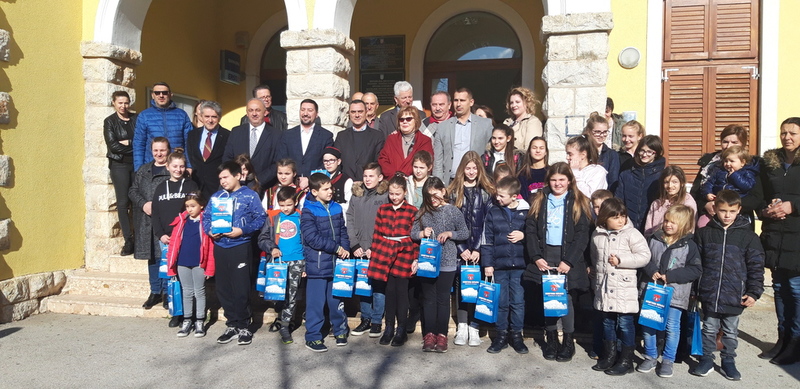 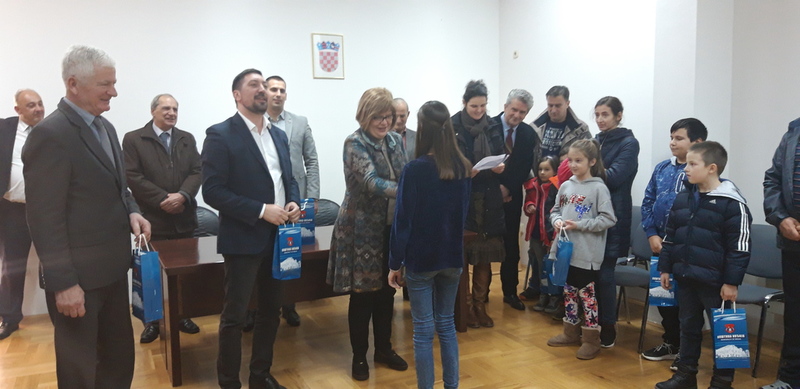 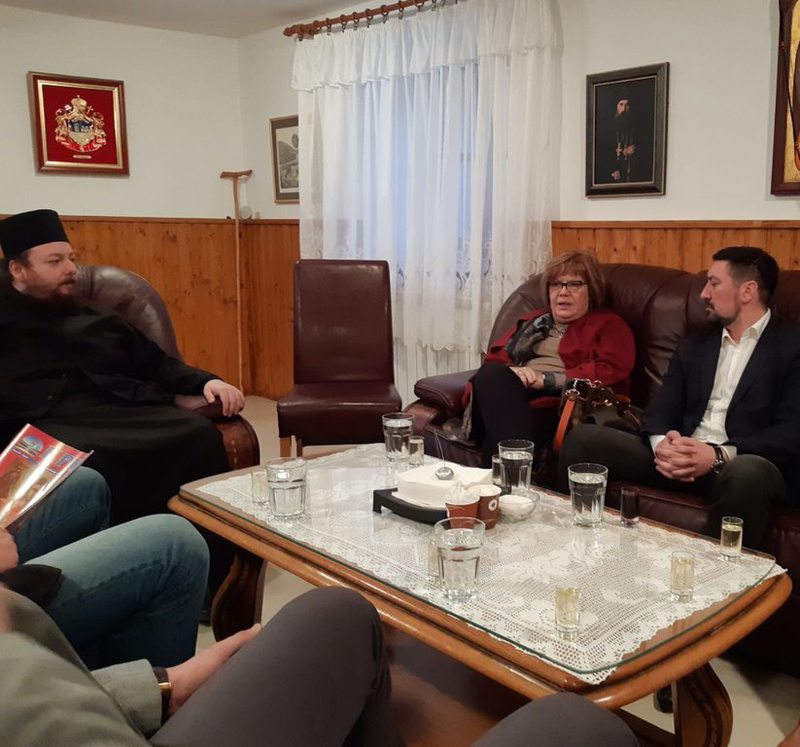 |
|
|
| Celebration of the National Day and Day of the Armed Forces of the Republic of Serbia |
|
At the “Mimara” Museum, on 14th February 2018, Embassy of Serbia in Zagreb, joined by numerous gests, marked National Day and Day of the Armed Forces of the Republic of Serbia.
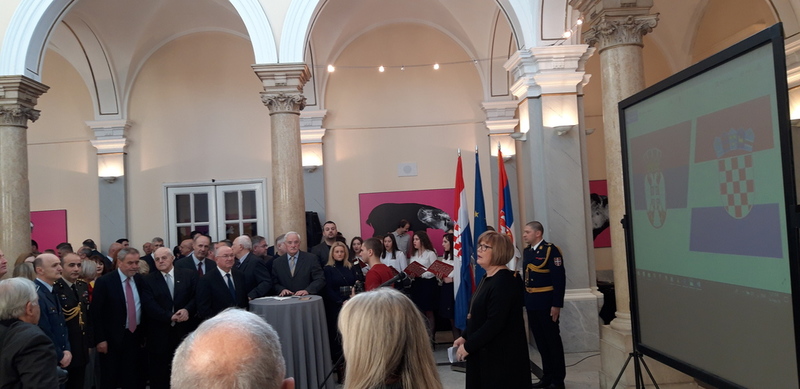 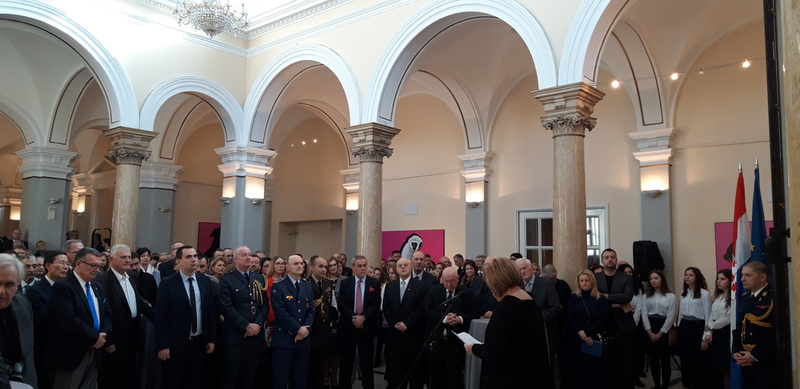 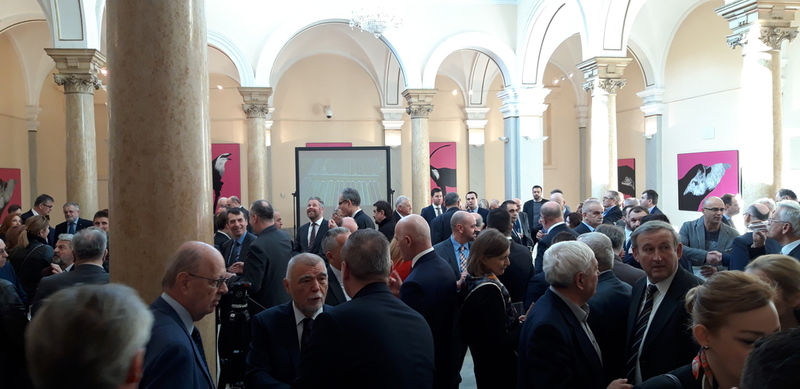 |
|
|
| Celebration of Sveti Sava at the Serbian Orthodox High school "Kantakuzina Katarina Brankovic" |
|
H.E. Ambassador Mira Nikolić attended celebration of Sveti Sava on 13th January 2019, which was followed by liturgy in the School Chapel and school play, celebrated first Serbian Archbishop and Saint. On the occasion, Amb. Nikolic handed over reward to the best student – a tablet computer and held a short speech.
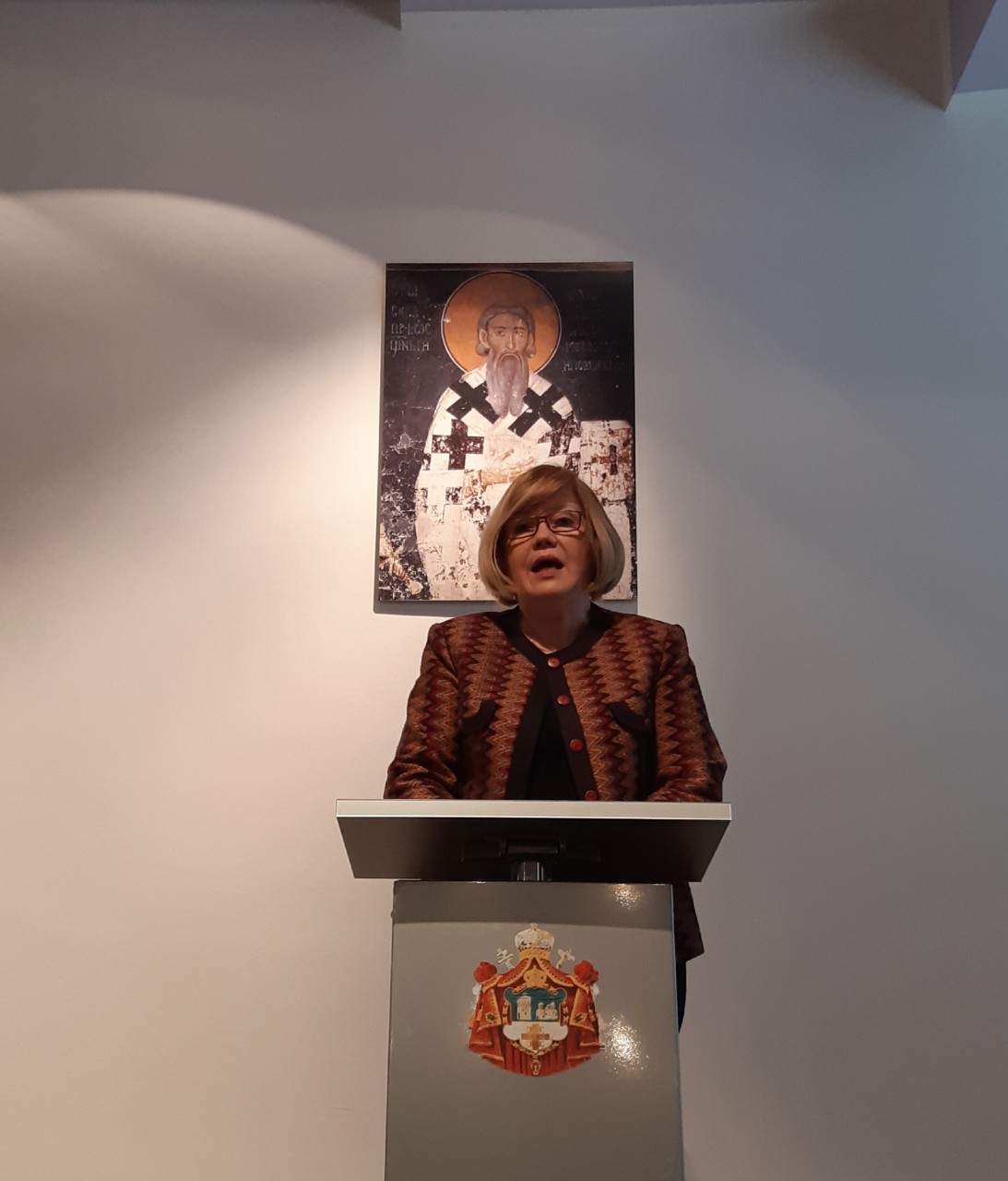 |
|
|
| STATEMENT OF THE DEPUTY PRIME MINISTER AND MINISTER OF FOREIGN AFFAIRS IVICA DACIC AT THE ANNUAL MEETING OF THE CEI MINISTERS OF FOREIGN AFFAIRS |
|
Madame Chairperson,
Mr. Secretary-general,
Dear colleagues,
Ladies and Gentlemen,
Allow me at the outset to thank Deputy Prime Minister and Foreign Minister Mrs. Pejcinovic-Buric and Secretary General of the Central European Initiative Ambassador di Vietri for hospitality and excellent organization of the Annual meeting of the Ministers of Foreign Affairs of Central European Initiative.
I am pleased to have the opportunity today to participate in the exchange of views on connectivity within a wider European region, experience and challenges posed by the European integration including our joint efforts to maintain the region's stability.
I dare say that over the entire past decade, the Republic of Serbia has not differentiated the priority goals in connection with domestic reforms, European integration and regional cooperation.
EU enlargement policy, we are convinced, represents one of the Union's major instruments not only in terms of stabilization of the region and in terms of the achievement of economic prosperity, but also achieving the stability and security in the EU as a whole, which has been I hope unambiguously reaffirmed at the recently held summit in Sofia, by virtue of the fact that full EU membership is the only strategic option for the Western Balkan partners. Over the past years, Serbia has proven to be an equal and reliable partner to EU and we are happy that it has been recognized in view of its substantial political commitment invested.
Despite evident challenges currently faced by EU politically and economically, we are convinced that a clear perspective of EU membership has been and still is a major driving force for number of reforms and positive development in the region. The Republic of Serbia is committed to the accession process and so far it has opened 12 negotiating chapters. We strive to open as many chapters that we are ready for as possible so that the entire state administration could focus on key and overarching goal - full EU membership.
To us, as well as to others in the Western Balkans it is of utmost importance that the integration process, which primarily implies a process of long and difficult reforms, continues without obstacles, expecting that unequivocal support and understanding by all EU members will follow. Individual progress of each of us on the road to EU integration has a positive effect on others in the region.
Ladies and Gentlemen,
By striving for stability in the region we are effectively contributing to sustainability and progress of our economies.
Serbia achieved significant positive results last year. With a projected growth of more than 4 per cent, my country achieved a third successive surplus while public debt was reduced to less than 58 per cent which is, let me recall, a condition set out in the Maastricht Treaty. Unemployment rate fell from almost 26 to 13 per cent while unemployment among the young was reduced from 51 to 33 per cent. We all face the brain drain in the region, but with an estimated economic growth for the coming period and planned foreign investments, we can be confident that new employment opportunities, especially for the young, will rise.
On the other hand, it is not possible to discuss sustainable stability without recognizing common interests and full support to regional cooperation, which is, like I have already said, one of our equally important foreign policy pillars. In making its contribution to strengthening of regional cooperation, the Republic of Serbia has paid special attention to activities within the so-called Berlin Process. Serbia supports the implementation of regional projects harmonized jointly at the last year's Western Balkans summit in Trieste, especially those related to infrastructure projects, youth investment, as well as harmonization of potential new joint projects in other areas that would improve the quality of life in the region even before formal EU membership. Moreover, we have undertaken serious preparation for the forthcoming London summit, which will, in addition to well-established issues, also raise the issue of security and better regional connectivity in that sense.
Speaking of stability, we cannot ignore some developments and processes at broader international level that bring about new challenges to wider region but also affect each of our citizens. Abandoning multilateralism, UK Brexit, the rise of right-wing group and populism and overall radicalization of the political scene, terrorism persisting despite the defeat of the so-called "Islamic State" and migration are just some of the warnings reminding us of the need that Europe and European Union should grow stronger and unite in order to achieve common interests in the continent and beyond. When it comes to migration, we have to be aware of the crisis which is recurring, of course, not with the same intensity, but with new flows, routes and challenges. Even if it doesn't affect Serbia directly again, we are ready to continue our constructive cooperation and work together with all of you on solving this common problem.
Ladies and Gentlemen,
Let me repeat – CEI represents a "bridge" between the EU members and those countries perceiving EU membership as their goal. The membership of this regional initiative which is a framework for confidence-building and faster EU integration, is of great importance to Serbia in view of current EU accession negotiations.
As one of the oldest regional initiatives on the European continent, bringing together 18 States, CEI is a regional initiative that by its experience and respect may add a significant additional value to the connectivity process among European macro-regions. In that sense, I note with pleasure the importance of efforts invested to this end.
Regardless of other formats and organizations, CEI has managed to remain relevant. Serbia and its institutions, at the local level, its universities and NGO sector fully recognized the capacity of the funds and calls for cooperation coming from CEI. The confirmation of Serbia's huge interest is best illustrated by the fact that at the recently closed CEI call for program of cooperation activities, Serbia submitted the biggest number of project proposals (21).
Dear friends,
Allow me to express my regret over Austria's decision. We surely respect the reasons and do not seek to dwell upon why the Government in Vienna decided so. Still, I would like to point to Austria's huge contribution to the Initiative and furthermore to its profound understanding and genuine support which, along with Italy, it has always offered to my region. I hope that once the conditions allow there will be will and interest to reconsider the decision.
Ladies and Gentlemen,
In the end, I would like to commend the efforts of the Republic of Croatia, currently holding CEI Presidency, and wish our host a lot of success in chairing this regional initiative in the period ahead. |
|
|
| Book of Condolances |
|
The Embassy of the Republic of Serbia has the sad duty to inform that the officials of the Embassy of the Republic of Serbia at Tripoli who were kidnapped on November 2015 in Lybia, Mrs Sladjana Stanković and Mr Jovica Stepić, were tragically killed on 19th February 2016 during the American airstrike on a terrorist base in the city of Sabrata in Lybia.
The book of condolences will be opened at the Embassy of the Republic of Serbia, Zagreb, Pantovčak 245, on Monday, 22nd Ferbuary 2016 and Tuesday, 23rd February 2016 from 12,00 to 15,00 hrs. |
|
|
|
|
|